Principal's Message
Principal’s Message
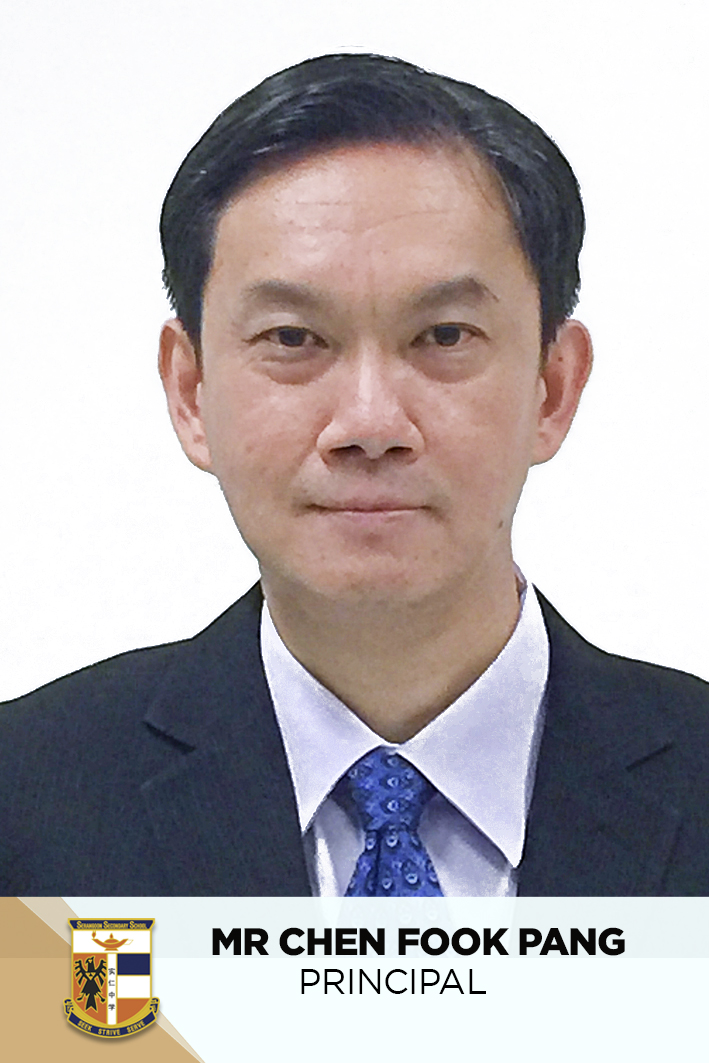
SPEECH BY MR CHEN FOOK PANG, PRINCIPAL, SERANGOON SECONDARY SCHOOL, AT THE 97TH PRIZE PRESENTATION DAY AT SERANGOON SECONDARY SCHOOL ON FRIDAY 25TH APRIL 2025, 9.00 AM
Mr. Andy Ng, Guest of Honour, Member, School Advisory Committee
School Divisions, S1, Superintendent, Mr Ling Khoon Chow
Fellow Members, School Advisory Committee
Distinguished partners, parents and guests of the school
Teachers, staff members and students
Ladies and gentlemen
A. Introduction and Welcome

1 - Welcome to our 97th Prize Presentation Day. We are privileged to have Mr. Andy Ng with us as our Guest-of-Honour on this momentous occasion. As we gather here this morning, we mark nearly a century of educational excellence and also celebrate the remarkable achievements of our school community.

2 - Looking across this assembly today fills me with immense pride. We are here not simply to hand out awards, but to acknowledge a year of growth, resilience, and success. This ceremony represents both a milestone in our school’s rich history and a stepping stone towards our future aspirations. This is also a wonderful occasion where we celebrate the outstanding achievements of our students – a testament to their hard work, perseverance, and the pursuit of excellence. Today is not just about acknowledging individual successes, but also about recognizing the supportive environment and the strategic direction that empowers every student to reach their fullest potential.

3 - Serangoon Secondary School stands tall with a proud and illustrious heritage, having nurtured generations of leaders who have shaped our nation’s destiny—including Mr Edmund William Barker, former Cabinet Minister; Mr Tee Tua Bah, former Commissioner of Police;

Dr Wong Poh Poh, internationally renowned climate change scholar and IPCC contributor; and Mr Ngiam Tong Dow, one of Singapore’s most respected Permanent Secretaries.

Our alumni, found across the heartlands, exemplify the values of integrity, resilience, and compassion—true Serangoon sons and daughters who are not only leaders in their fields but also pillars of their families and communities. We pay tribute to the steadfast members of the Serangoon Alumni, whose continued support keeps our school’s legacy vibrant and strong.

At the heart of this legacy are our dedicated teachers, who shape minds, build character, and guide every student with care and conviction. To all our educators and staff—your tireless devotion lights the path forward for each Serangoon StaR, and we salute you with pride and heartfelt gratitude.
**B. P’s Directional Setting of 54321 **

4 - Last year, I shared about our school’s 5-4-3-2-1 framework, guiding us in our mission to equip, empower, and embolden every StaR to reach their fullest potential.

5 - To drive this mission effectively, we have organised our curriculum carefully and thoughtfully. Our academic subjects are grouped into Curriculum Group 1 (Languages and Humanities) and Curriculum Group 2 (STEM subjects), overseen by experienced academic leaders. Equally important is Curriculum Group 3, dedicated to holistic Student Development Teams, encompassing PE, Co-Curricular Activities, and CCE. This structure ensures a balanced focus on both intellectual growth and character development, embodying our commitment to a truly ‘Total Curriculum’ that is future ready.

6 - Furthermore, we build this structure up with clear focus and coherence through** Level Themes** that guide our students’ experience year by year. Academically, students progress from ‘Transition’ in Secondary 1, through ‘Discovery’ and ‘Building Up’, culminating in becoming ‘Future Ready Learners’ in Secondary 4/5. In parallel, their developmental journey moves from ‘Understanding & Leading Self’ to ‘Understanding Others & Working Together’, ‘Impacting & Inspiring Others’, and finally ‘Striving for Excellence & Looking Ahead’. This intentional sequencing ensures progressive development across all facets of our students’ education.

7 - We have embarked on a curriculum strategic planning review over the last two years to enhance the holistic learning experience for our Serangoon StaRs. Central to this effort is our comprehensive Four-Year Learning Road Maps, spanning from Secondary 1 through to Secondary 4 and 5 customised across G1, G2 and G3 profiles to cater to the needs of different learners. These roadmaps, carefully aligned with the MOE’s Work Plan Seminars and Curriculum Outcomes. It provides a clear, progressive, and holistic structure for our educational programmes. It integrates not just the academic subjects, but also vital Student Development areas like Character and Citizenship Education (CCE), the Year Head Curriculum, and Values-in-Action (VIA), alongside key programmes such as our Applied Learning and Learning for Life Programmes. This ensures we are systematically building essential knowledge, skills, and values, including the crucial 21st Century Competencies and proficiency in Educational Technology, which I will focus on later.
8 - Today, I am happy to share how we are intensifying efforts for our staff to continue building our StaRs in both student development area and instructional programmes.
C. Enhancing the Culture of Care with Class Ecosystem

9 - In growing our StaRs holistically, the Four-Year Learning Roadmap provides a structured and progressive framework that guides students’ personal growth and character development throughout their secondary school journey.
Section C1: StaRs Programme

In alignment to the level themes, the StaRs Programme is a series of three engaging programmes that take place throughout the year, designed to enrich our students’ educational experience. The StaRs programme contributes significantly in our efforts to develop future-ready students who possess the essential competencies outlined in the MOE’s 21st Century Competencies framework.

Allow me to illustrate with some examples. Our StaRs Programme 1 pushes boundaries through experiential learning.

When our Secondary 1 and 3 students participate in outdoor adventure camps, they aren’t just engaging in physical activities – they are developing resilience, teamwork, and leadership skills.

I’m particularly proud of our Secondary 2 students’ involvement in the Applied Learning Module. By tackling real-world problems, they’re developing critical thinking skills and learning to apply their knowledge in practical situations. This is exactly what the E21CC framework emphasises – the ability to connect classroom learning with real-world applications.

Our Secondary 4 and 5 students’ visits to Institutes of Higher Learning provide them with valuable insights into future pathways, helping them make informed decisions about their careers and further education. Through these programmes, we are nurturing confident and self-directed learners who are ready to thrive in an ever-changing world.
Section C2: Overseas Learning Journeys

11 - Our overseas learning journeys are also pivotal in enriching our Serangoon StaRs’ educational experience and contribute significantly to developing their 21st-century competencies. Following the pandemic, alongside myself, my Vice-Principals and various Key Personnel have strategically planned for these internationalisaion trips with purpose and intentionality, to ensure meaningful learning opportunities for our students. After successful recce trips to Brunei and Vietnam in 2023, the fruits of the groundwork blossomed in 2024 when we successfully conducted two transformative trips.

In June 2024, around thirty of our students embarked on a journey to Brunei, while another group visited Vietnam in November. These experiences challenge our students to step out of their comfort zones, adapt to new environments, and develop the cultural sensitivity that forms a vital part of the E21CC framework.

The friendships formed, the perspectives gained, and the self-discovery that occurs during these journeys contribute significantly to building confident, culturally aware individuals who can thrive in global settings. The learning does not end with the trip.

Our students return not just with enhanced global awareness, but with strengthened leadership capabilities, improved communication skills, and a deeper sense of responsibility to contribute to their school community. Through post-trip sharing sessions at our school assembly, the students shared their learning insights and inspired their juniors to broaden their perspectives as well.

This year, I am pleased to share that we are expanding our horizons further by including Xiamen, China in addition to Brunei and Ho Chi Minh, Vietnam, to our overseas learning journeys.
Section C3: One Class, One Kampong, One Serangoon

12 - To deepen our culture of care in the Serangoon family, we have embarked on an initiative since 2024 - ‘One Class, One Kampong, One Serangoon’. Every student matters. This approach is both inclusive and targeted - we focus on uplifting our students through enhanced class experiences while ensuring dedicated and more customized support for those who may require them.
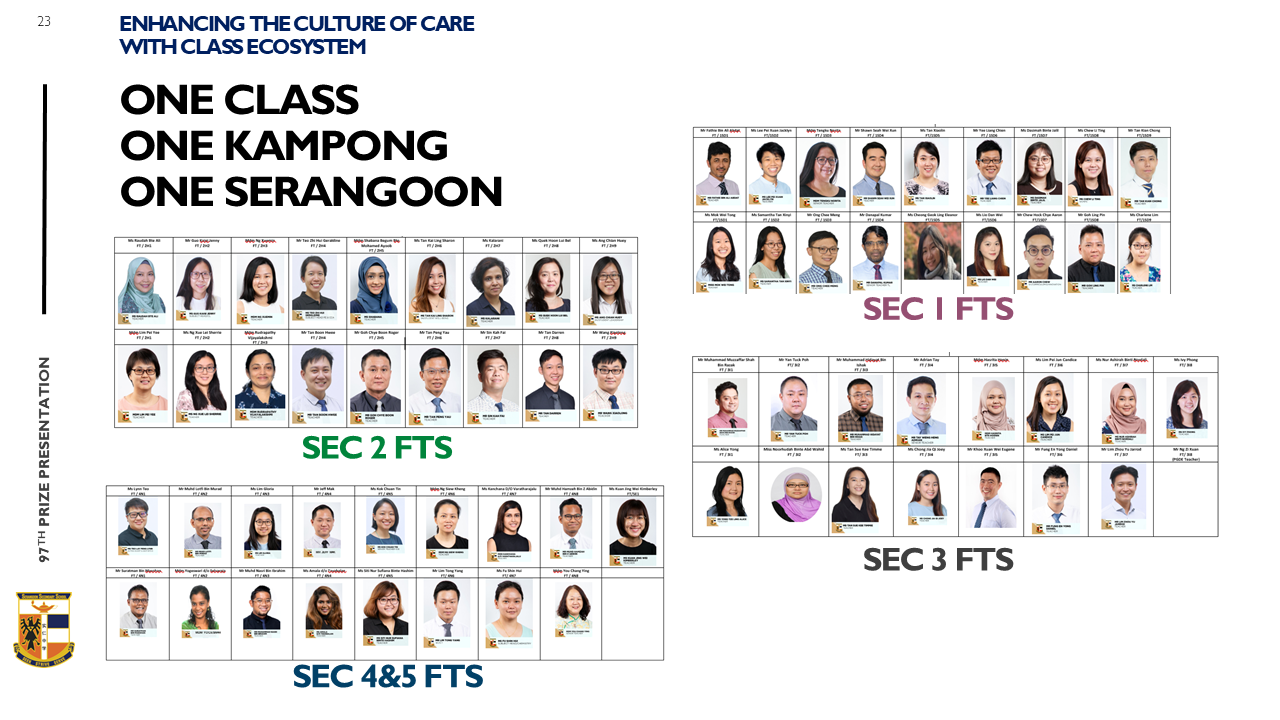
13 - The Student Development Team has worked tirelessly to enhance this support network via a more cohesive support system for our students. I am particularly proud of how our Form Teachers have embraced this initiative. They now have access to a specially designed FT toolbox, equipped with valuable resources including data analytics dashboard, SEL check-in surveys, and social network analysis. This data-driven approach helps our teachers understand their students better and provide more timely and targeted support.

14 - While data gives valuable insights, it’s how we leverage this information that truly transforms our class ecosystem. Our teachers engage in purposeful collaboration, triangulating various data points to build comprehensive student profiles. This data-informed, team-based approach ensures that every decision we make, from classroom seating arrangements, student leadership opportunities or the adjustment in strategies or interventional plan can all contribute meaningfully to building a positive class culture where every student can thrive.

15 - In our Staff Contact Time sessions, teachers regularly exchange innovative strategies for building positive classroom cultures. These sharing sessions have become a vibrant platform for professional growth and community building.
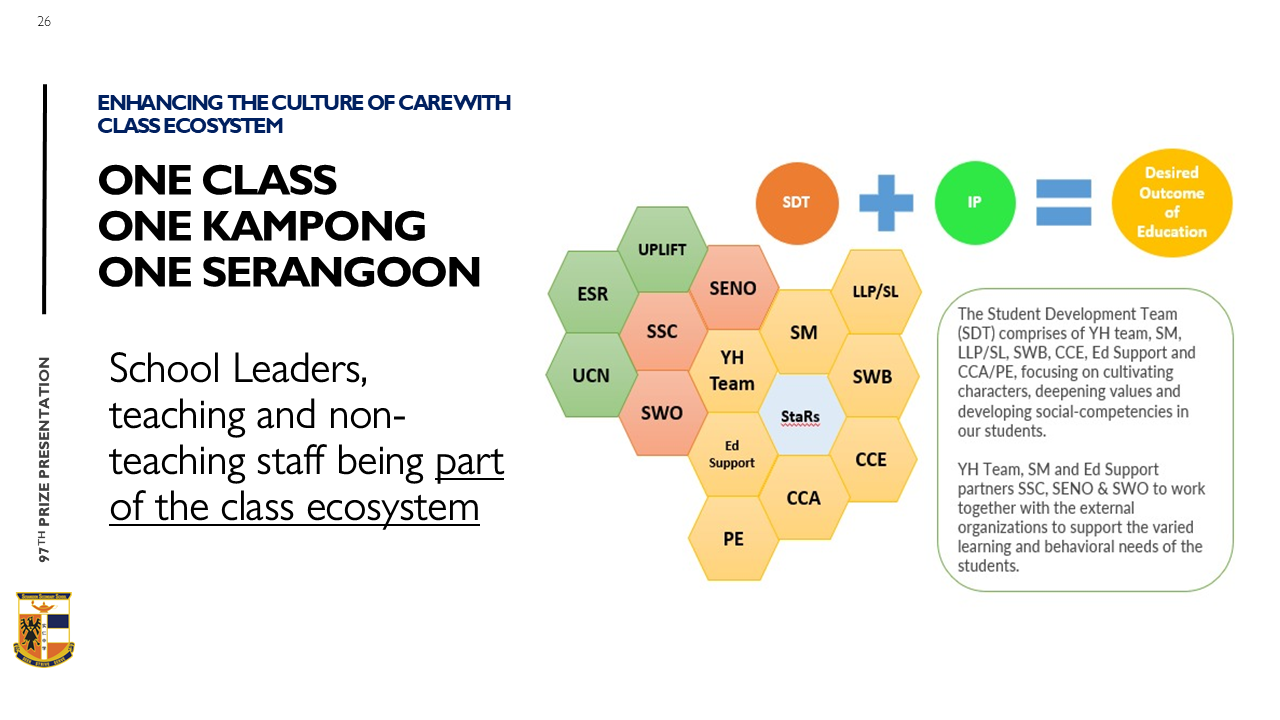
16 - Besides the Key Personnel and teachers, non-teaching staff and School Leaders are also part of the class ecosystem. In fact, our Vice Principals play a pivotal role in nurturing a vibrant class ecosystem and fostering a deep culture of care through our differentiated approach to student management.
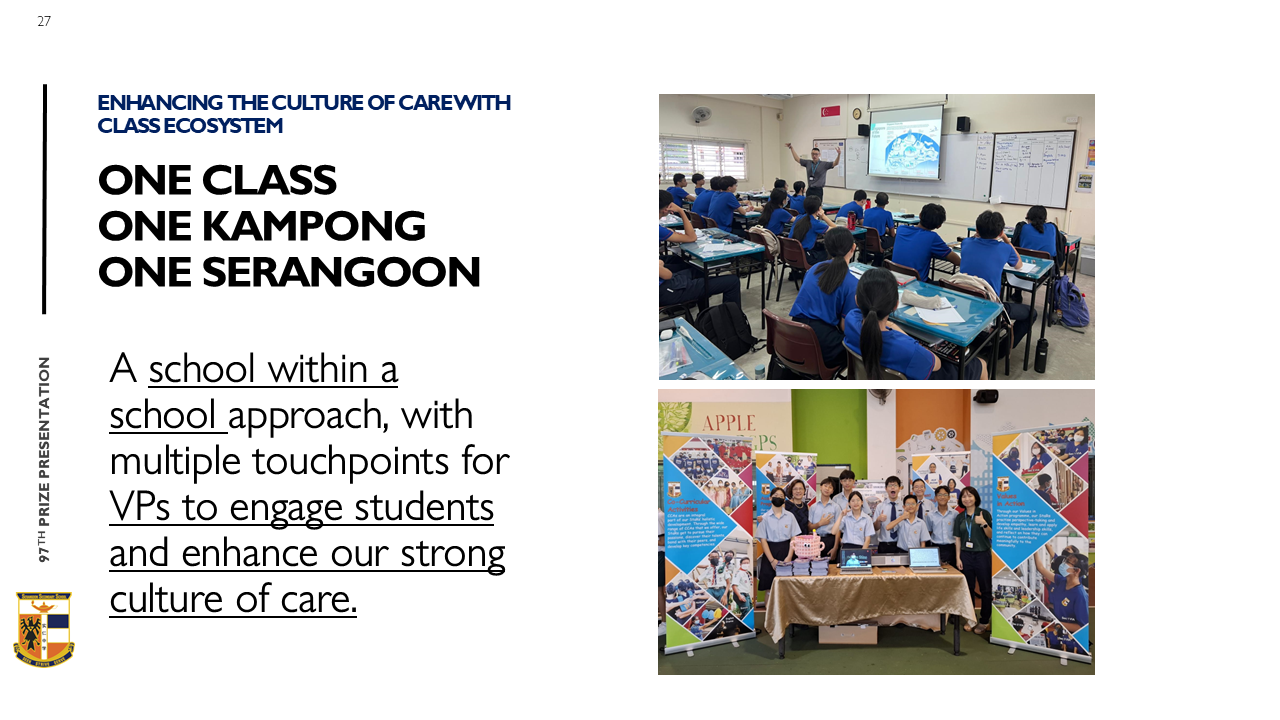
We take on a school within a school approach, with VP Mrs Wong overseeing the lower secondary levels while Mr Marc helms the upper secondary levels. Through structured engagement sessions with all classes, the VPs have touchpoints with students to engage them on their level goals and cohort programmes. The VPs are also engaged in dialogues with Form Teachers, to better understand the class dynamics and individual student needs, enabling us to craft responsive support structures. Both Mrs Wong and Mr Marc have journeyed alongside our teachers and even worked directly with students who need additional guidance. This hands-on approach has strengthened relationships across the school community and created multiple touchpoints for student support, contributing to a more nurturing class ecosystem.
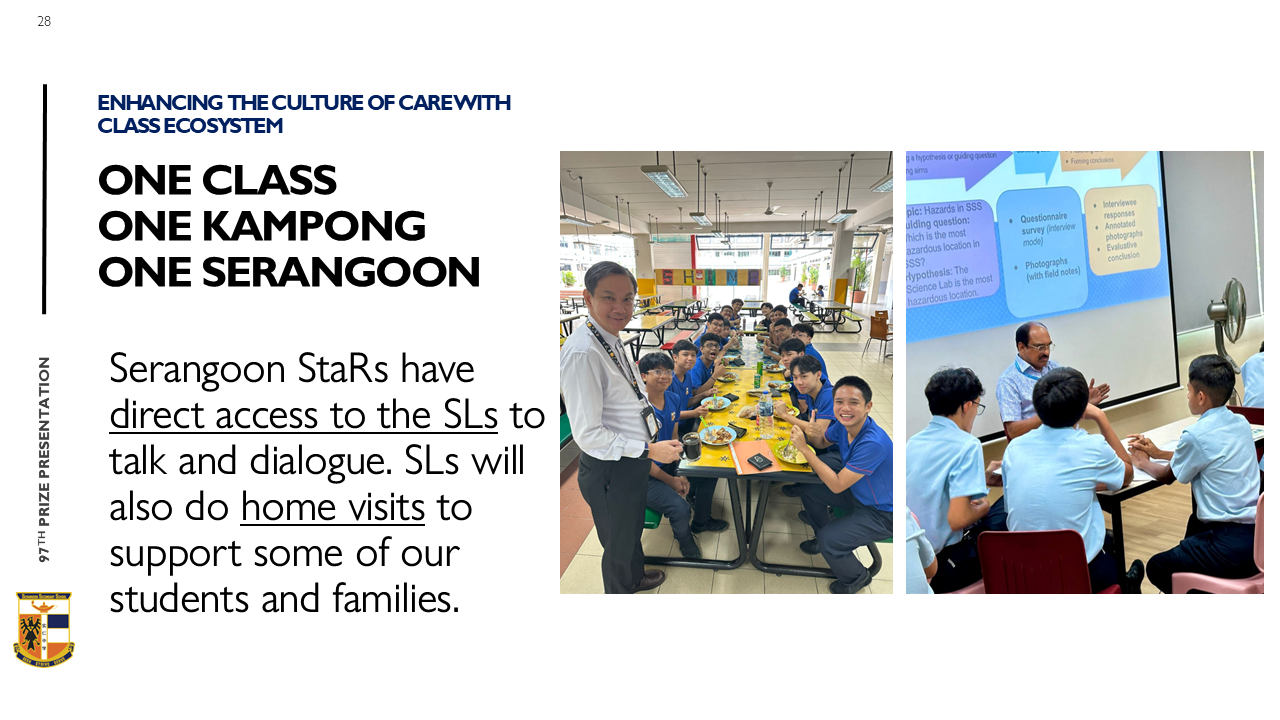
The Serangoon StaRs have direct access to the SLs to talk, dialogue, chit chat on anything and the distance between them and SL is zero. I have put in place a very flat structure. And SLs will do home visit to support our High Needs Students and families.
17 - The ‘One Class, One Kampong, One Serangoon’ initiative embodies our belief that a strong culture of care is the foundation of effective learning. When our students feel supported and under stood, they are then better positioned to excel. D. Curriculum and Instruction
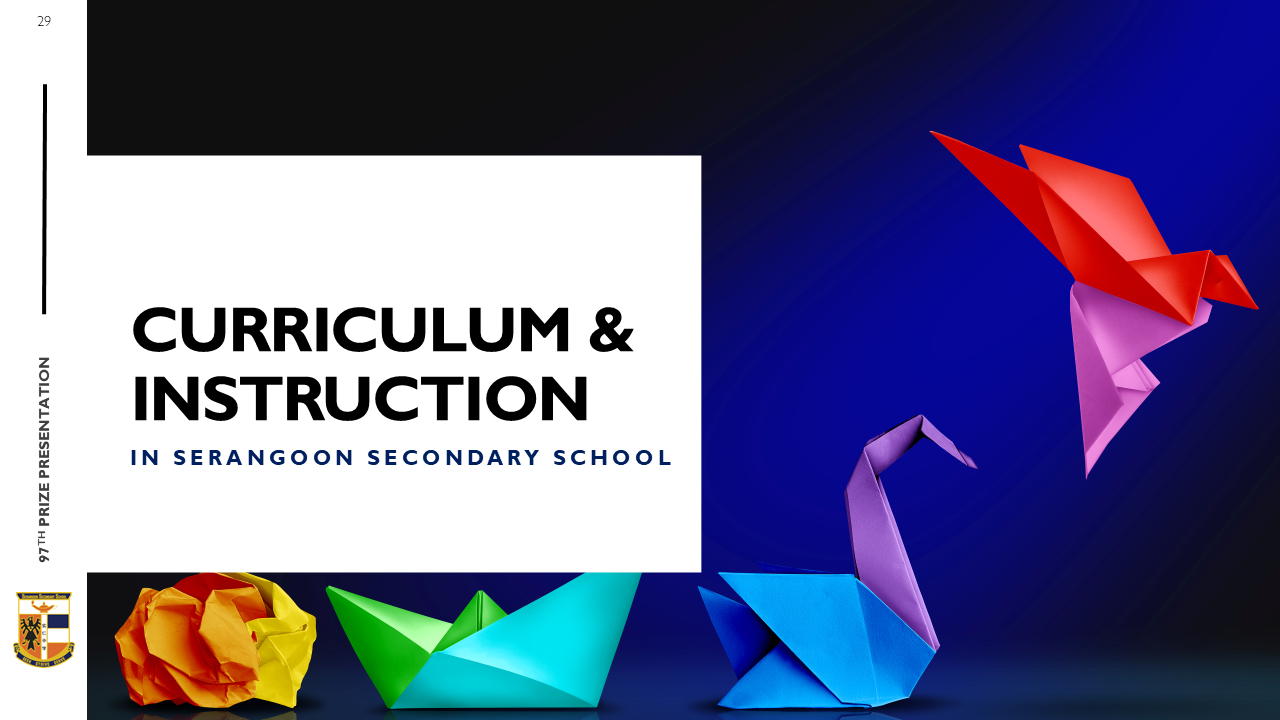
18 - In 2024, I highlighted how our academic departments have tailored learning experiences for our Serangoon StaRs that will equip them with the skills and attributes they need to thrive in today’s world. I outlined the programmes and pedagogical approaches in each of our academic departments.
Section D1: Acknowledgement and Celebration of Success
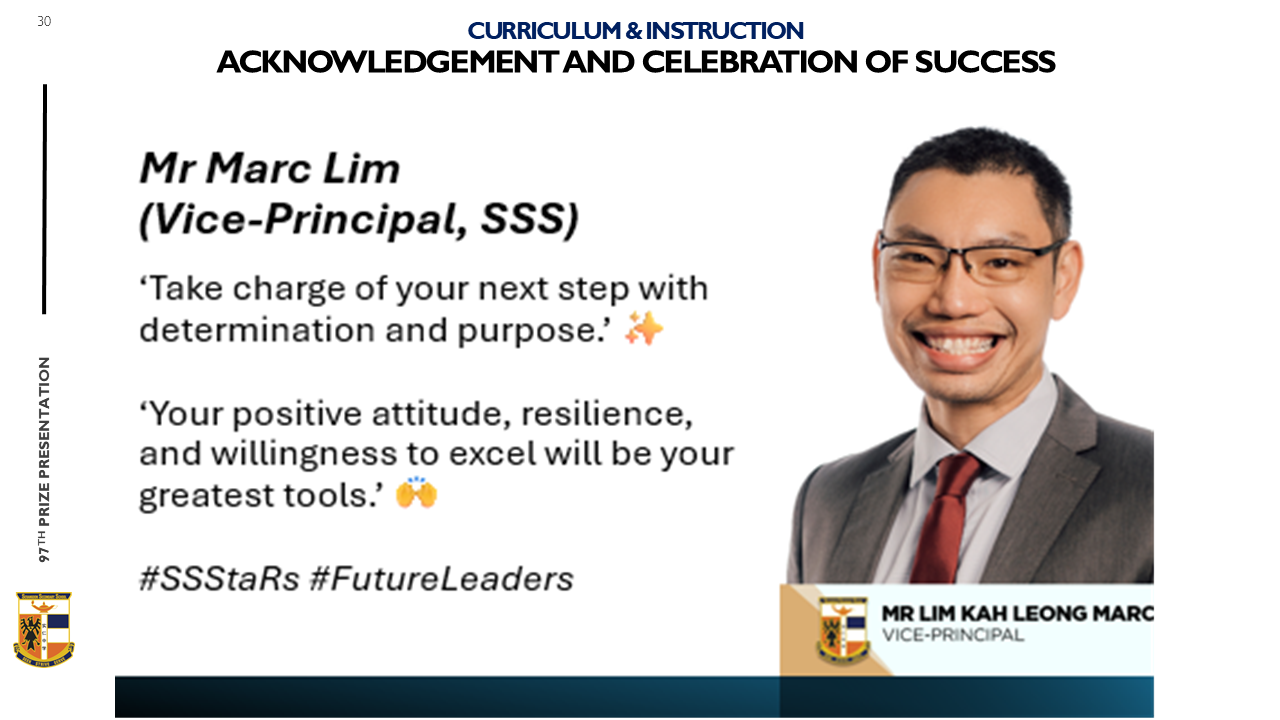
19 - Before I go any further, allow me to take a moment to acknowledge the quiet determination and collective effort behind the Class of 2024’s performance in the National Examinations.
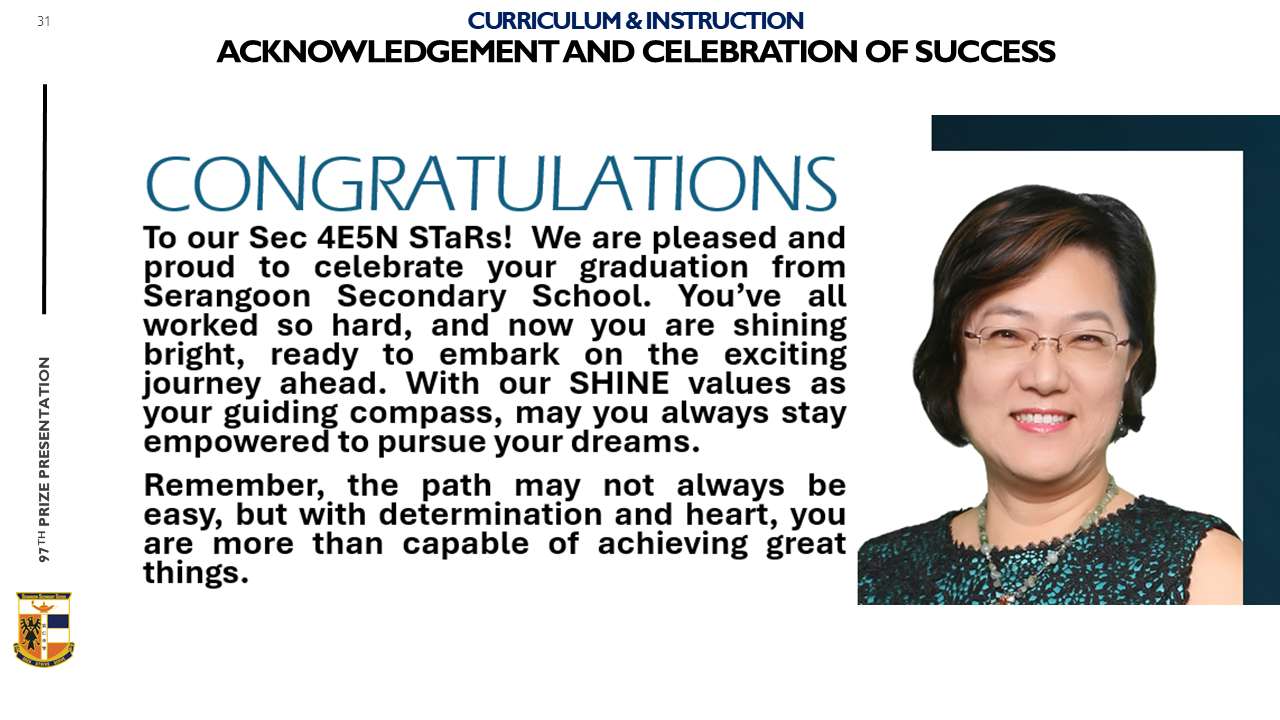
Across most subjects, we witnessed steady and heartening progress. A greater number of our N-level students have qualified for important next steps — be it Secondary 5, the Polytechnic Foundation Programme, or the Direct-Entry Scheme to Polytechnic.
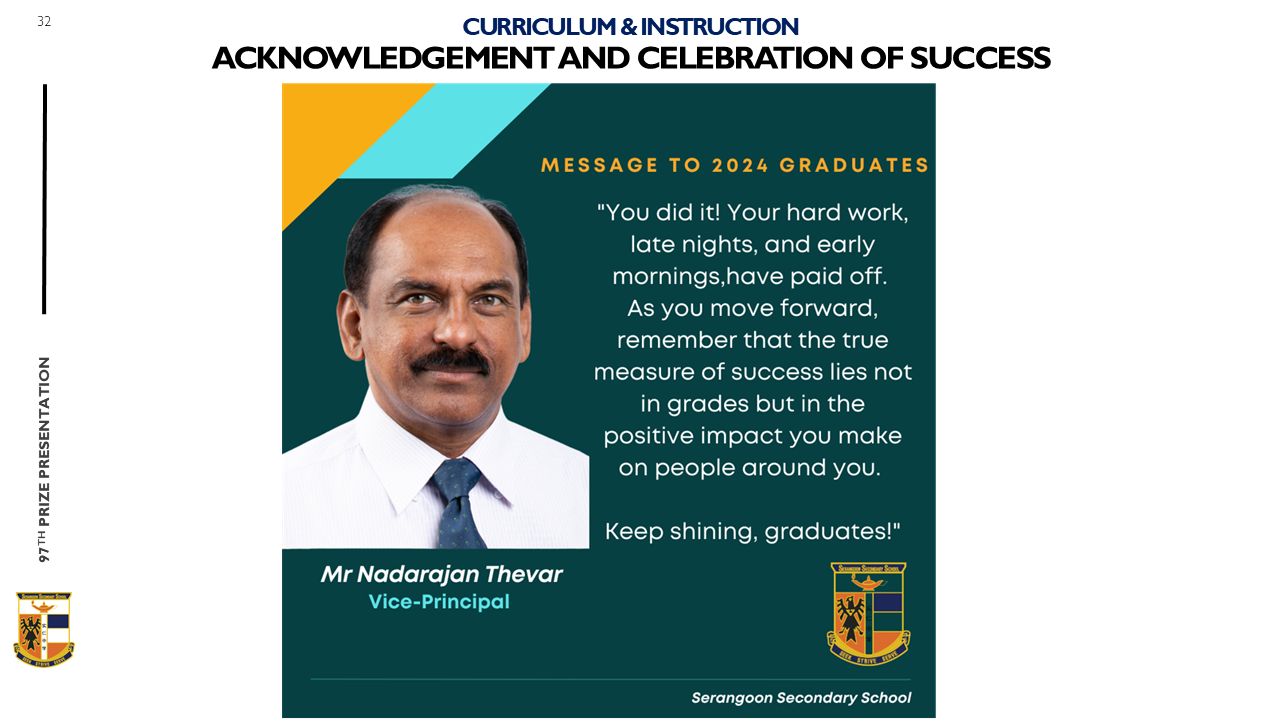
Among our O-level students, there was a notable increase in those from both the Express and Normal (Academic) courses achieving five or more O-level passes.
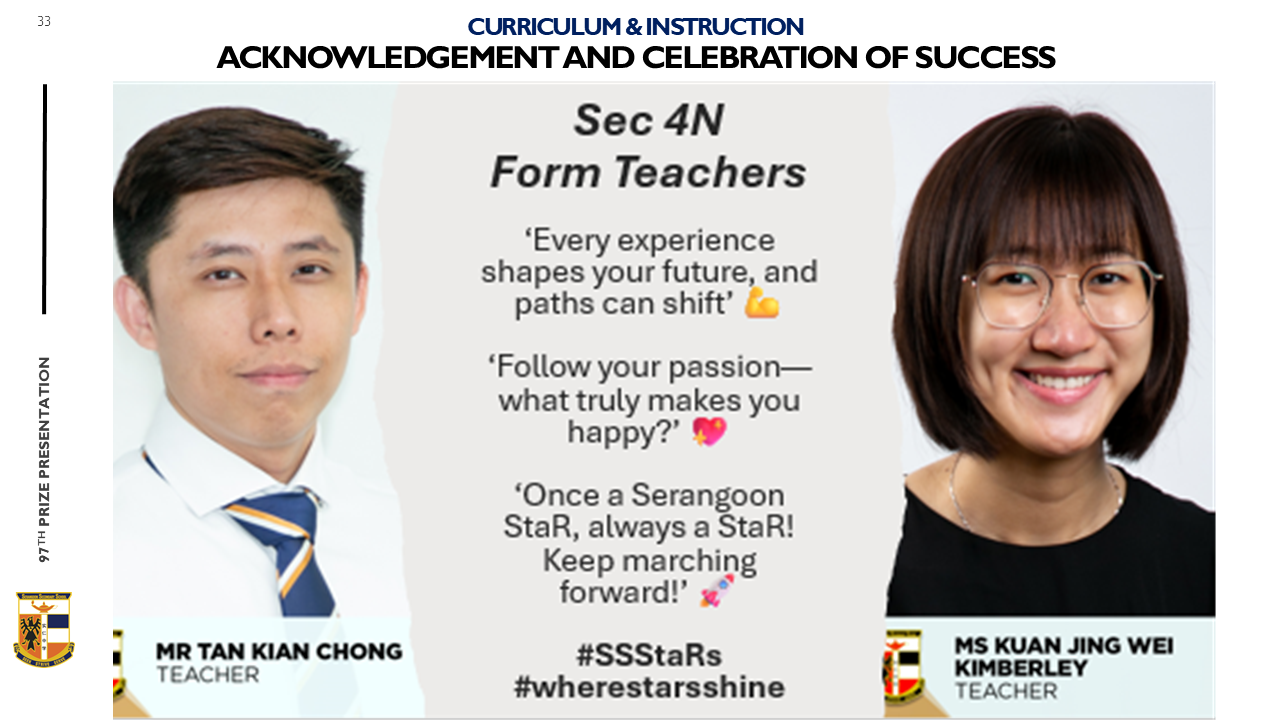
These accomplishments are not merely academic milestones; they are a testament to our students’ resilience, their commitment to growth, and the steadfast guidance of our teachers and families.
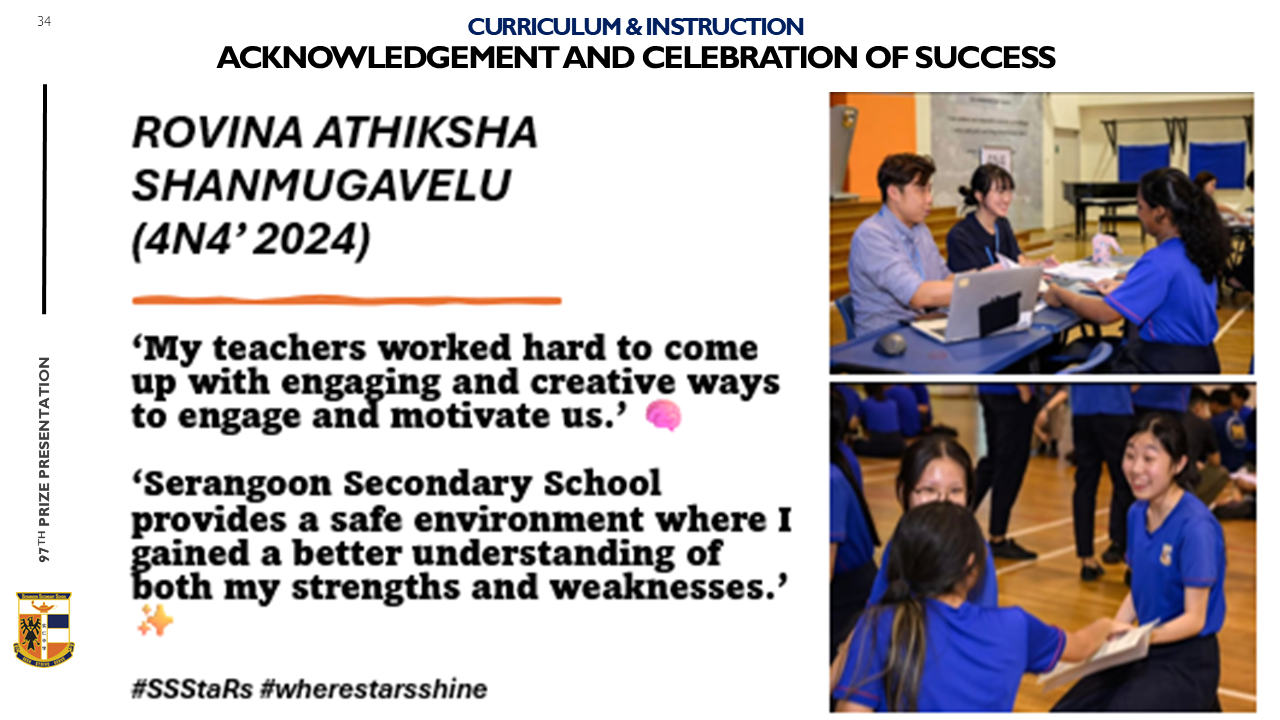
In addition, the Early Admission Exercise, which enables students to progress and access learning opportunities in IHLs and JCs,
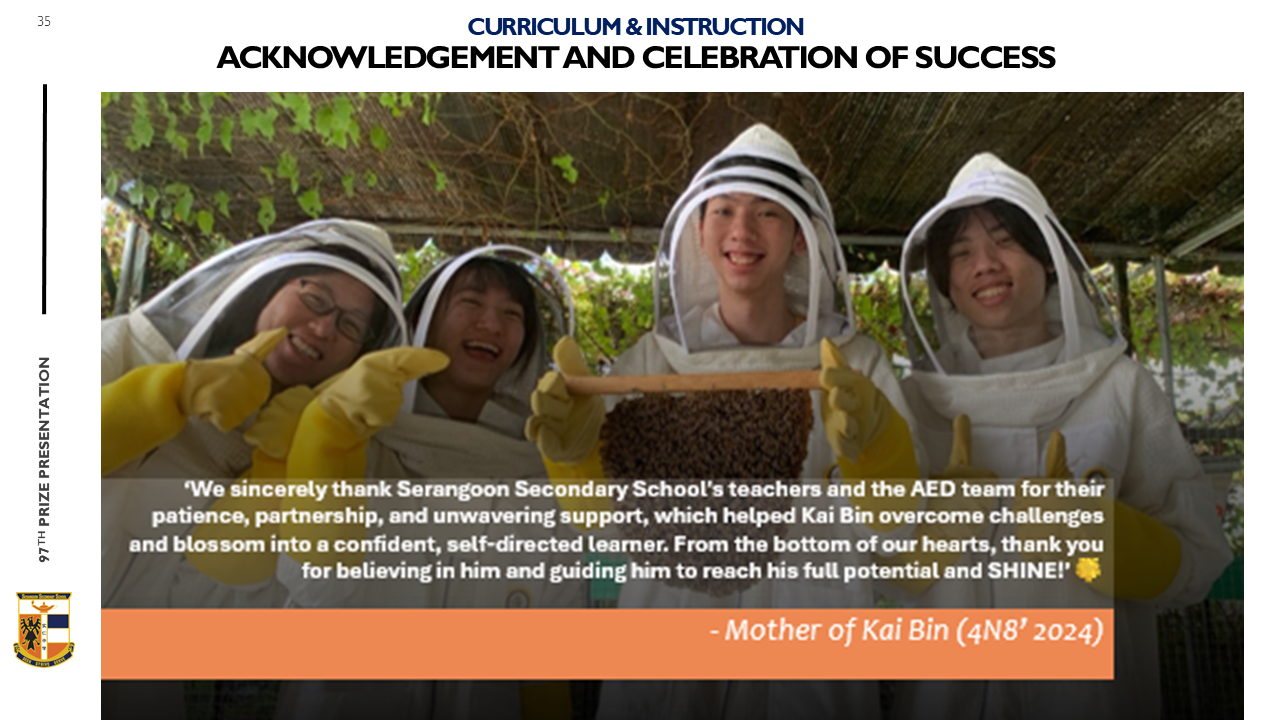
has gained strong support from parents, many of whom choose to take a leap of faith by securing placements for their children even before the release of national examination results.
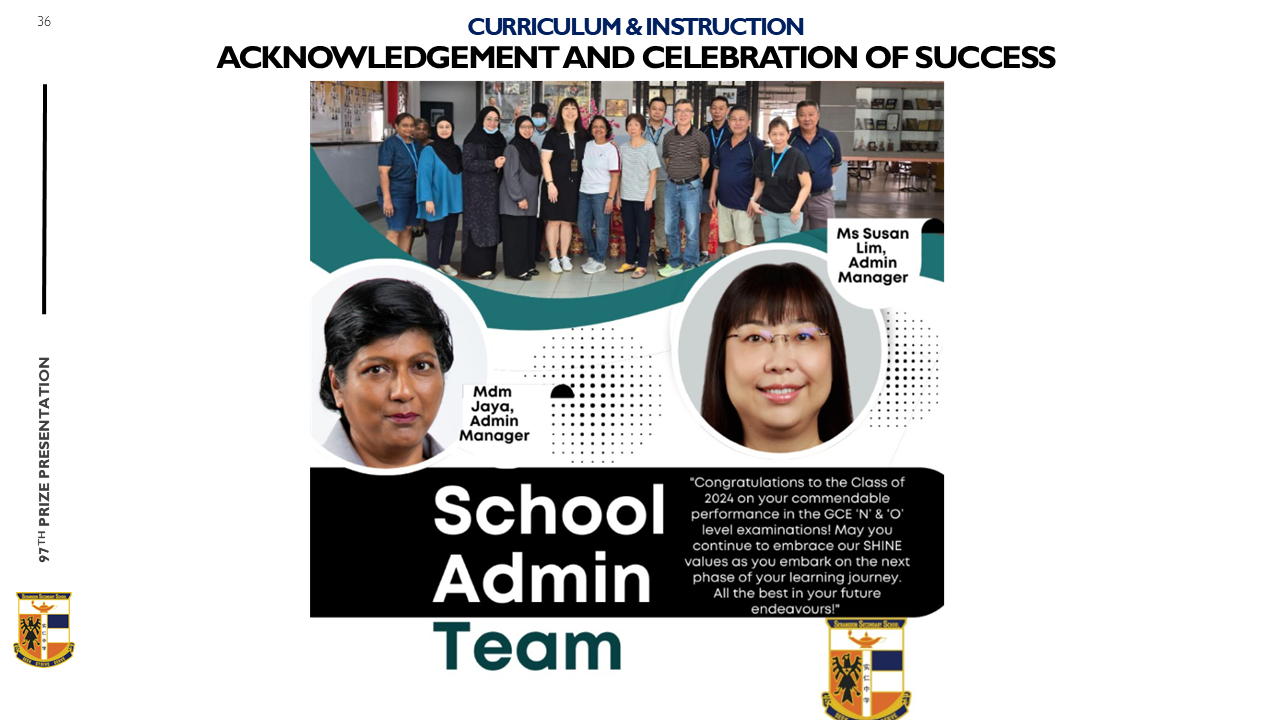
20 - Today, we celebrate not just results, but the character and perseverance that made them possible.
**Section D2: Department signature programmes Section D2A: CG1
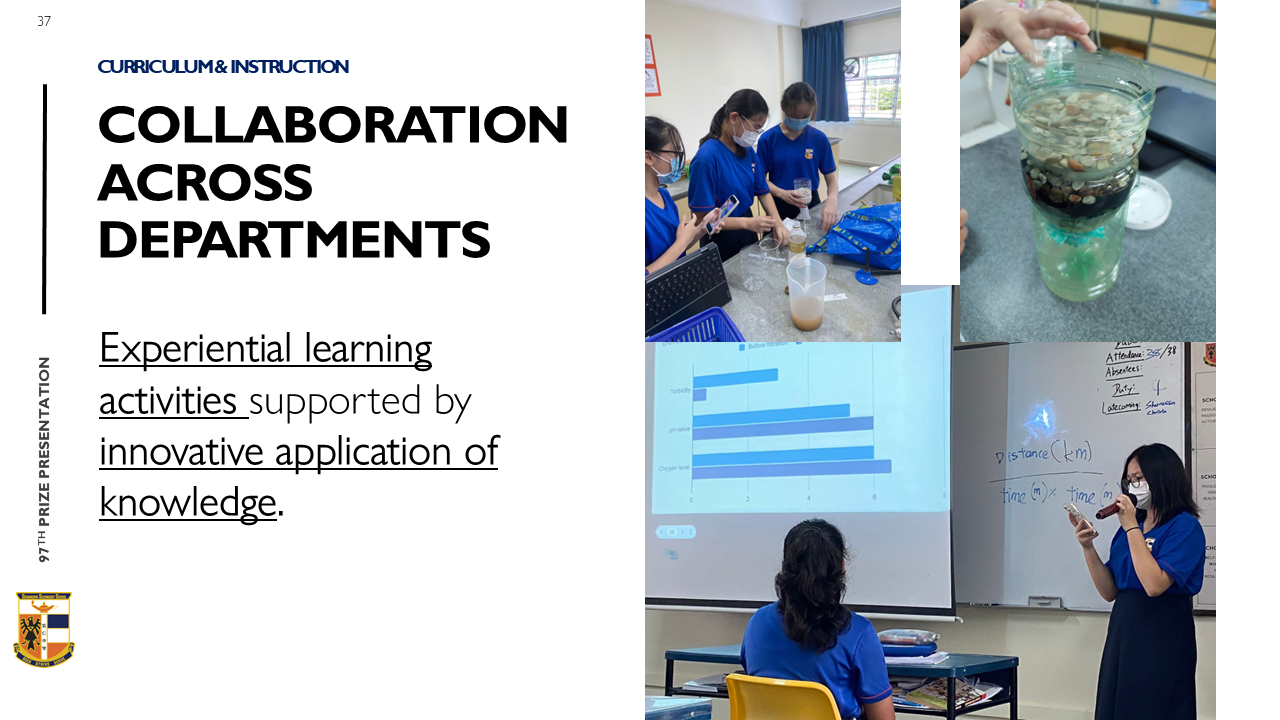
21 - One of the cornerstones of our dynamic learning culture is collaboration. We firmly believe that learning is most powerful when connections are made across disciplines, mirroring the interconnectedness of the real world. A prime example of this synergy is our Secondary 1 Inter-departmental Project Work. Here, our English Language, Science, and Humanities Departments come together, guiding students through real-world learning that involves experimentation, research, and oral presentation. Students learn to integrate knowledge and skills from different domains, break down traditional subject silos and develop holistic problem-solving abilities.
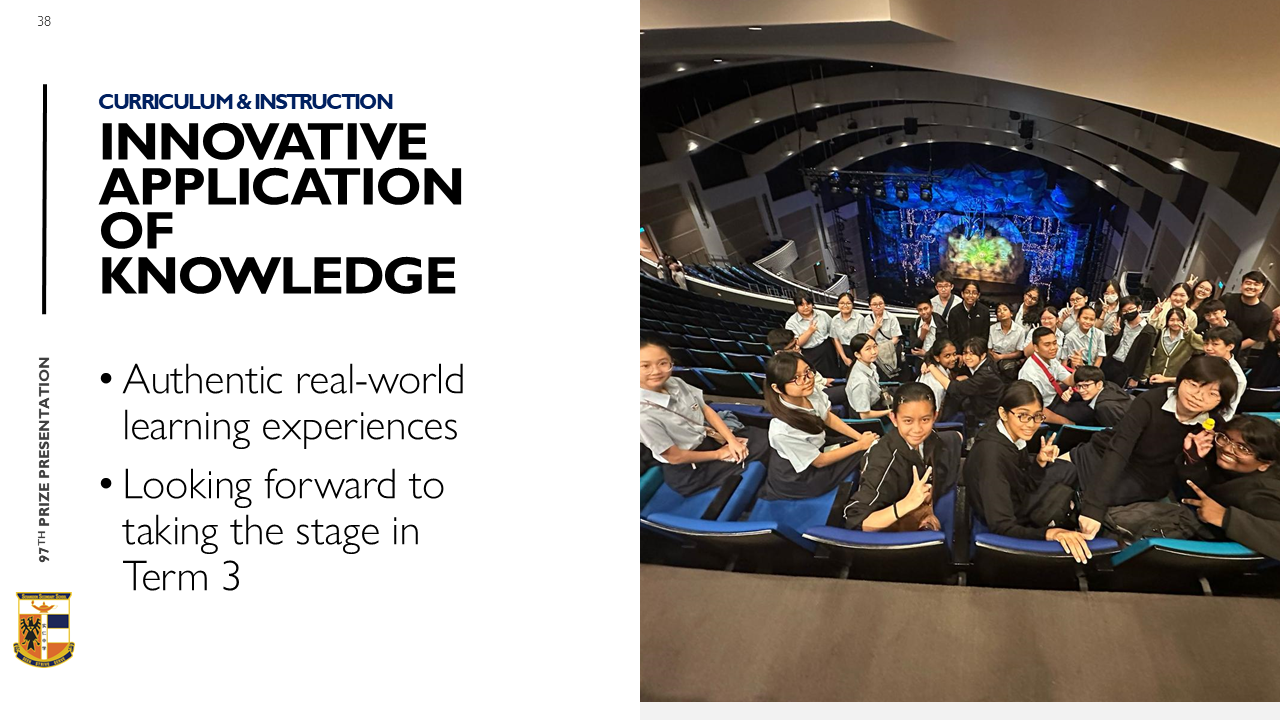
22 - Experiential learning activities are supported by innovative application of knowledge. An example is the English Language and Literature Department’s ‘Script-to-Stage’ enrichment with an exciting two-part Literature project. It illustrates our students’ enthusiasm and growing love for literature. The journey began on Saturday, 19 April this year, when 30 of our Secondary 1 and 2 students attended the ‘Wicked’ musical at Marina Bay Sands. Inspired by the show’s storytelling, they are now channeling that energy into performing scenes from their literature texts —“LIVE! At the Wet Market” and “Thank You, Ma’am“. We look forward to them taking the stage in Term 3, Week 2.
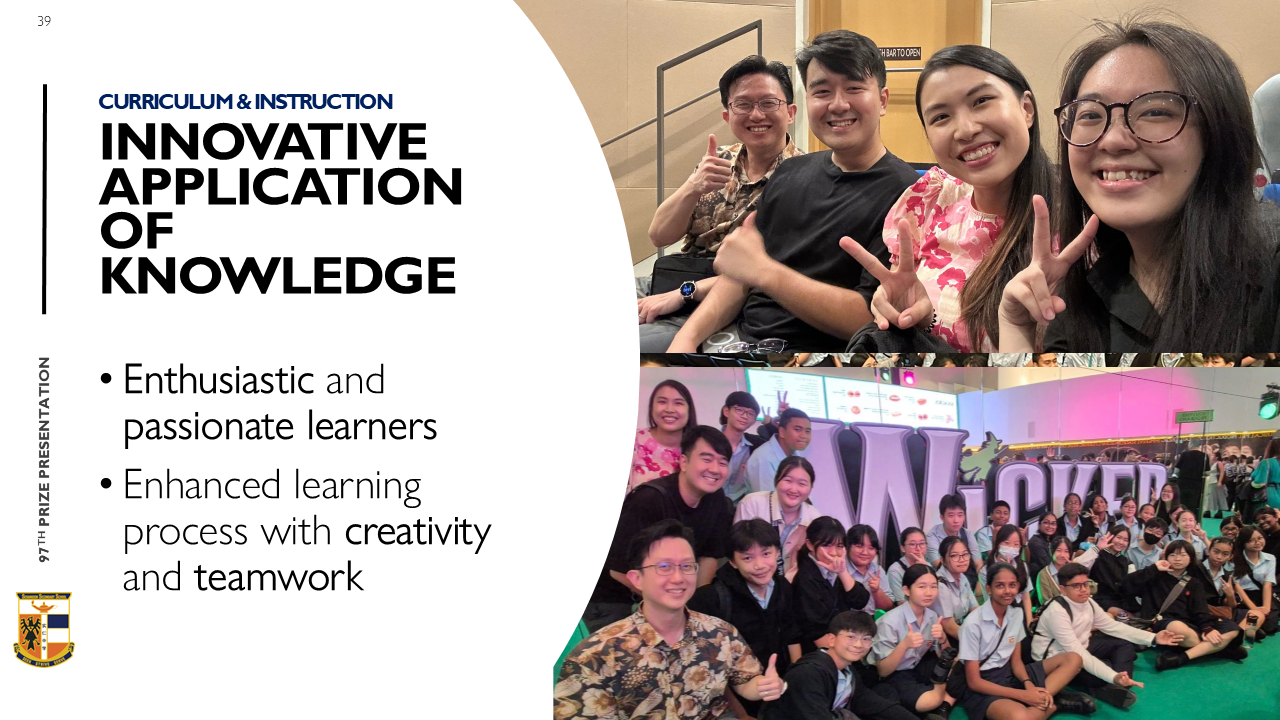
23 - What has stood out to the team of Literature teachers: Ms Timmie Tan, Mr Shawn Seah and Ms Caritas Lee, is how enthusiastic our students have been. They have displayed remarkable initiative—offering one another feedback on their delivery and emotional expression. They even brainstormed creative ways to build props as a team, showcasing a strong sense of teamwork.
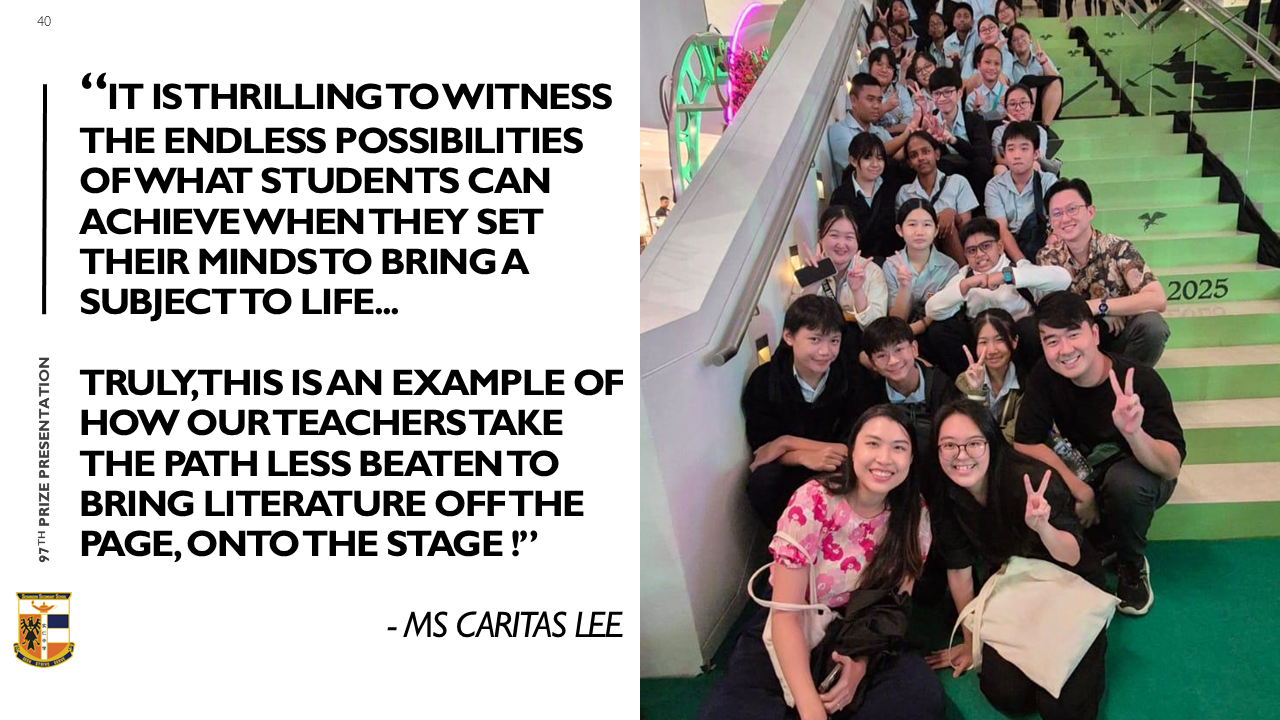
24 - In a conversation I had with one the teachers-in-charge, Ms Caritas Lee, she mentioned that it is thrilling to witness the endless possibilities of what students can achieve when they set their minds to bring a subject to life. Projects of this nature help our students express themselves confidently and develop empathy for the diverse experiences of others. Truly, this is an example of how our teachers take the path less beaten to bring Literature off the page, onto the stage.
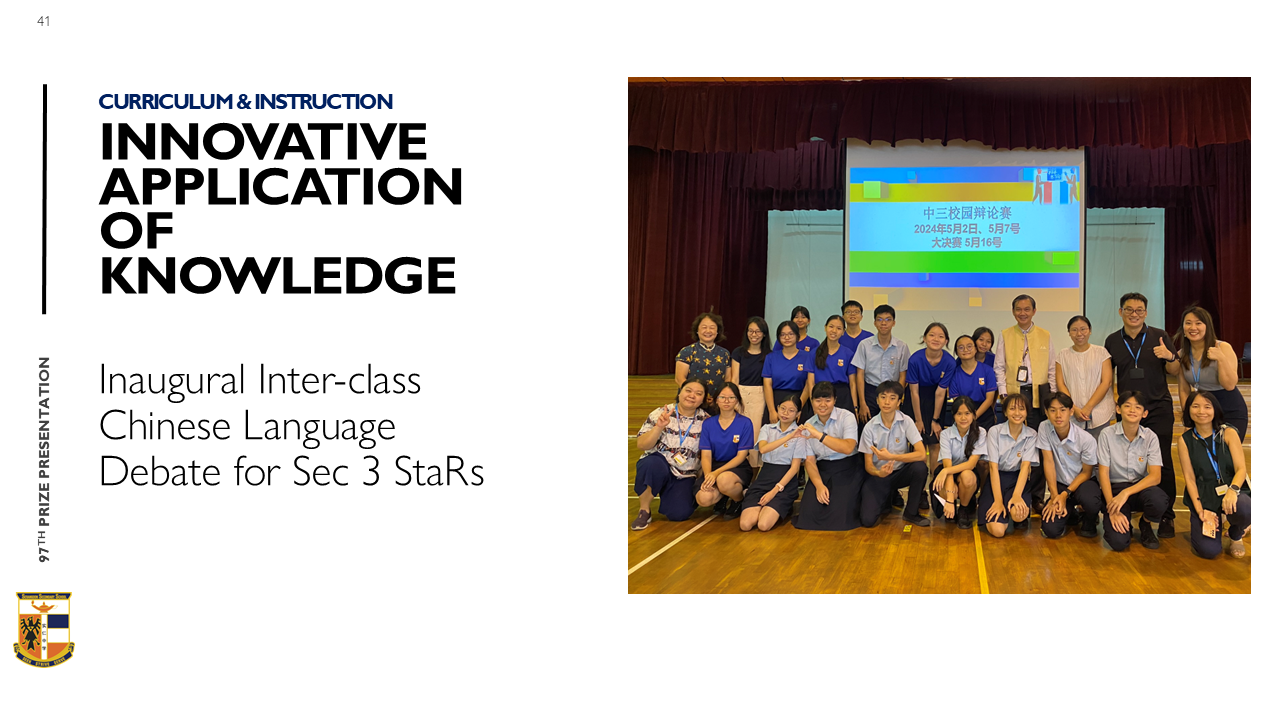
25 - Our Mother Tongue Language department ignites a joyful learning experience for students through enriching and authentic cultural experiences as well as engaging task-based activities. This approach not only deepens students’ linguistic proficiency, but also fosters a profound appreciation for their heritage, empowering them to connect with their roots in meaningful ways. In May 2024, the Chinese Language Unit organised its inaugural inter-class debate for Sec 3 StaRs. The event aimed to enhance students’ information skills through active and effective communication and collaboration. A second edition of the event is scheduled to take place later this year.
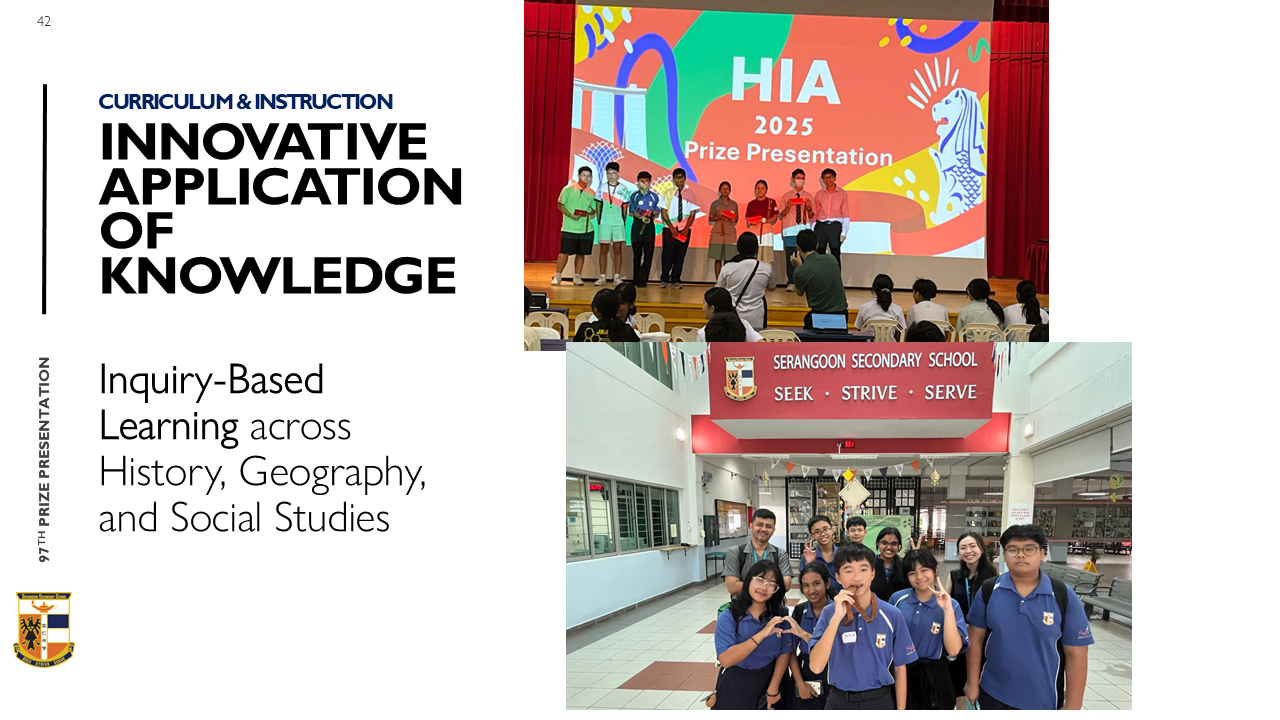
26 - Our Humanities Department does not just cultivate knowledge, but a genuine passion for understanding the world around us. Through the dynamic power of Inquiry-Based Learning across History, Geography, and Social Studies, we empower our students to become active explorers.
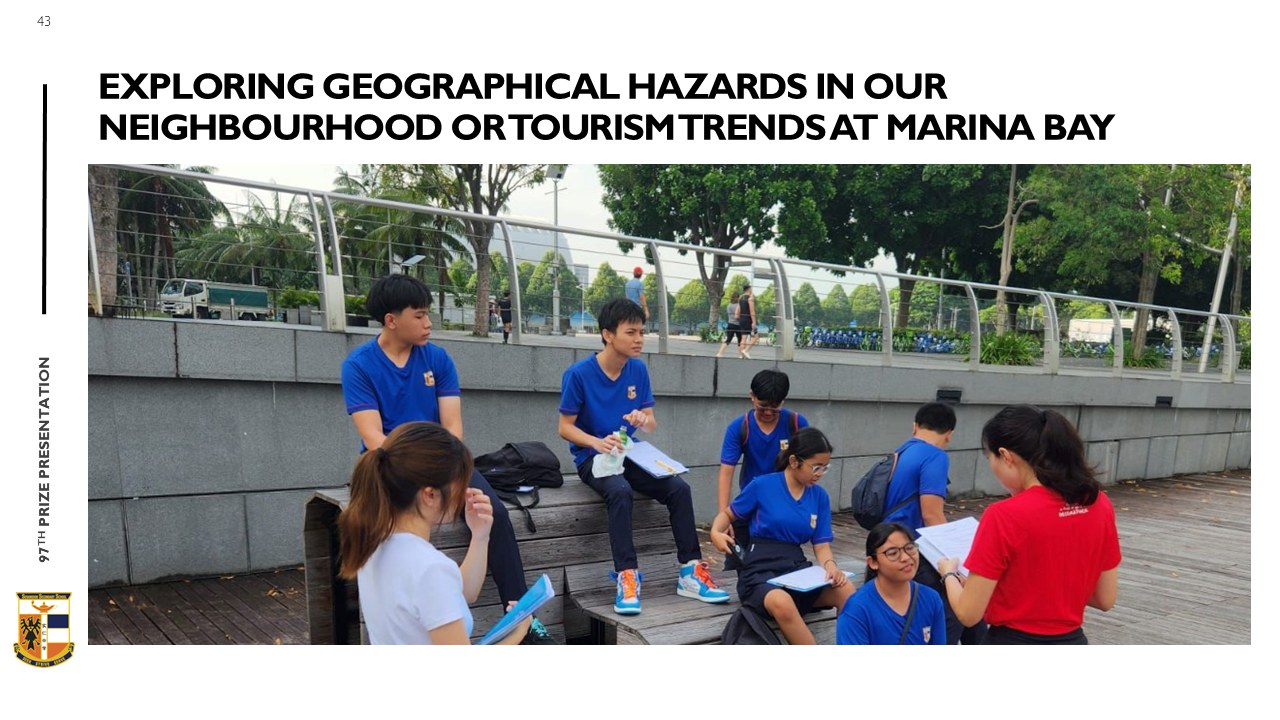
Innovation is also evident in the authentic, immersive investigations conducted by our Humanities students – be it exploring geographical hazards in our neighbourhood or tourism trends at Marina Bay. This vibrant approach not only strengthens their critical and inventive thinking skills but, more importantly, sparks a true Joyful Learning that will stay with them long after they leave our classrooms.
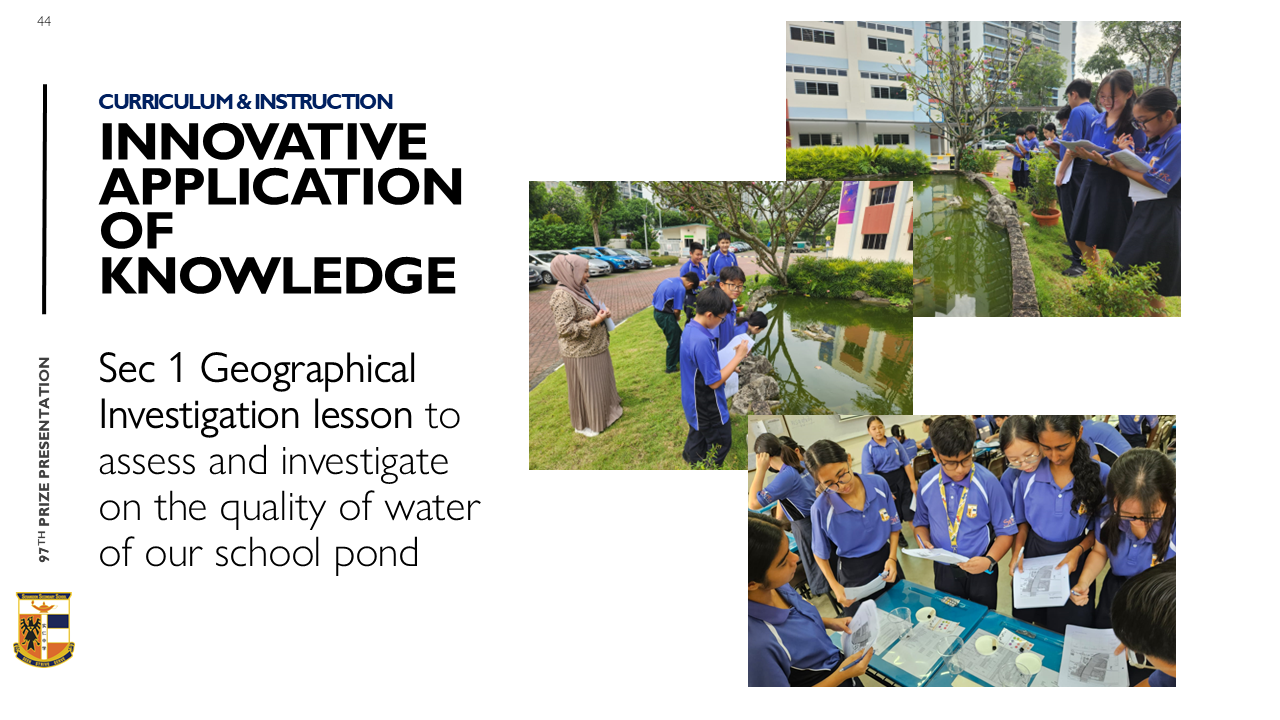
For example, Ms Ashirah conducted a Sec 1 Geographical Investigation lesson to assess and investigate on the quality of water of our school pond. Students need to make observations of the surrounding area of the school pond and make visual analysis of the water to decide on the water quality. The whole lesson aims to get students to engage students in experiencing the 5 stages of Geographical Investigation themselves.
Section D2B:CG2
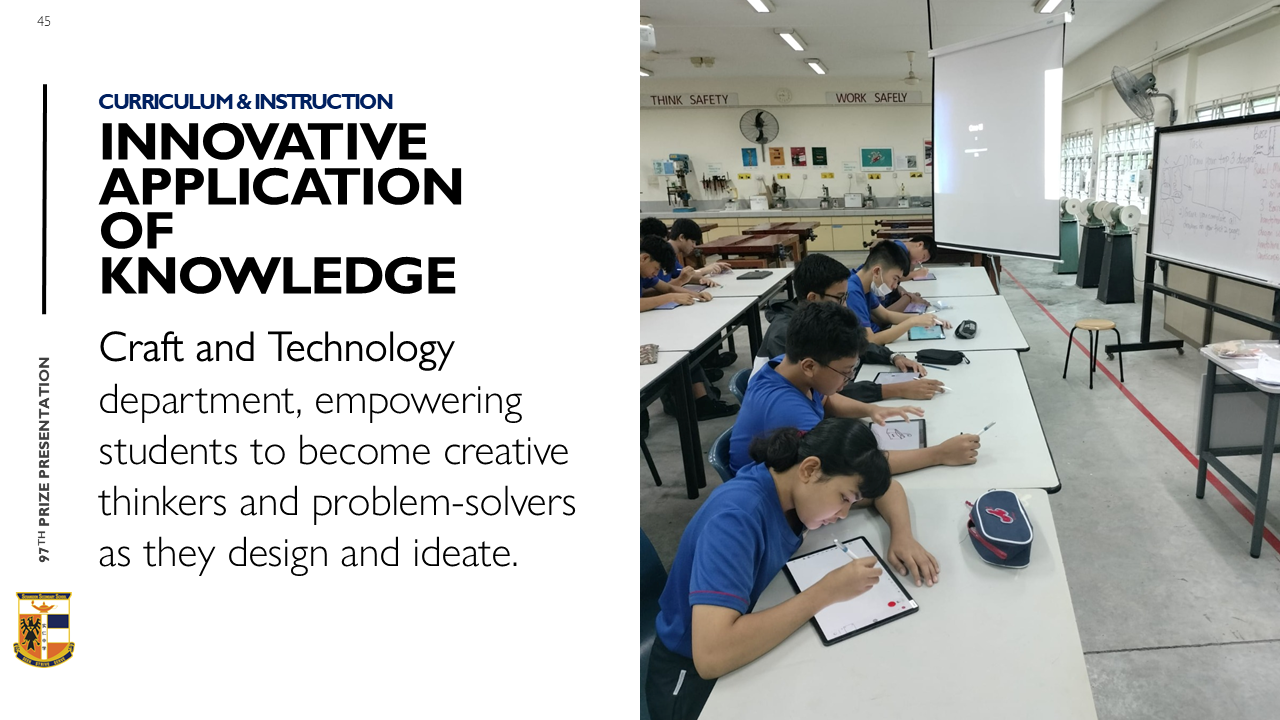
27 - Alongside collaboration, innovation is central to how we approach teaching and learning. Within the respective curriculum groups, we constantly seek creative and effective ways to ignite curiosity and make learning deeply meaningful. You see this innovative spirit in the project-based approach adopted by our Craft and Technology department, empowering students to become creative thinkers and problem-solvers as they design and ideate.
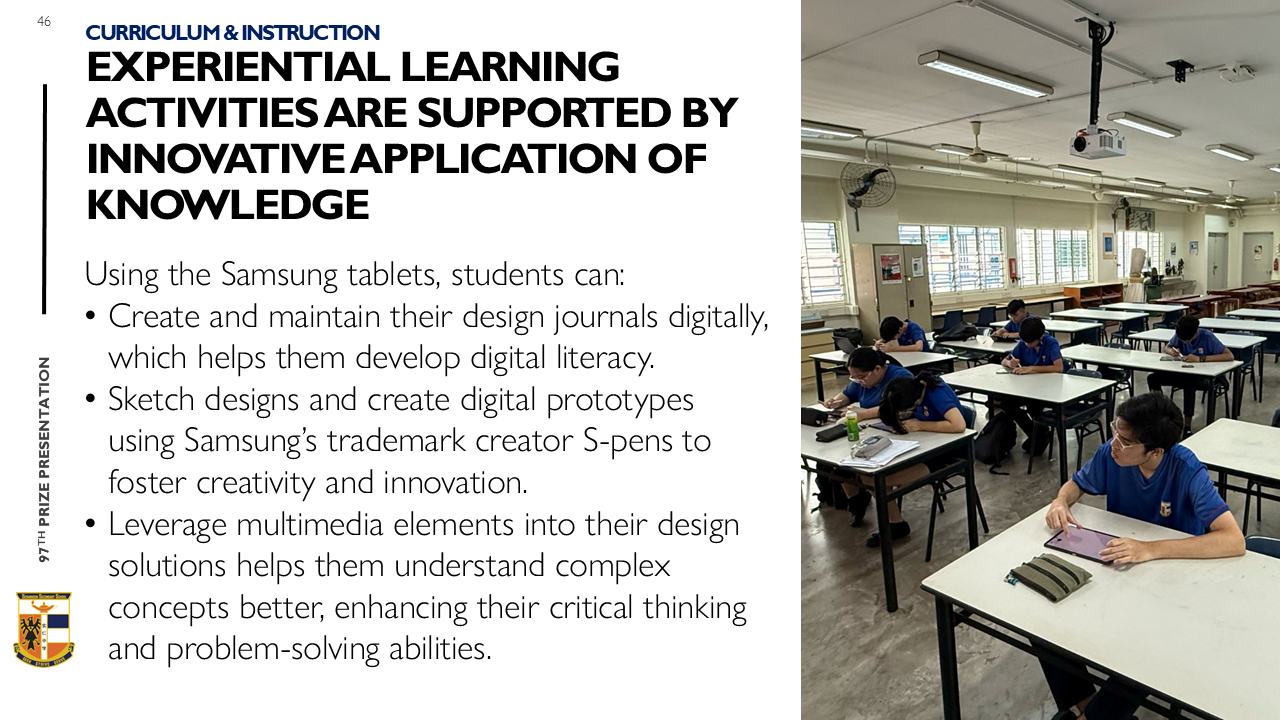
28 - I would like to spotlight our school’s collaboration with Samsung, supported by the CPDD D&T Unit. This partnership sees Samsung providing their S8 and S9 tablets to our school’s Secondary 4 D&T students. The initiative aims to explore how students can use tablets to further enhance their coursework processes, allowing them to explore innovative design solutions and enhance their technical skills while developing essential 21st Century Competencies (21CC) skills.
The following will be captured in the slide:
Using the Samsung tablets, students can:
- Create and maintain their design journals digitally, which helps them develop digital literacy.
- Sketch designs and create digital prototypes using Samsung’s trademark creator S-pens to foster creativity and innovation.
- Leverage on multimedia elements into their design solutions helps them understand complex concepts better, enhancing their critical thinking and problem-solving abilities.
This collaboration underscores the commitment of both Serangoon Secondary School and Samsung to foster a forward-thinking educational environment, ultimately preparing students their career as well as future technological advancements.
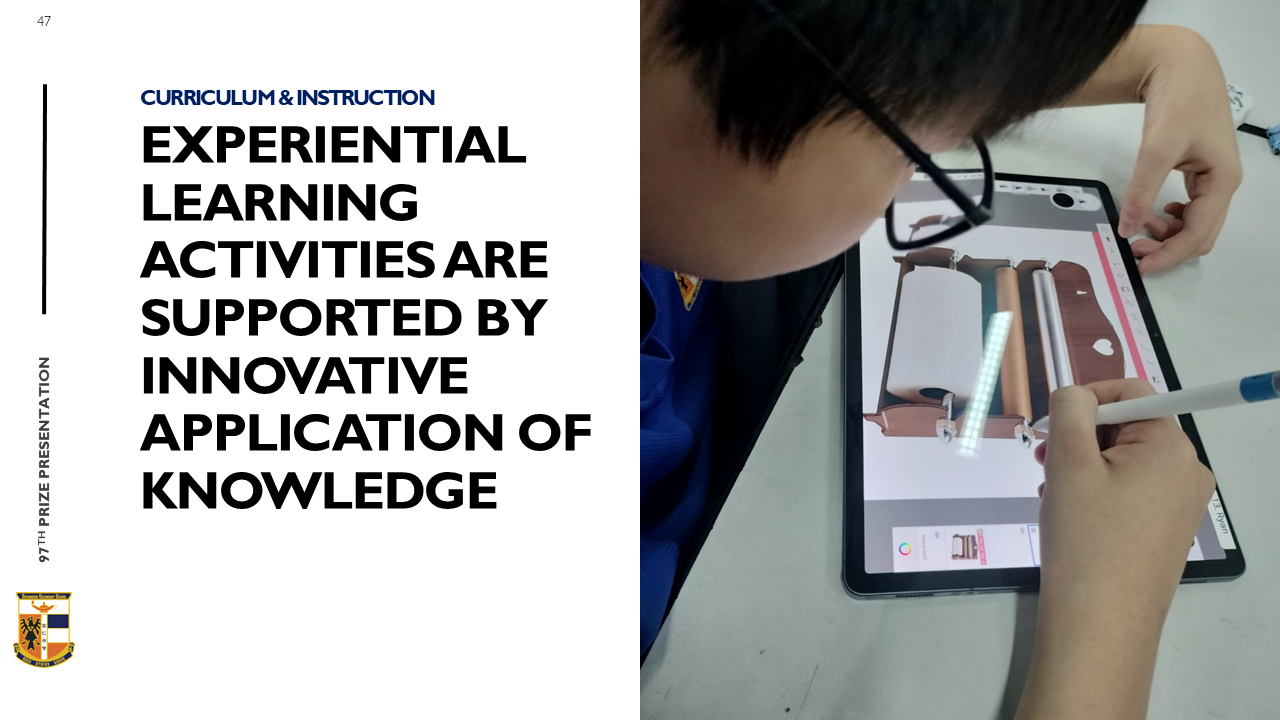
29 - Also, our collaboration with industry partner STUCK Design introduces an innovative AI booth featuring the HYPERSKETCH App on iPads, offering students a hands-on experience in AI-driven design for D&T, Art, and schoolwide improvement projects. This initiative cultivates crucial digital skills like AI literacy and digital sketching, while also enhancing critical and inventive thinking as students generate and evaluate AI-powered design solutions. By embracing this technology, we empower our students to push the boundaries of creativity, solve complex problems, and envision innovative solutions for the future.
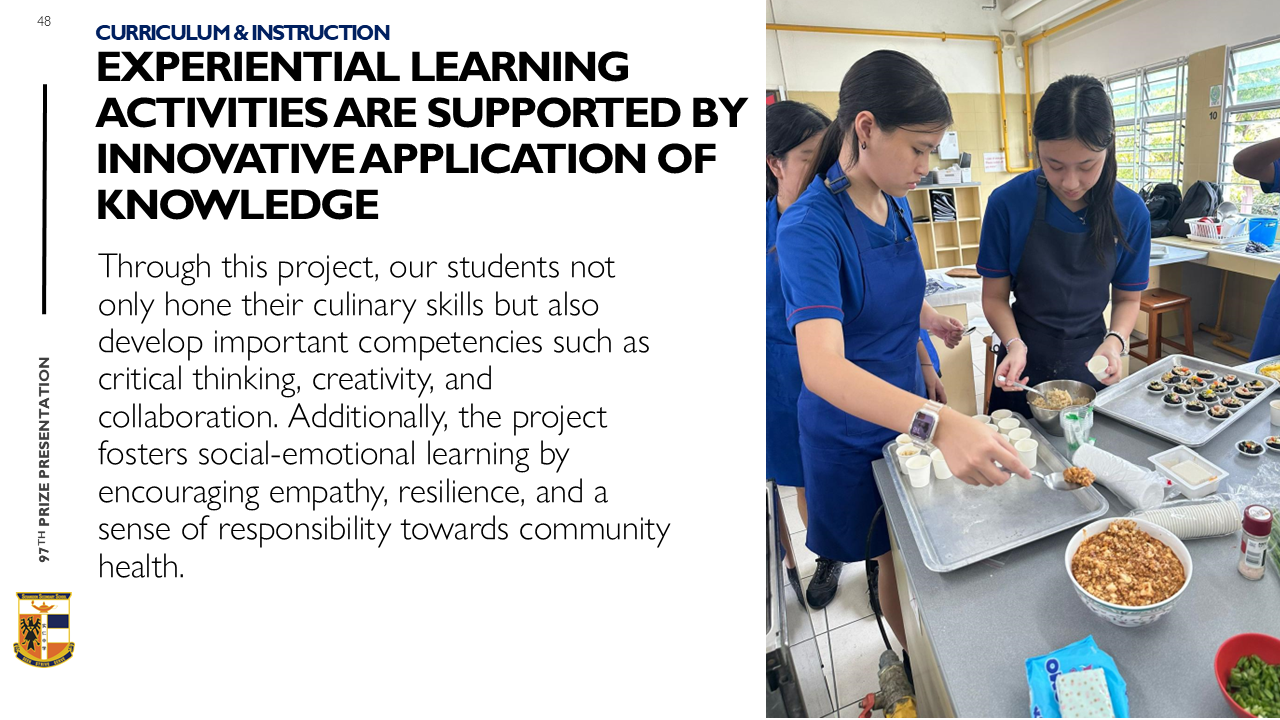
30 - The Nutrition and Food Science (NFS) unit celebrates the achievements of our Secondary 3 NFS students in the Connecting Heartily Project. This initiative, aligned with the theme of World Health Day, empowers our students to create and modify dishes that promote adult health, focusing on managing conditions such as diabetes and obesity. Each group of students is tasked with selecting and preparing three dishes that are not only delicious but also nutritionally balanced to support adult health. They will need to research and understand the dietary requirements for managing diabetes and obesity and creatively adapt recipes to meet these needs. This involves careful planning, ingredient selection, and cooking techniques that enhance the health benefits of their dishes.
31 - The following will be captured in the slide:
Through this project, our students not only hone their culinary skills but also develop important competencies such as critical thinking, creativity, and collaboration. Additionally, the project fosters social-emotional learning by encouraging empathy, resilience, and a sense of responsibility towards community health.
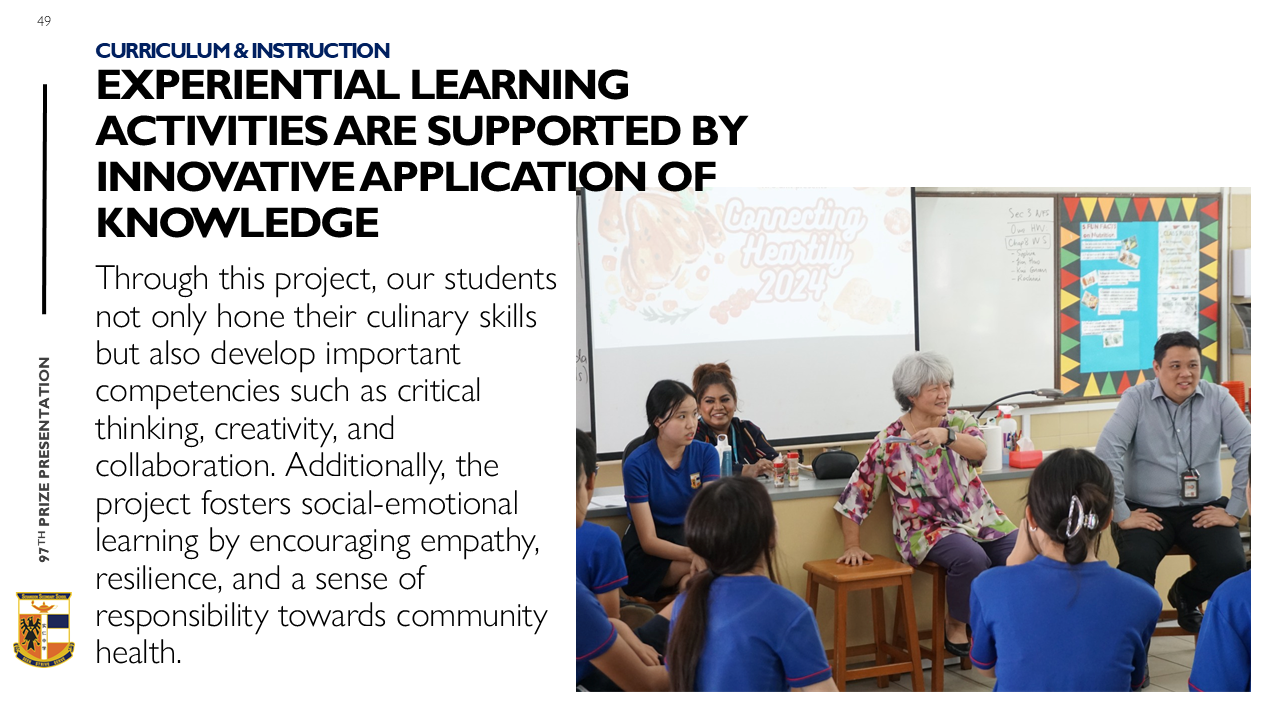
32 - Importantly, this project helps students see the connection between their learning and real-world contexts. By addressing real health issues and creating practical solutions, students understand the impact of their work beyond the classroom. They learn how dietary choices can influence health outcomes and gain insights into the challenges faced by individuals with health conditions. We are also honored to have a nutritionist, Ms Gladys Wong from Khoo Teck Puat Hospital join us, enriching our students’ understanding of healthcare and wellness. This project exemplifies our commitment to holistic education, preparing our students to be thoughtful, innovative, and caring individuals.
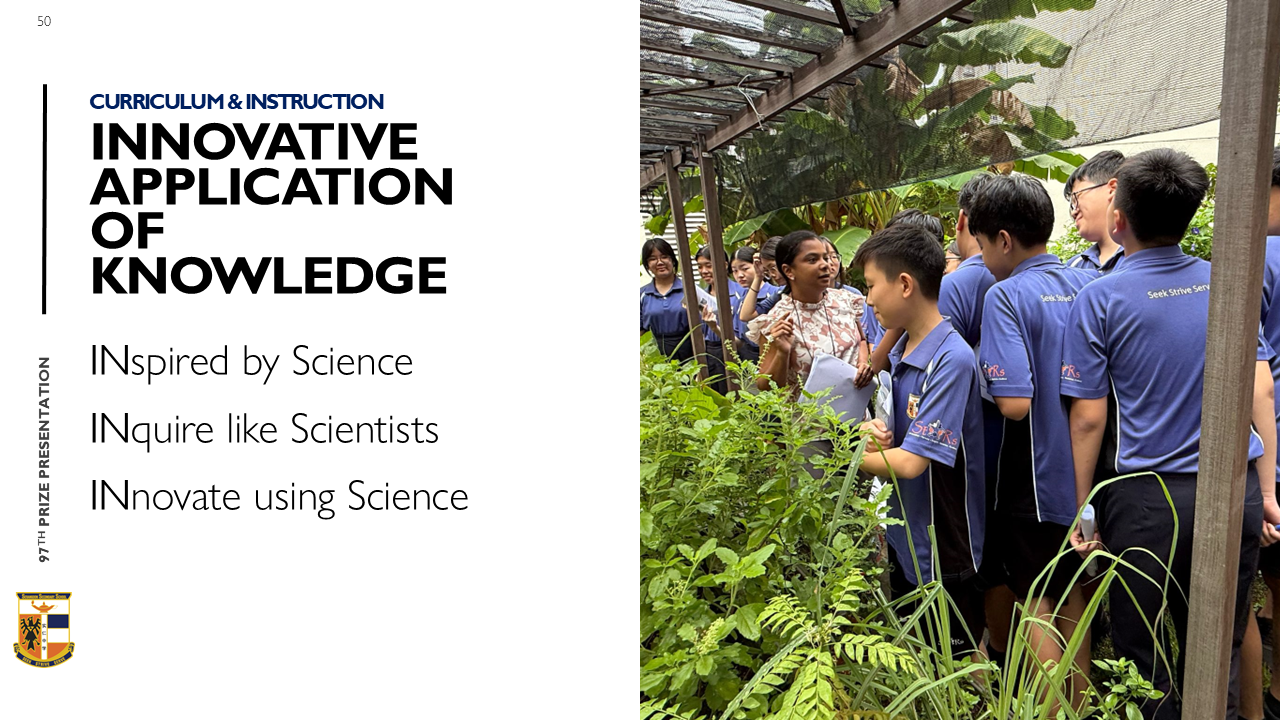
33 - Our Science Department is igniting a powerful vision, one that actively cultivates the 3 ‘IN-s’ in our students. This multifaceted approach ensures our students are not just learning topics in Science, but are truly INspired by Science, INquire like Scientists, and INnovate using Science. We achieve this by immersing them in the dynamic practices of science through robust inquiry-based learning. Furthermore, we strategically connect their learning to the real-world through a diverse array of enriching programmes, including impactful learning journeys and engaging workshops.
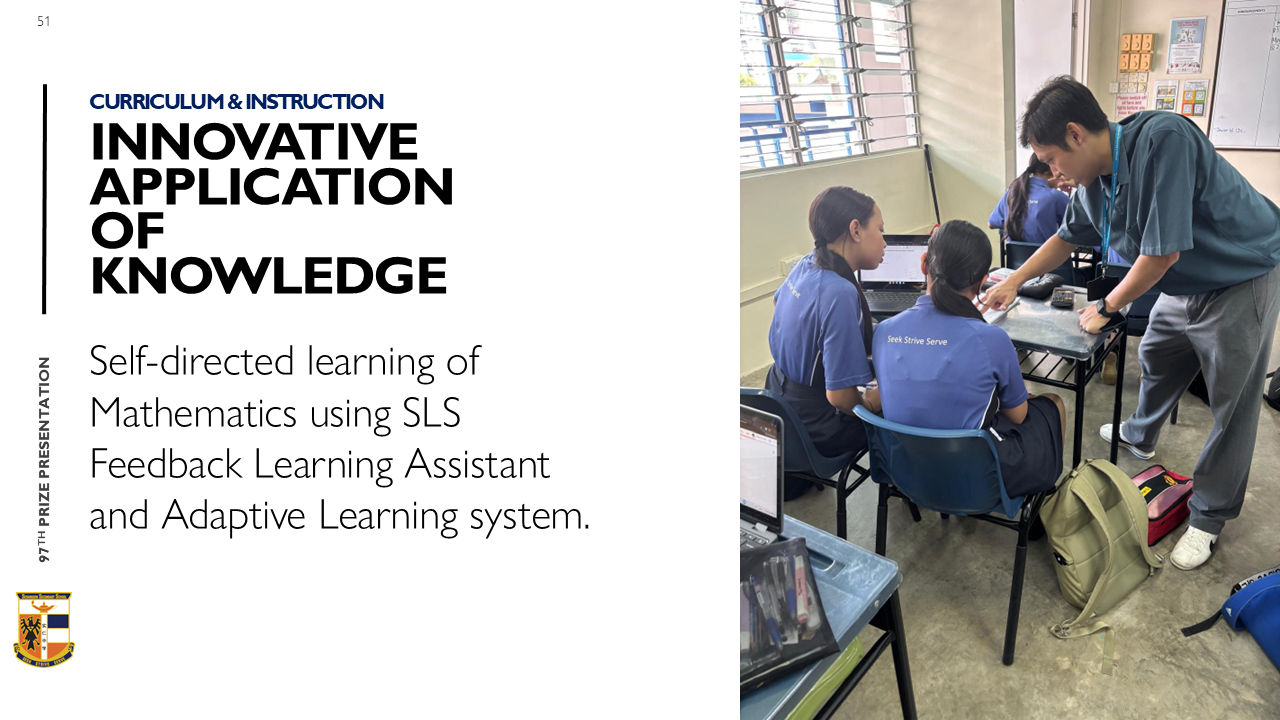
34 - Here, you can see our Math teachers using EdTech Feedback Assistant and SLS Adaptive Learning system to promote self-directed learning of Mathematics. We spark the joy of discovery through signature programmes like Computational Thinking in Mathematics and the Math Learning Day where students apply their knowledge of Math in games.
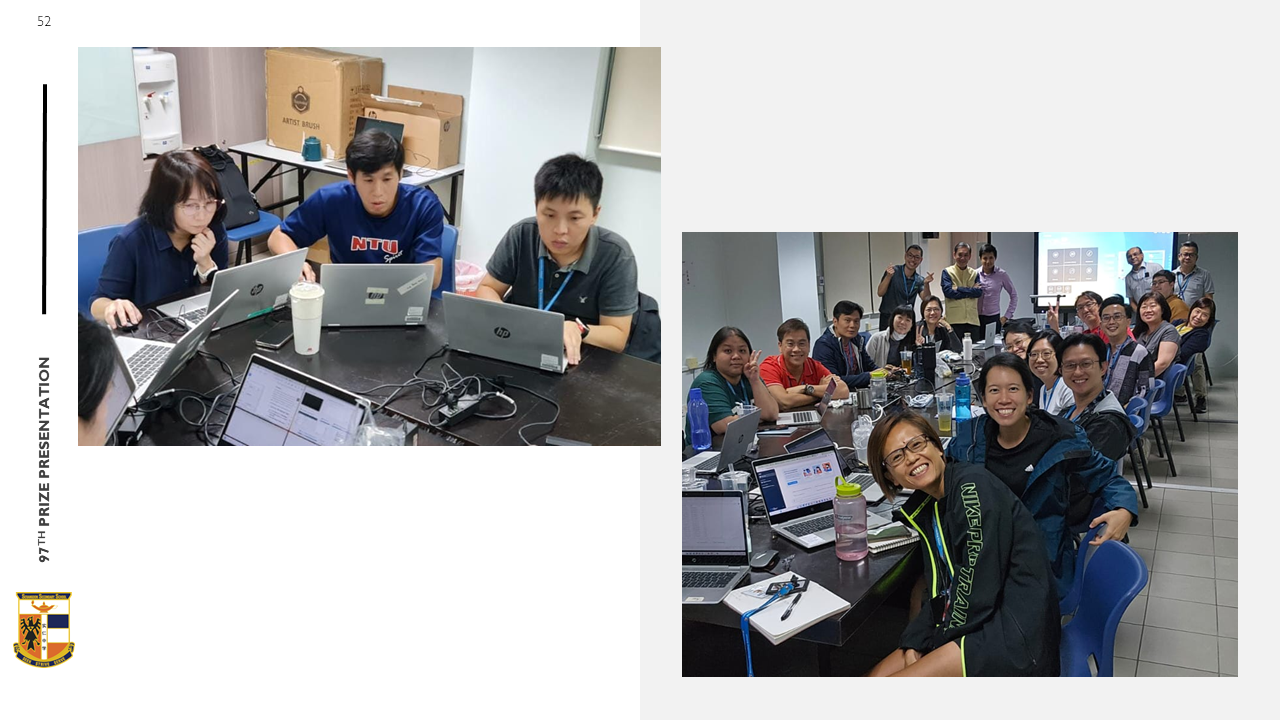
35 - This dedicated culture of collaboration and innovation, championed by every department, does more than just create exciting lessons and programs. In truth, we seek to actively cultivate the emerging and essential competencies and skills our students need for the future: critical thinking, adaptability, creativity, and effective communication. The dynamic, supportive, and forward-looking environment shaped by our staff provides the fertile ground upon which the successes we celebrate today have grown.
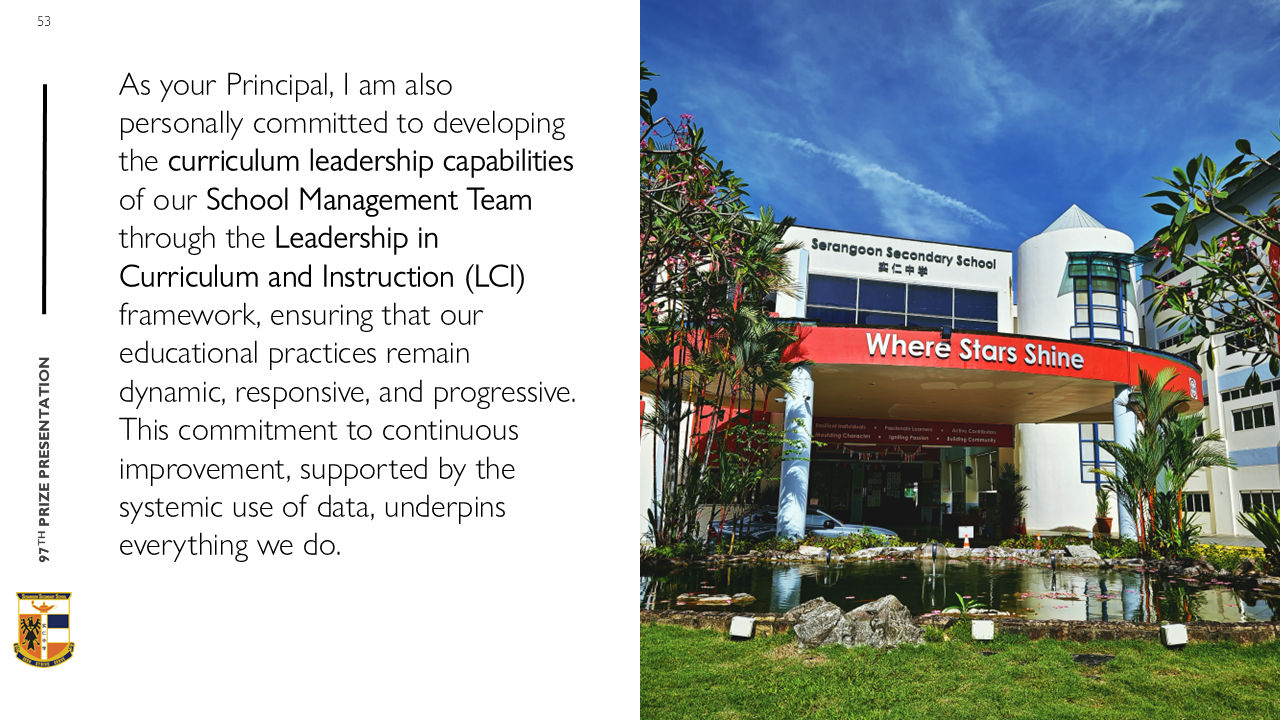
36 - Furthermore, we are deeply committed to how learning takes place. Our curricular approaches – encompassing content, pedagogy, and assessment – are designed to ignite a genuine Joy of Learning. We prioritise leveraging Educational Technology as a learning multiplier, embarking on MOE’s EdTech Masterplan 2030, in creating an authentic learning experience that foster engagement, sparkle curiosity, and nurture creativity. We believe that learning should be an active and engaging process that prepares students not just for a life of tests, but the test of life.
37 - The following will be captured in the slide: As your Principal, I am also personally committed to developing the curriculum leadership capabilities of our School Management Team through the Leadership in Curriculum and Instruction (LCI) framework, ensuring that our educational practices remain dynamic, responsive, and progressive. This commitment to continuous improvement, supported by the systemic use of data, underpins everything we do.
**E. EdTech 2030 Masterplan **
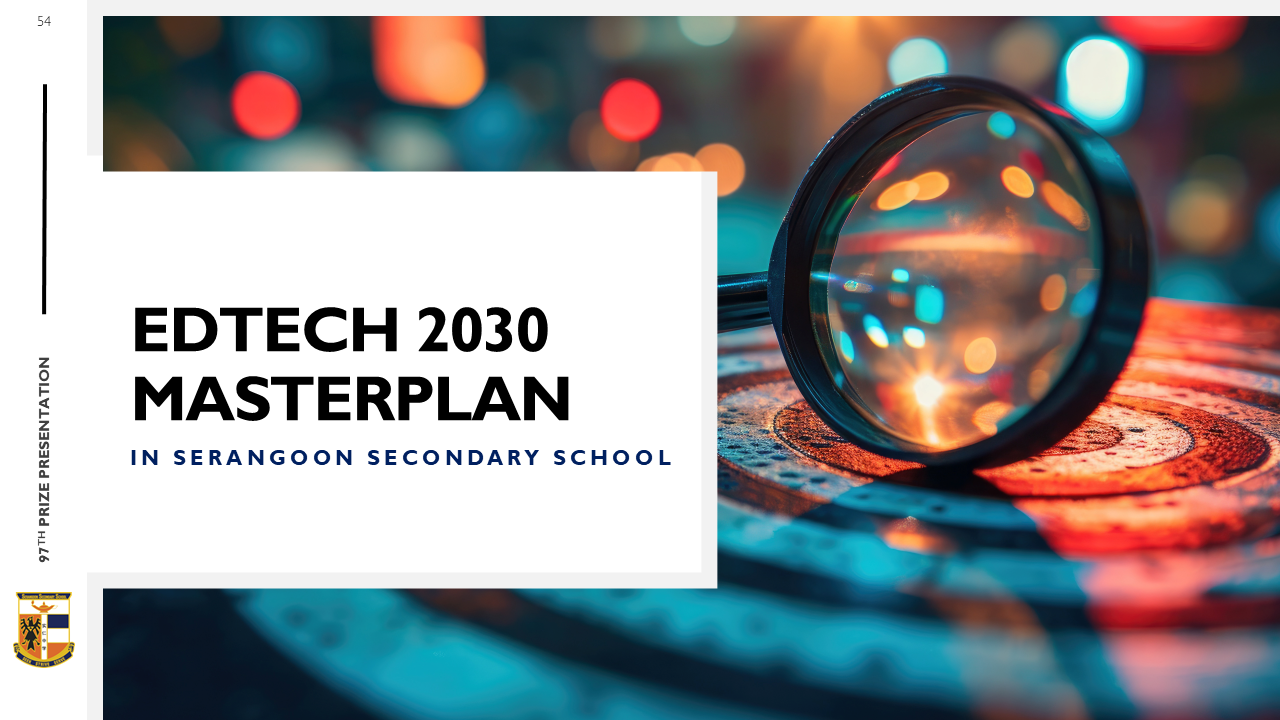
38 - At Serangoon Secondary School, our EdTech ecosystem is guided by the vision that “Teaching and learning can take place anytime, anywhere, with the appropriate digital device.” This vision drives a transformative shift from traditional teaching methods towards a digitally empowered learning experience. Through this ecosystem, students are enabled to rely primarily, if not entirely, on their Personal Learning Devices (PLDs) to support their educational journey, wherever the learning design is facilitated through EdTech-enabled approaches.
39 - Core Digital Learning Experience
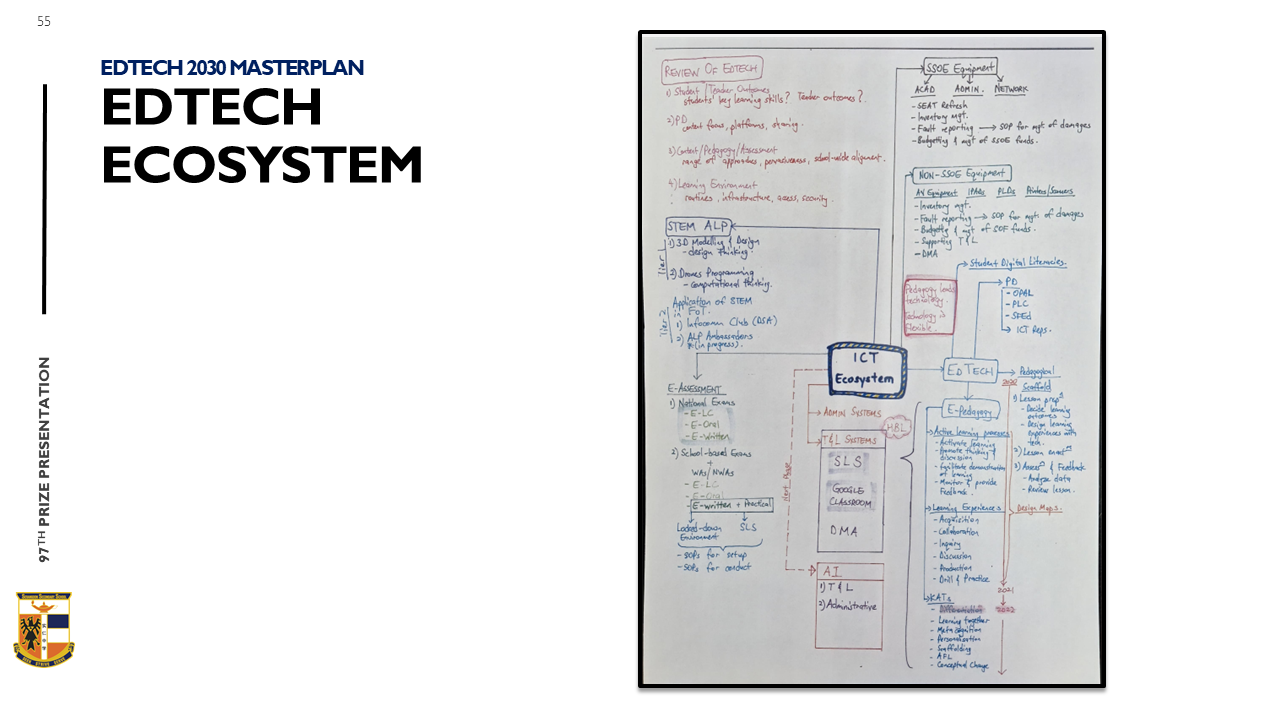
At the core of this ecosystem lies a device-centric learning environment that redefines how students engage with educational content. Learning is enhanced through active participation in pedagogically designed experiences, utilising platforms such as the Student Learning Space (SLS) and Google Classroom. These are grounded in sound educational principles, underpinned by the EdTech Pedagogical Scaffold (EdTech PS). Through this framework, we aim to nurture digitally empowered, future-ready learners who demonstrate the following attributes:
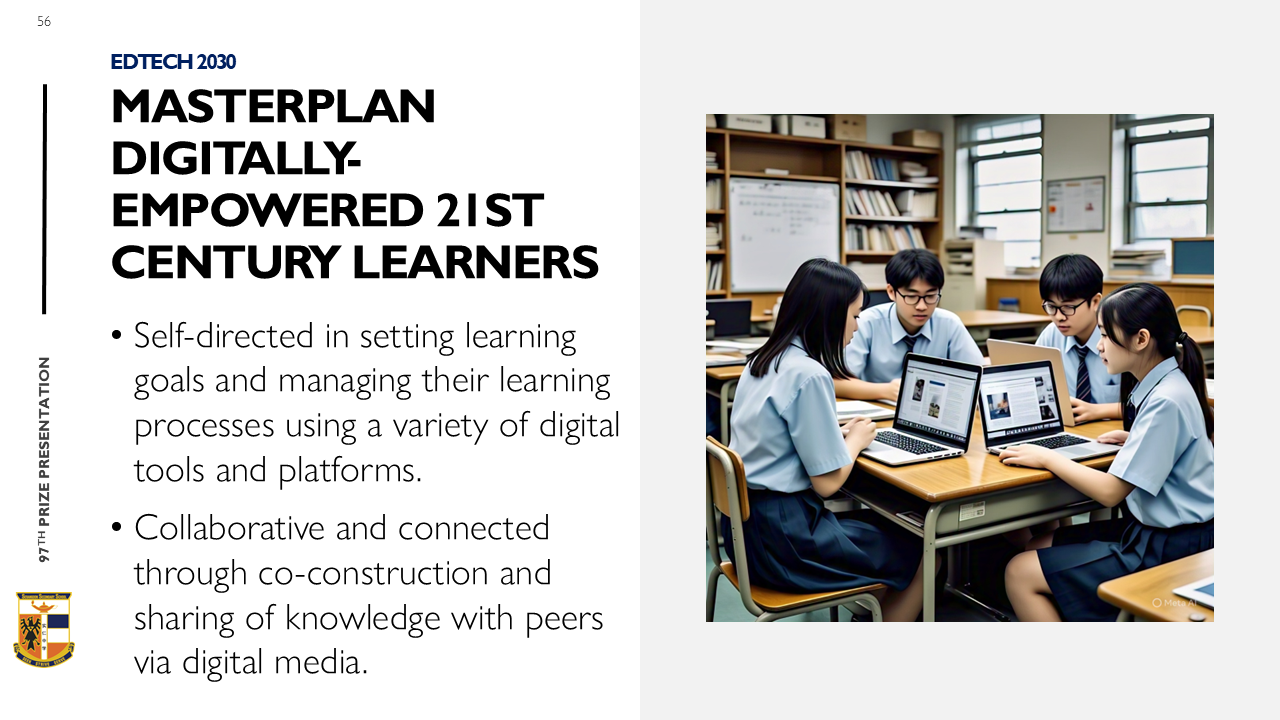
40 - Digitally-Empowered 21st Century Learners
The following will be captured in the slide:
• Self-directed in setting learning goals and managing their learning processes using a variety of digital tools and platforms. • Collaborative and connected through co-construction and sharing of knowledge with peers via digital media.
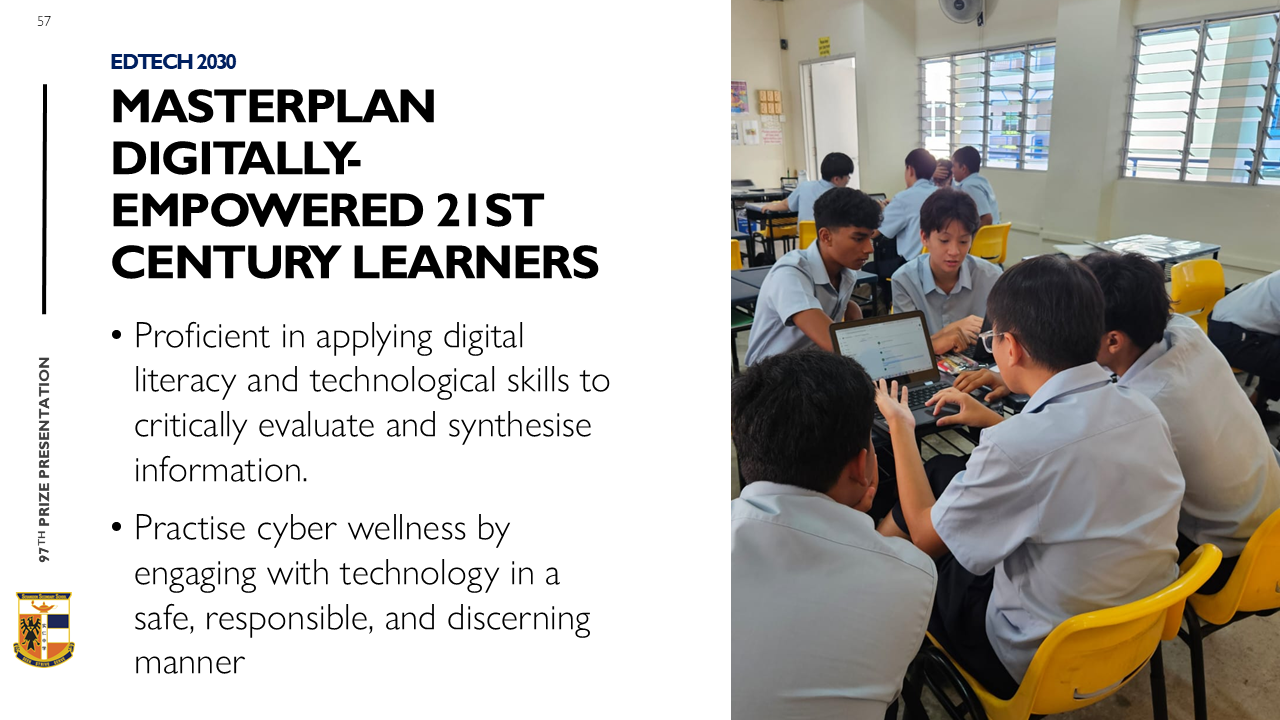
41 - Digitally Literate Individuals
The following will be captured in the slide:
• Proficient in applying digital literacy and technological skills to critically evaluate and synthesise information. • Practise cyber wellness by engaging with technology in a safe, responsible, and discerning manner.
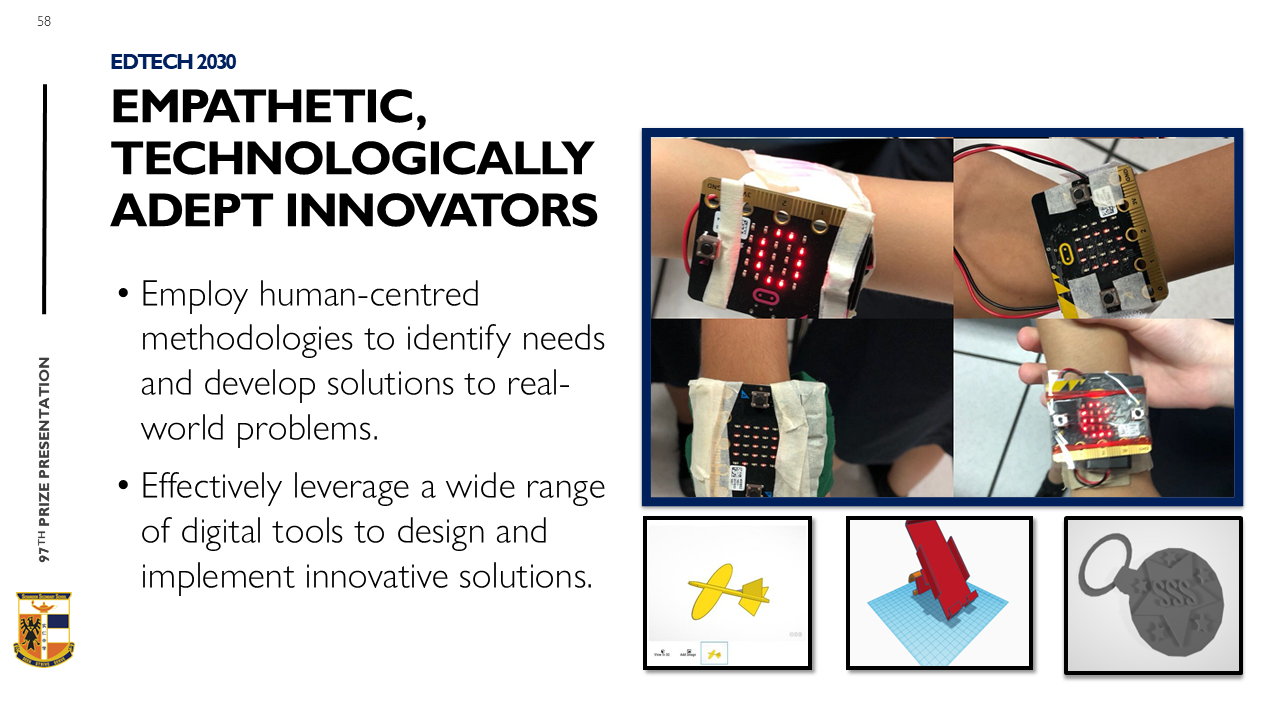
42 - Empathetic, Technologically Adept Innovators
The following will be captured in the slide:
• Employ human-centred methodologies to identify needs and develop solutions to real-world problems. • Effectively leverage a wide range of digital tools to design and implement innovative solutions.
Students develop these capabilities through technology-enhanced lessons involving digital note-taking and organisation, interactive annotations, real-time collaboration, time management using digital platforms, the cultivation of information literacy, and meaningful communication using PLDs.
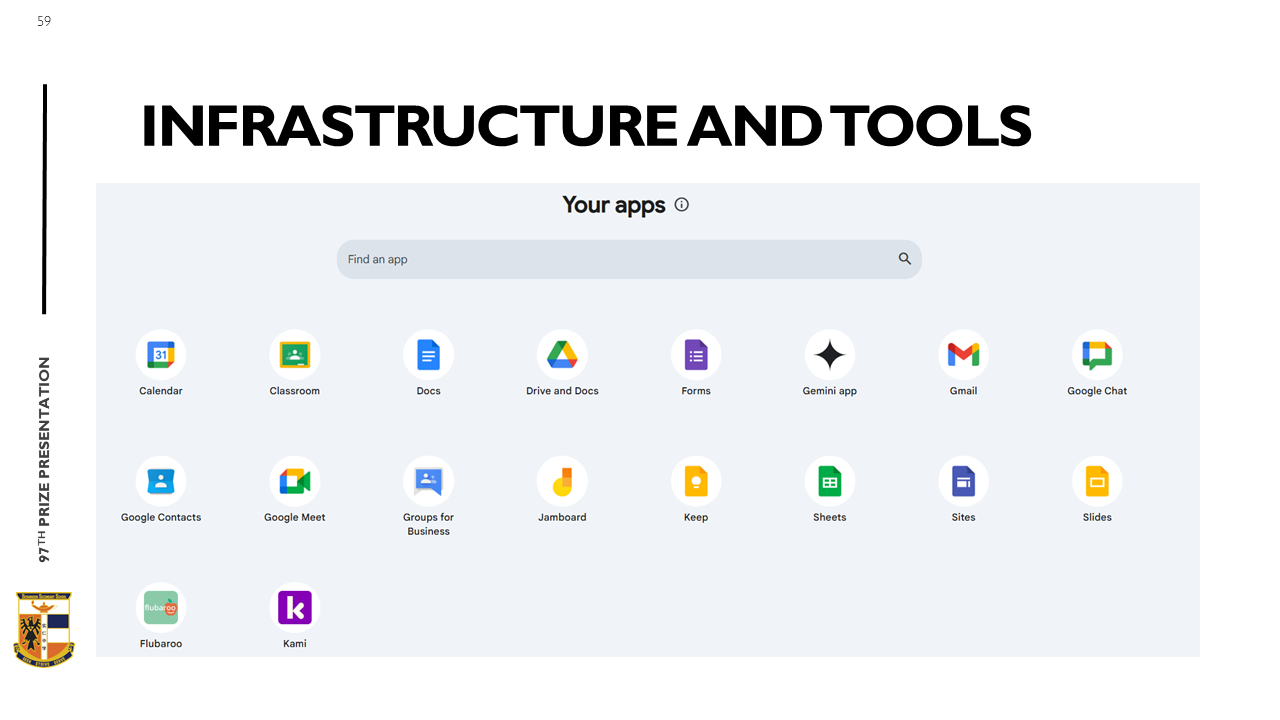
43 - Infrastructure and Tools
The foundation of our EdTech ecosystem is supported by robust infrastructure. Every student is issued a Personal Learning Device from Secondary 1. These devices are integrated with core platforms such as the SLS and Google Workspace, including Gmail, Google Calendar, Google Tasks, Google Drive, and other specialised applications for annotation and note-taking. This integrated suite ensures consistent and reliable access to learning materials and communication tools.
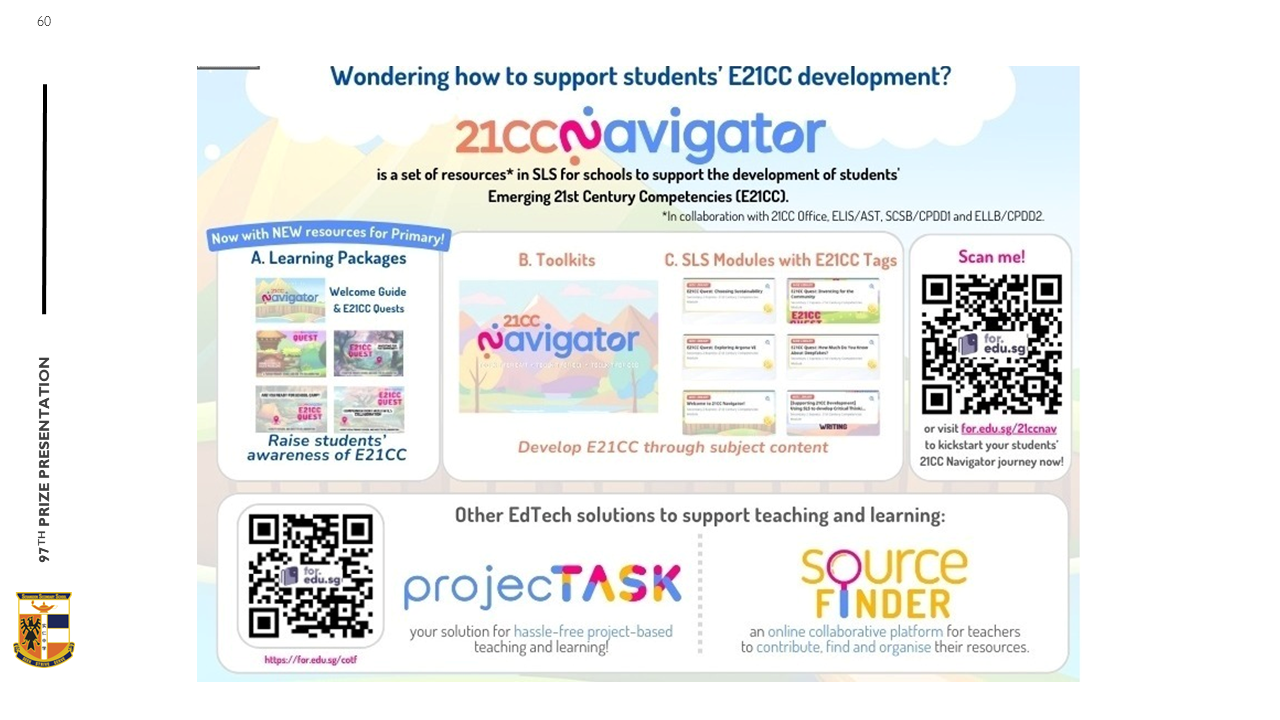
44 - Development of Digital Literacies:
Students will be systematically equipped with key digital literacies (DLTS) necessary for future readiness by leveraging efforts across the total curriculum to strengthen DLTS, and infusing DLTS into content and learning experiences across the total curriculum. The school also seeks to strengthen Cyber Wellness for students’ safe interaction with technology by establishing a Cyber Wellness strategy working with HOD/CCE.

**45 - Pedagogical Approaches **
As part of the Ministry of Education’s EdTech Masterplan 2030, the school will be adopting E-Pedagogy using a range of unique learning experiences and key applications of technology (KATs). This includes facilitating paperless learning experiences, encouraging digital content creation and curation, enabling real-time feedback and assessment, fostering interactive and collaborative learning activities, supporting self-directed learning opportunities, and creating personalised learning pathways for each student.
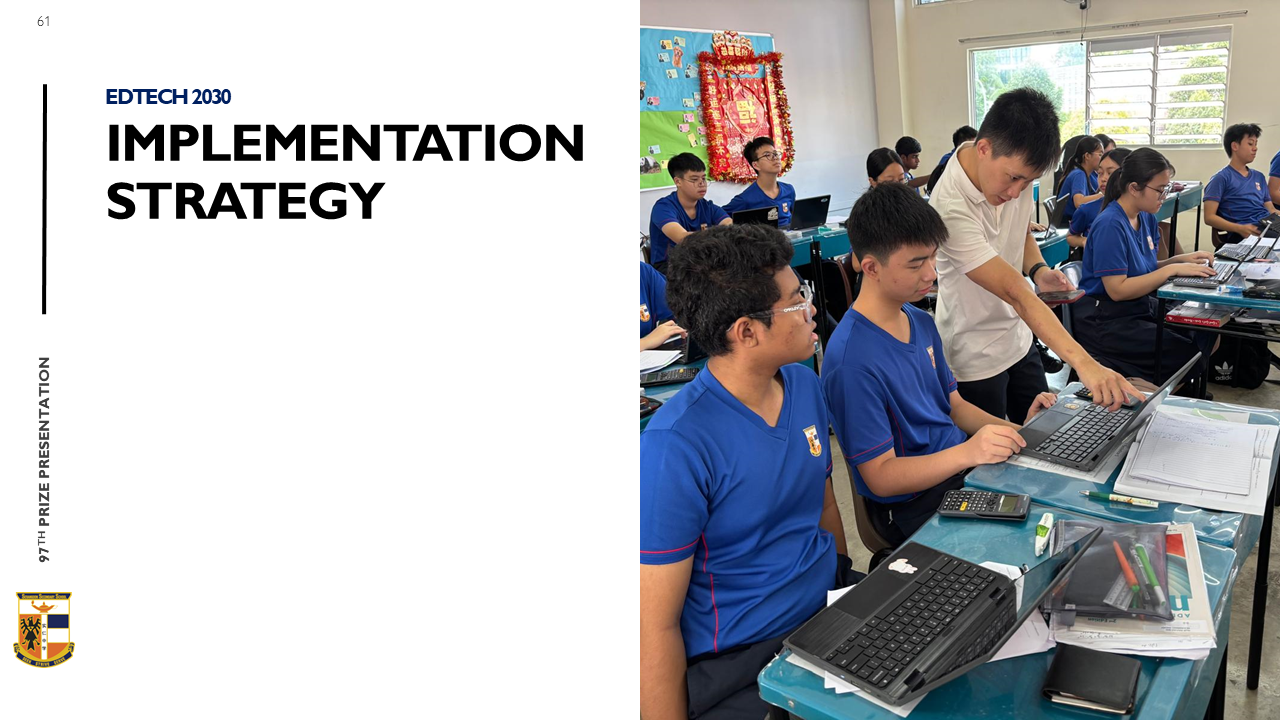
46 - Integration of Key 21st Century Competencies (21CC) Critical, Adaptive, and Inventive Thinking (CAIT) Our ecosystem nurtures higher-order thinking through digital artefact creation, self- and peer-assessment, digital portfolios, coding, and data analytics tasks. Communication, Collaboration, and Information Skills (CCI) Platforms such as SLS and Google Classroom provide extensive opportunities for students to refine their communication and collaboration skills. These are fostered through activities such as peer reviews, group projects, online discussions, and digital presentations. Regular opportunities for reflection and feedback are embedded to help students become more aware of their progress and areas for further growth in these competencies. The school also explore using technology as an enabler to develop and assess 21CC. In particular, to use tech-developed solutions e.g. 21CC Navigator to develop and assess complex and “hard to assess” skills.
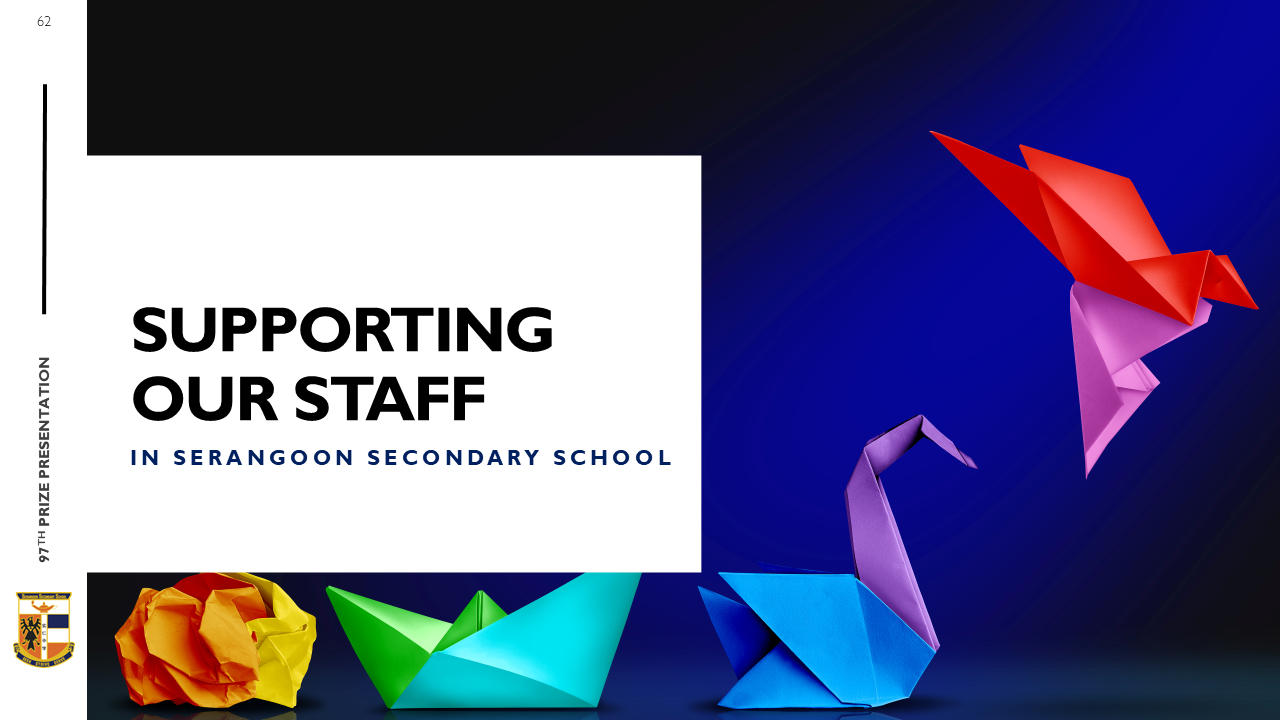
47 - Implementation Strategy
The implementation of our EdTech ecosystem is guided by a systematic approach involving PLD distribution and management, technical support, and professional development for staff. Teachers participate in continuous training, some of which are conducted in partnership with Educational Technology Division, to stay abreast of digital pedagogies, while students attend regular digital literacy workshops. The Teacher Leaders’ Council (TLC) is also designing SLS-based online modules that both meet the school’s training goals and immerse teachers in the learner’s experience—encouraging innovation and deeper EdTech integration. Feedback from all stakeholders informs ongoing improvements to ensure sustained relevance and impact.
This transformation empowers students to manage their learning effectively, collaborate meaningfully, and thrive in a dynamic digital world. Beyond equipping students for academic excellence, the ecosystem prepares them for future workplace expectations where digital fluency is essential.
48 - National Network Contribution (Not verbalised)
Serangoon Secondary School is committed to contributing to the Ministry of Education’s vision of a national EdTech network. We envision this through greater collaboration with parents to reinforce school-led EdTech efforts. This includes aligning home practices with the school’s cyber wellness strategies to ensure a consistent and supportive environment for students’ digital development.
F. Supporting our Staff

49 - To help our teachers reflect and grow continuously, the school has placed great emphasis on our teachers’ professional development.
Section F1: Staff Professional Development
50 - In 2023, we have established the Teacher Leaders Council (TLC), comprising our Senior Teachers.
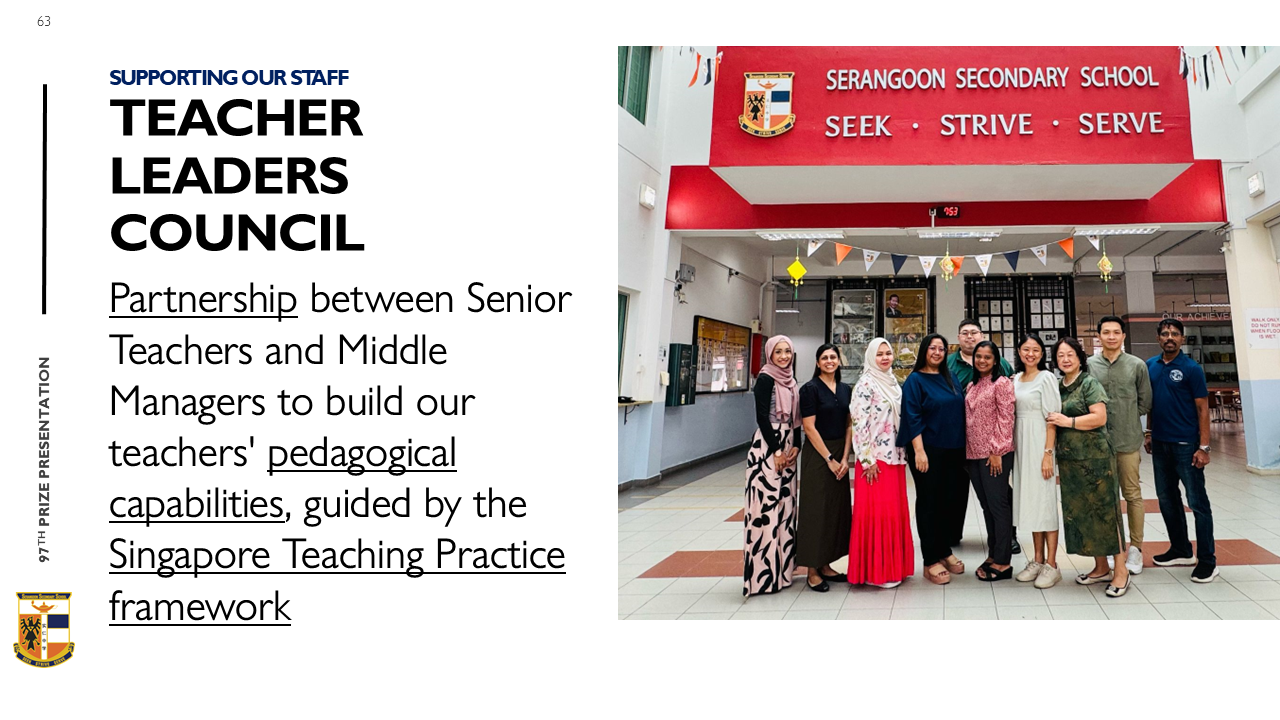
The TLC mounts various platforms for the sharing of expertise, mentoring and driving innovation in teaching and learning. To do so effectively, the TLC fosters strong collaborative relationships between Middle Managers and Teacher Leaders. This partnership has been instrumental in building our teachers’ pedagogical capabilities, guided by the Singapore Teaching Practice framework. This support system allows both expertise and experience to flow freely between our educational leaders.
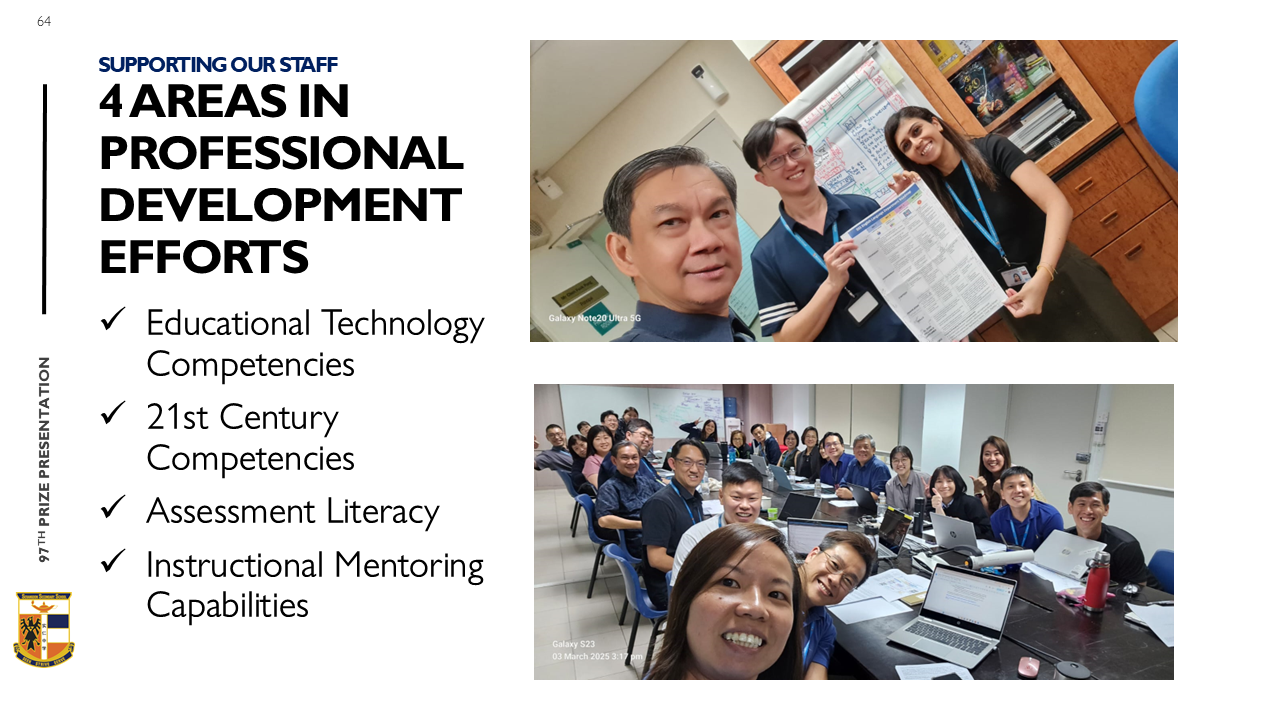
51 - Our professional development strategy aligns closely with both our Desired Outcomes of Education and our Future of Learning initiatives. We’ve focused on four key areas when mounting our professional development efforts.
52 - First, we are investing heavily in Educational Technology competencies, enabling our teachers to harness digital tools effectively in their classrooms. Secondly, in the development of 21st Century Competencies, to equip our teachers to nurture future-ready students who can think critically, collaborate effectively, and communicate confidently. Third, we’ve strengthened our teachers’ Assessment Literacy, enabling them to better understand and implement various assessment methods that support learning rather than merely measuring it. Finally, we’ve enhanced our Instructional Mentoring capabilities, creating a sustainable cycle of professional growth where experienced educators guide and support their colleagues.
Section F2: FWA
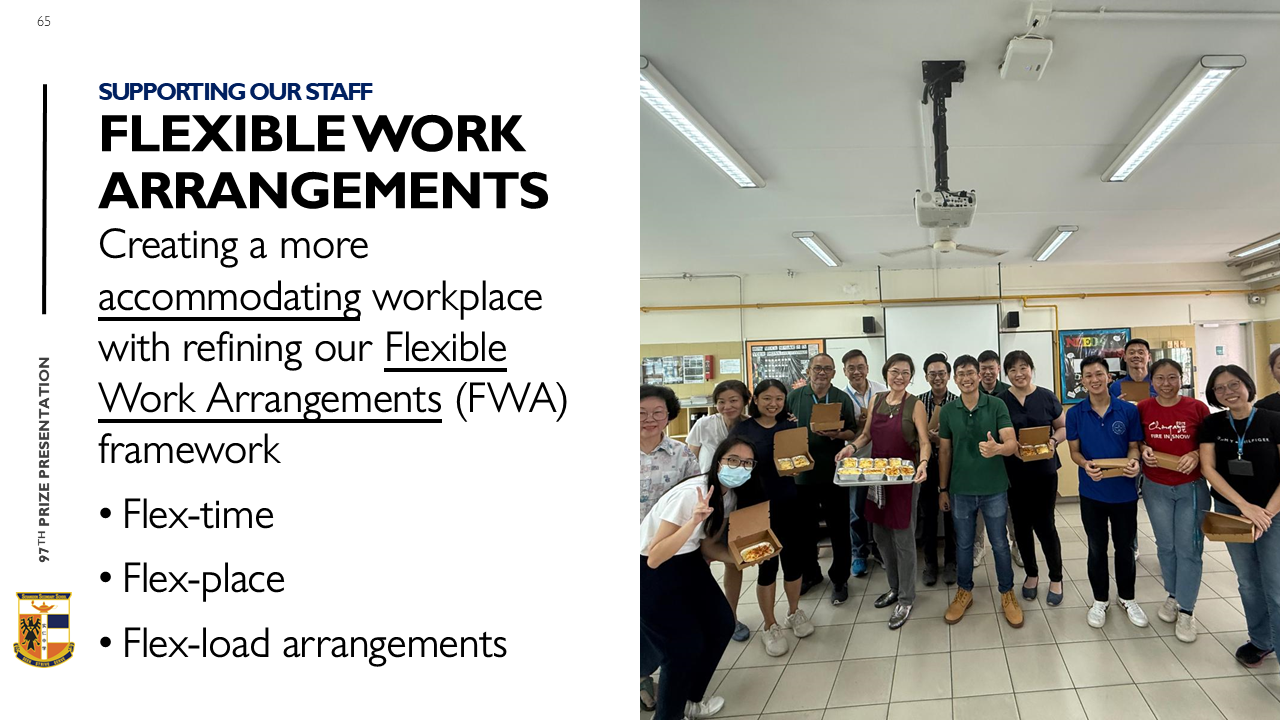
53 - Teaching is more than just a profession; it’s a calling that demands dedication, energy, and time. We understand that our educators and staff members also have personal lives, family commitments, and different needs at various life stages. This recognition has driven our commitment to implementing and continuously refining our Flexible Work Arrangements (FWA).
54 - Over the past year, we’ve made significant strides in creating a more accommodating workplace. In line with the Ministry of Education’s (MOE) commitment to supporting staff through various life stages, our FWA framework encompasses flex-time, flex-place, and flex-load arrangements, all designed to support staff while ensuring we maintain our high standards of education and student care.
55 - I’m particularly pleased with how we’ve managed to integrate flexibility into our daily operations. Our timetabling process now considers personal circumstances where possible. We have successfully implemented home-based work during specific periods, for our staff to better balance their professional and personal responsibilities more effectively.
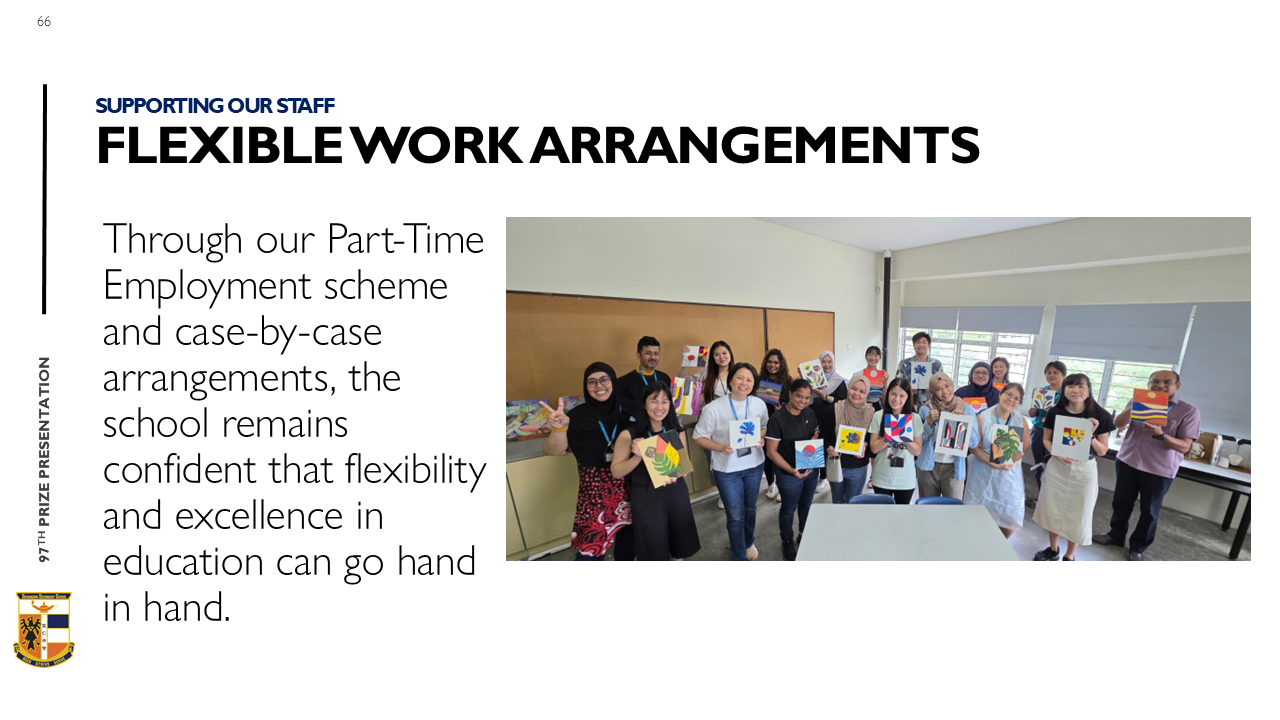
56 - The following will be captured in the slide:
Through our Part-Time Employment scheme and case-by-case arrangements, the school remains confident that flexibility and excellence in education can go hand in hand.
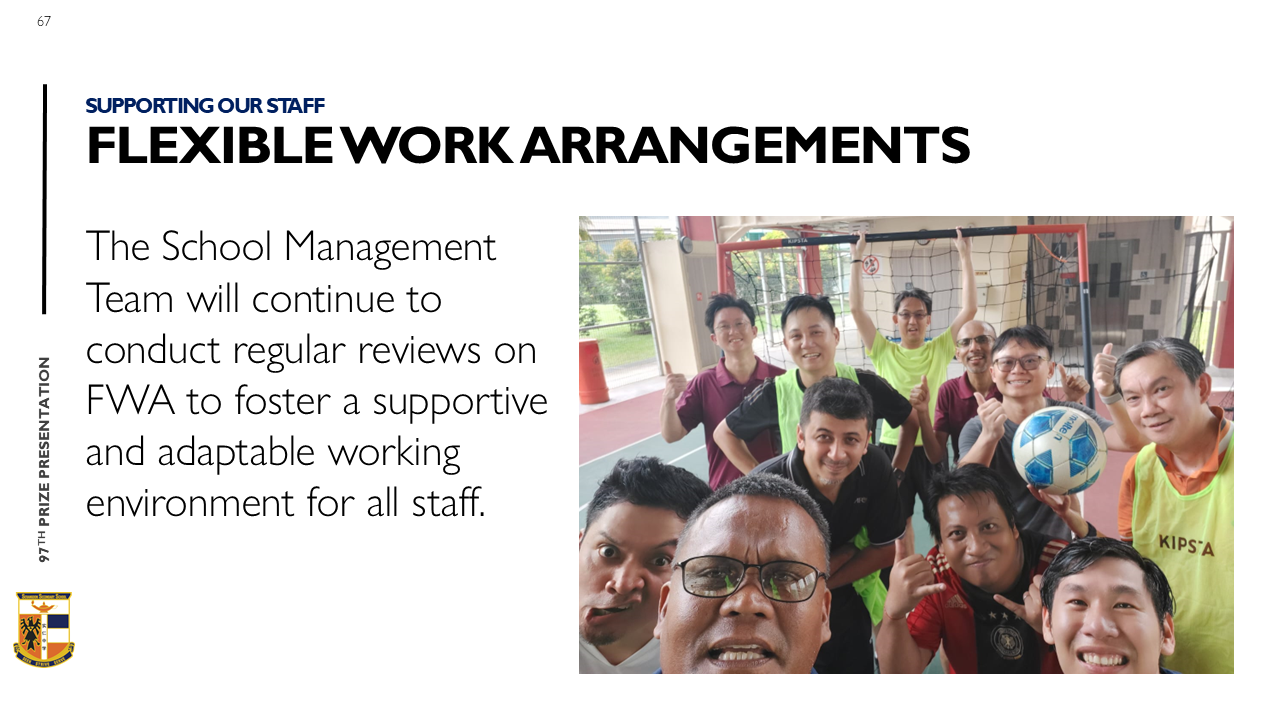
The following will be captured in the slide:
57 - The School Management Team will continue to conduct regular reviews on FWA to foster a supportive and adaptable working environment for all staff.
G. Building and Infrastructure
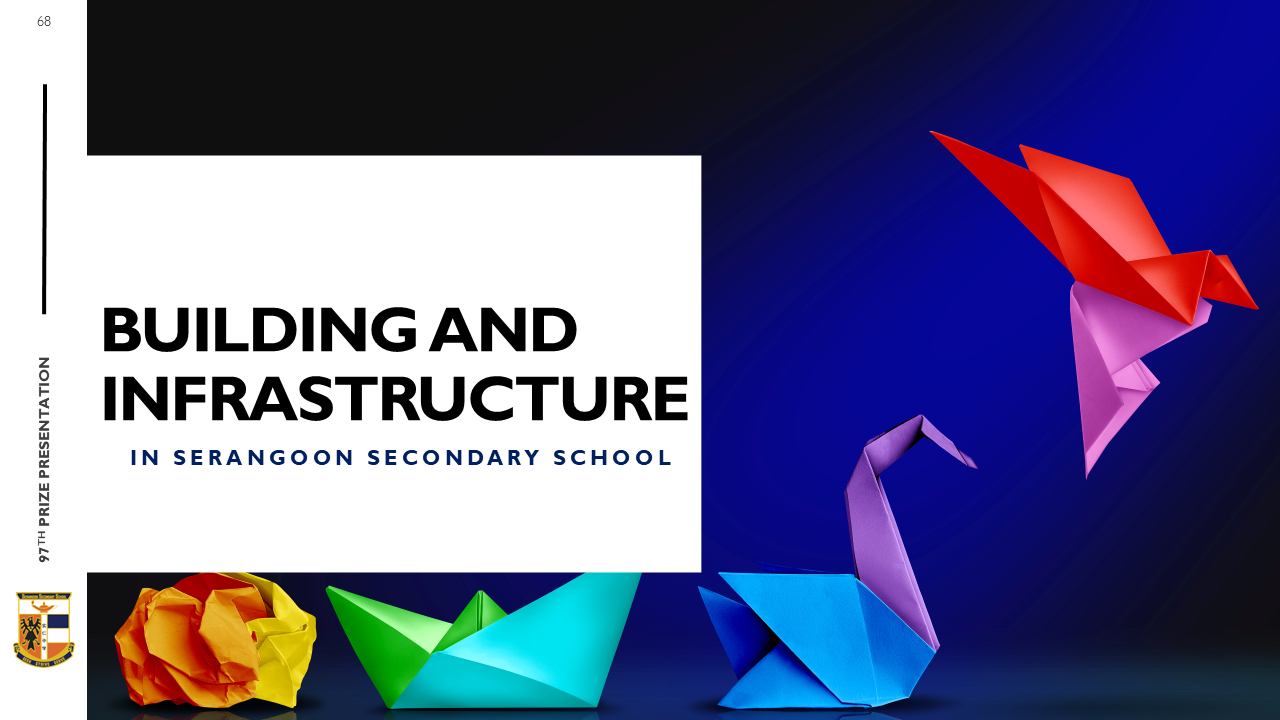
58 - As part of our ongoing efforts to provide the best possible education for our students, I am excited to announce a series of infrastructure-upgrading projects. These enhancements will significantly improve the teaching and learning environment for all staff and students. The upgrading works include:
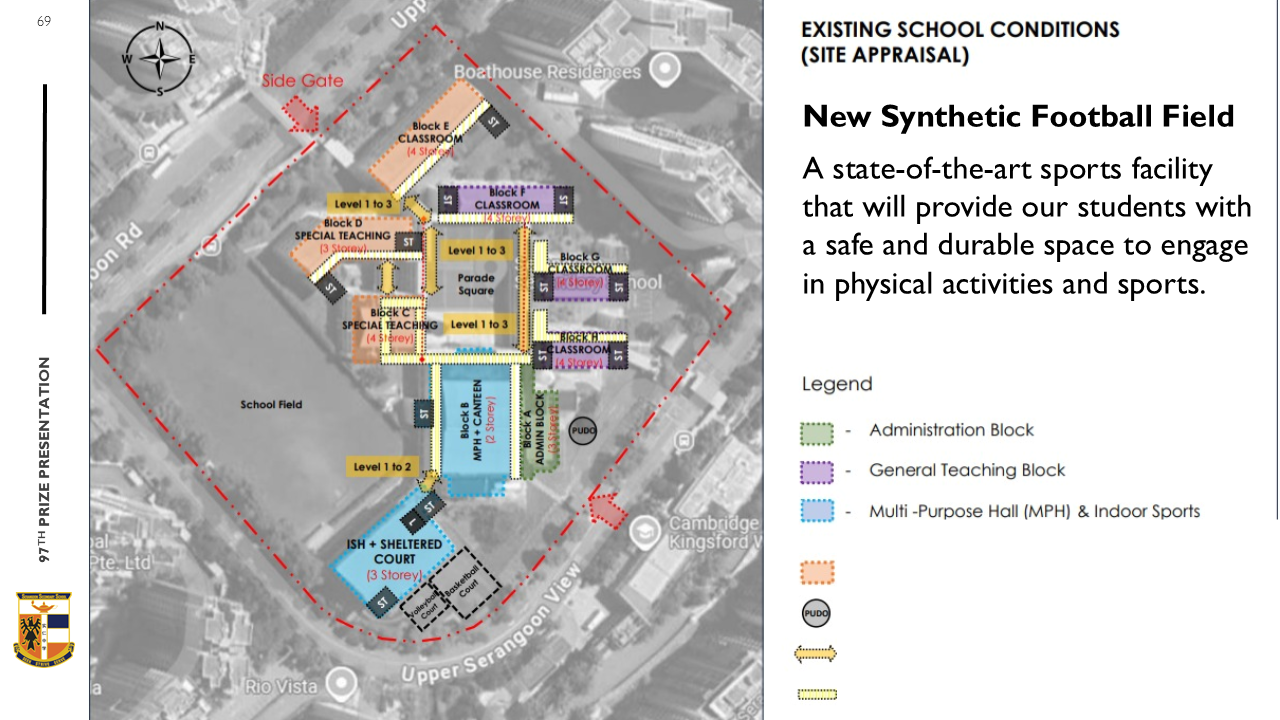
• A new Synthetic Football Field:
The following will be captured in the slide:
A state-of-the-art sports facility that will provide our students with a safe and durable space to engage in physical activities and sports.
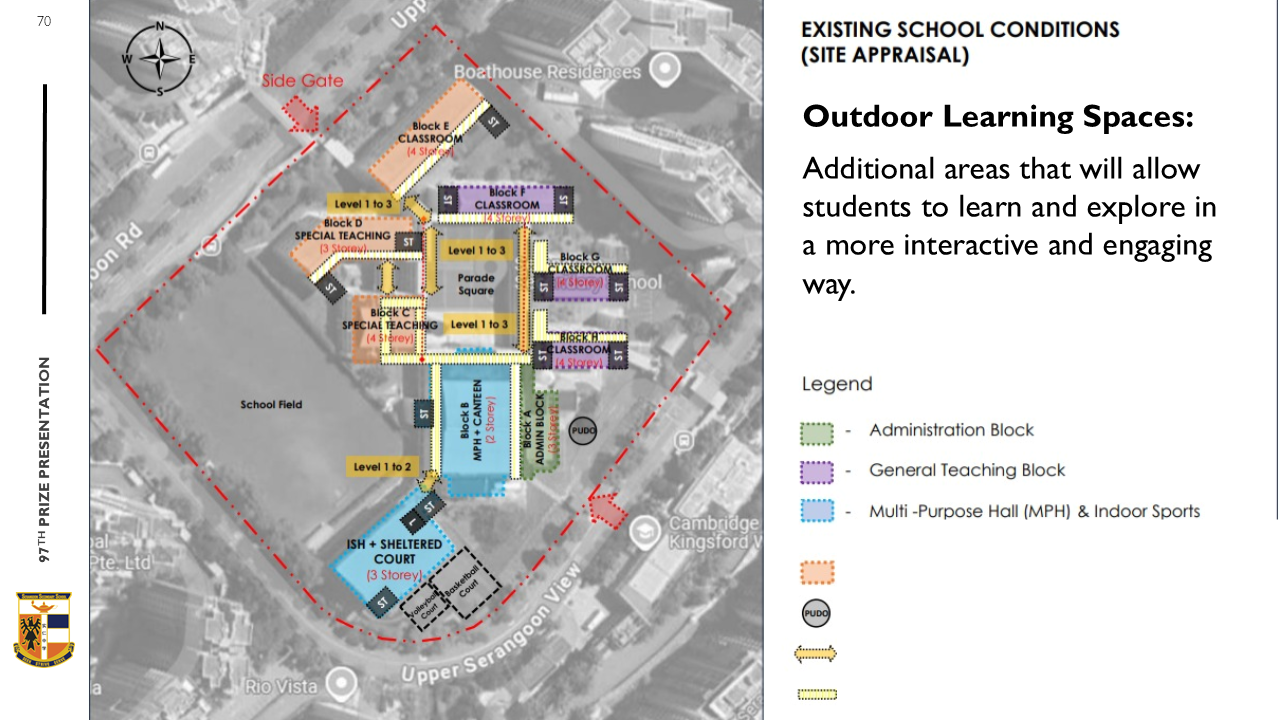
• Outdoor Learning Spaces:
The following will be captured in the slide:
Additional areas that will allow students to learn and explore in a more interactive and engaging way.

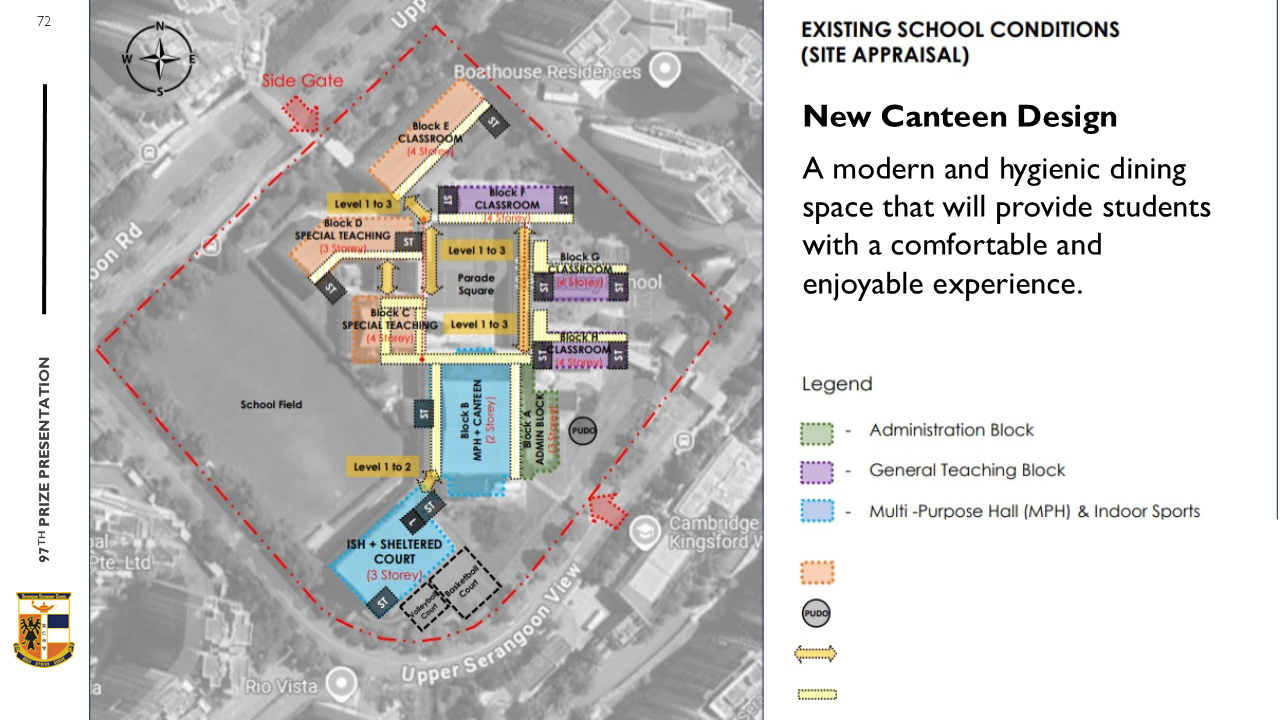
• New Canteen Design:
The following will be captured in the slide: • A modern and hygienic dining space that will provide students with a comfortable and enjoyable experience.
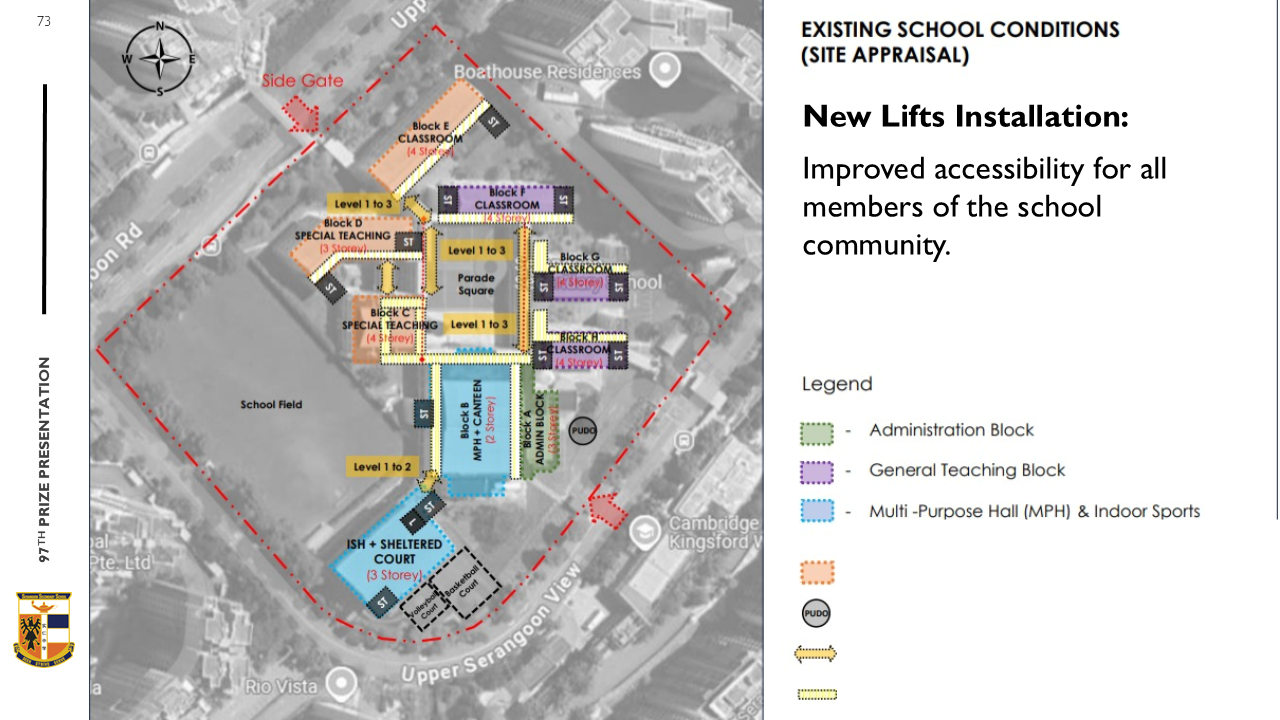
• New Lifts Installation:
The following will be captured in the slide:
• Improved accessibility for all members of the school community.
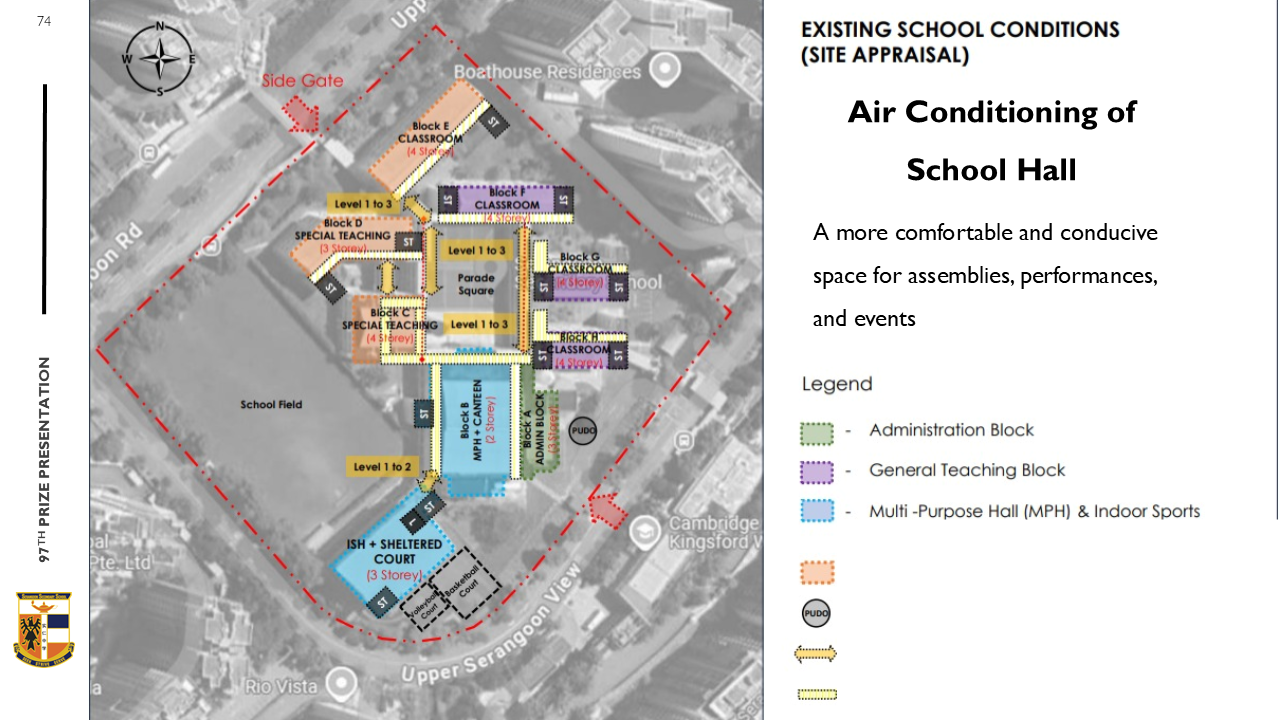
• Air Conditioning of School Hall: A more comfortable and conducive space for assemblies, performances, and events.
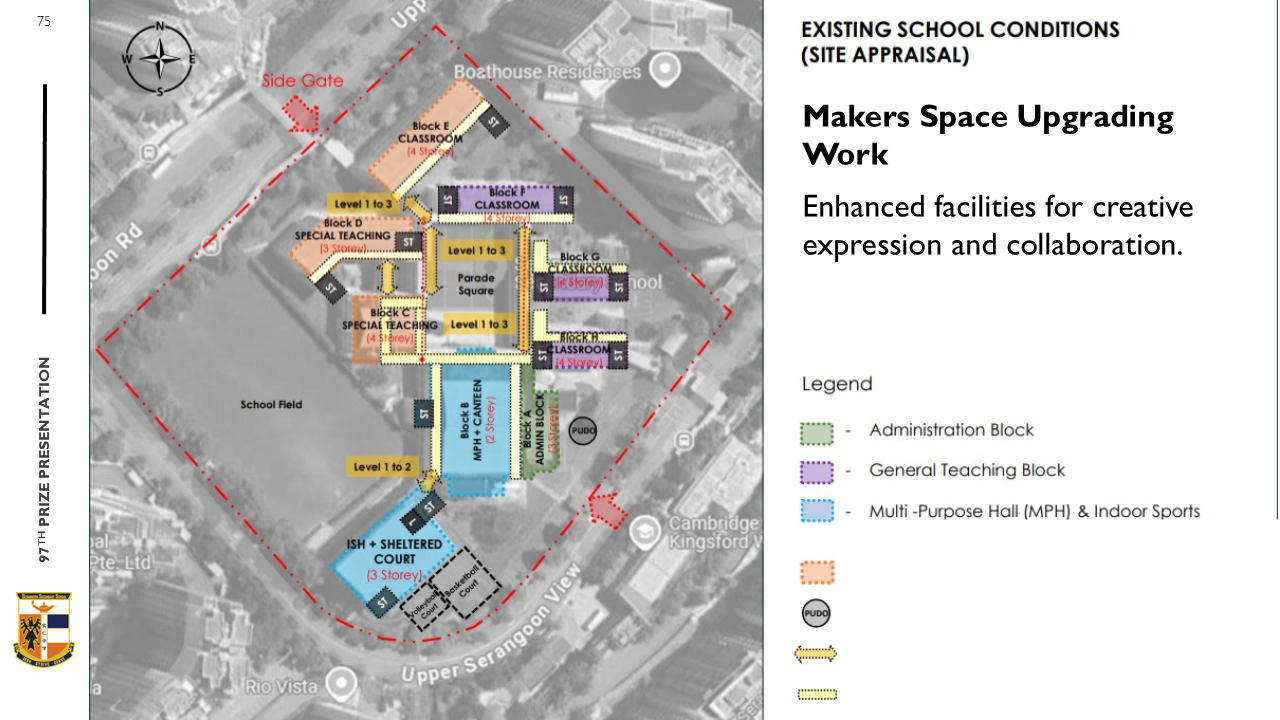
• Makers Space Upgrading Work:
The following will be captured in the slide:
• Enhanced facilities for creative expression and collaboration.
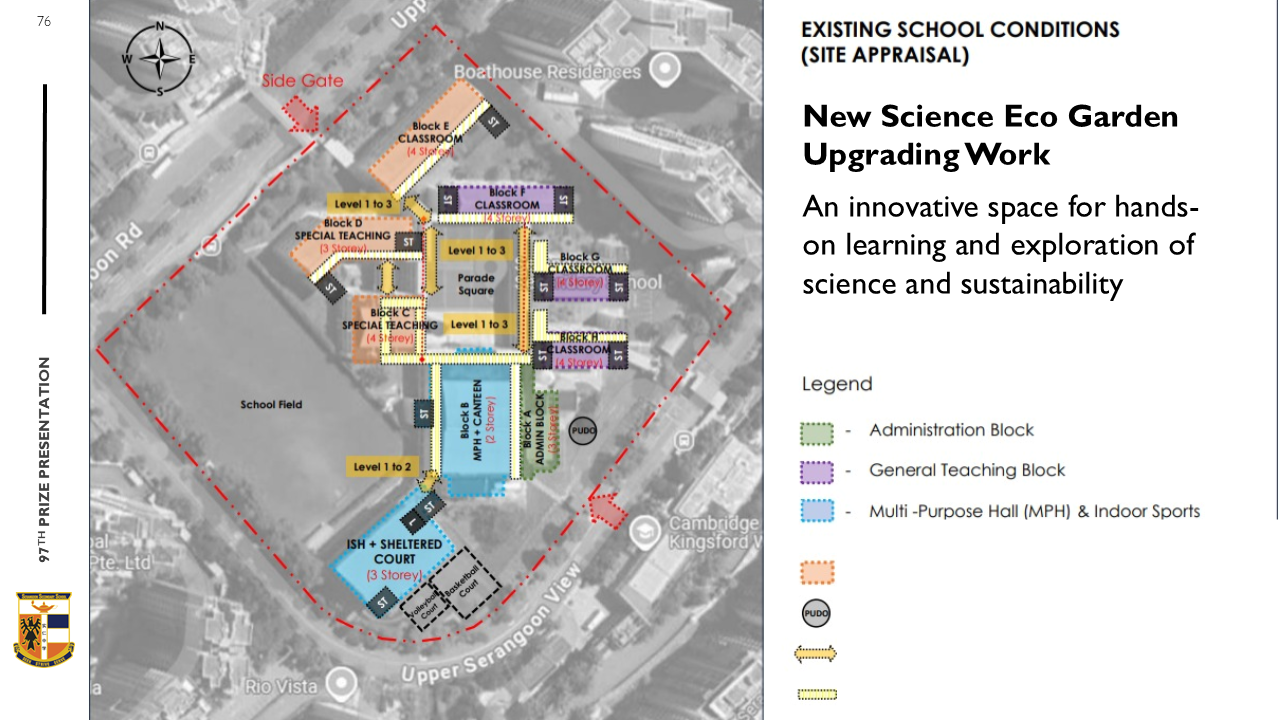
• New Science Eco Garden Upgrading Work: The following will be captured in the slide: • An innovative space for hands-on learning and exploration of science and sustainability
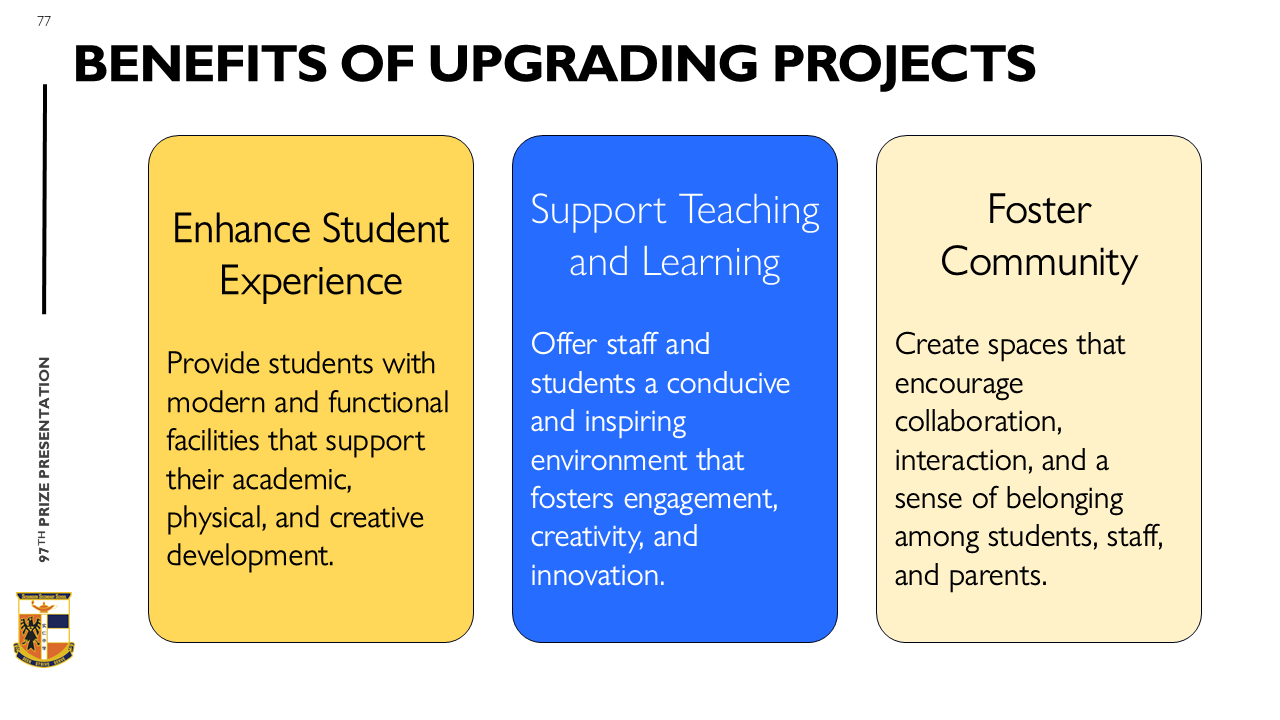
59 - These upgrading projects will make our school a more vibrant and exciting place to learn and teach. They will:
• Enhance Student Experience: The following will be captured in the slide: • Provide students with modern and functional facilities that support their academic, physical, and creative development. • Support Teaching and Learning: The following will be captured in the slide: • Offer staff and students a conducive and inspiring environment that fosters engagement, creativity, and innovation. 60 - Foster Community: The following will be captured in the slide: • Create spaces that encourage collaboration, interaction, and a sense of belonging among students, staff, and parents.
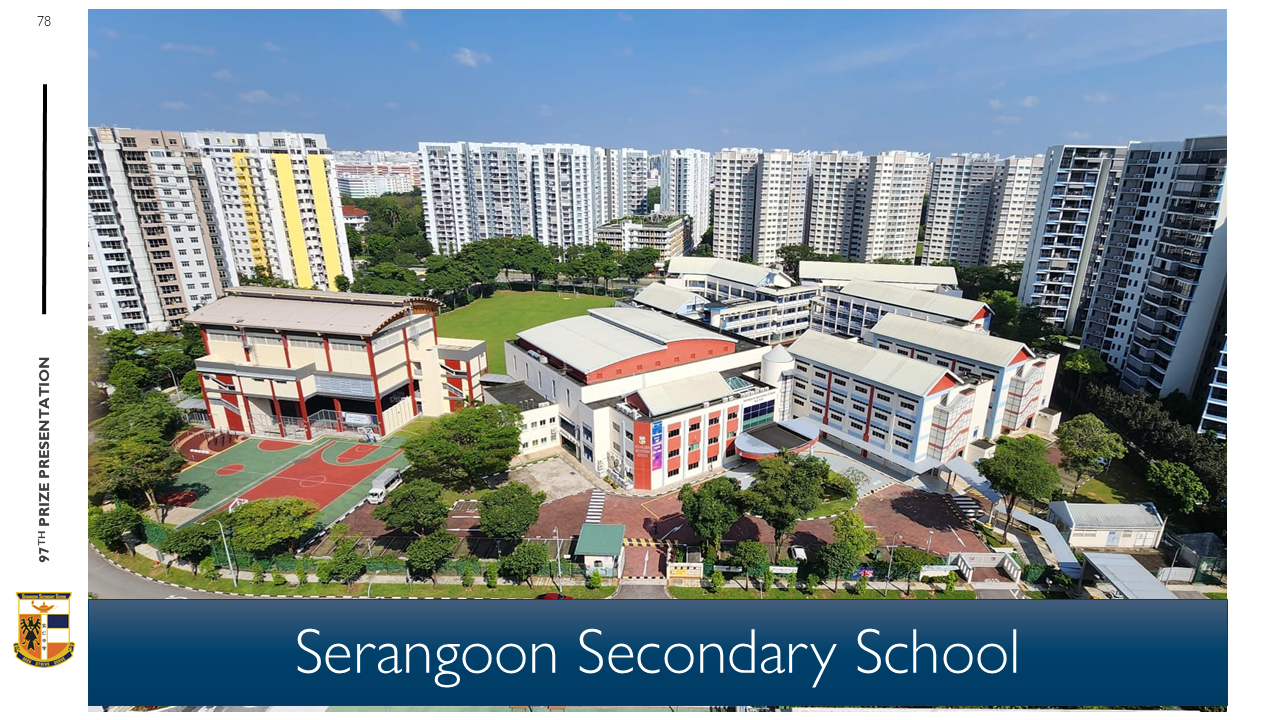
61 - As we embark on our infrastructure enhancement projects, we remain cognisant that these are also powerful platforms for student leadership development. As representatives of the student population, the student leaders are actively involved in the design considerations for our toilets and canteen renovations. They are empowered to be the voice of their peers and have a say in shaping the spaces they use daily. Their insights will not only lead to more user-centric designs but also deepened their sense of belonging to our school.
This ownership transforms our school from just a place of learning into a true home that we can all be genuinely proud of.
62 - We are thrilled to embark on these upgrading projects, which will undoubtedly take our school to the next level and usher in the future of learning. We believe that these enhancements will have a positive impact on our students’ educational journey and overall school experience.
H. Our Partnerships
Section H1: Self-Helf Groups
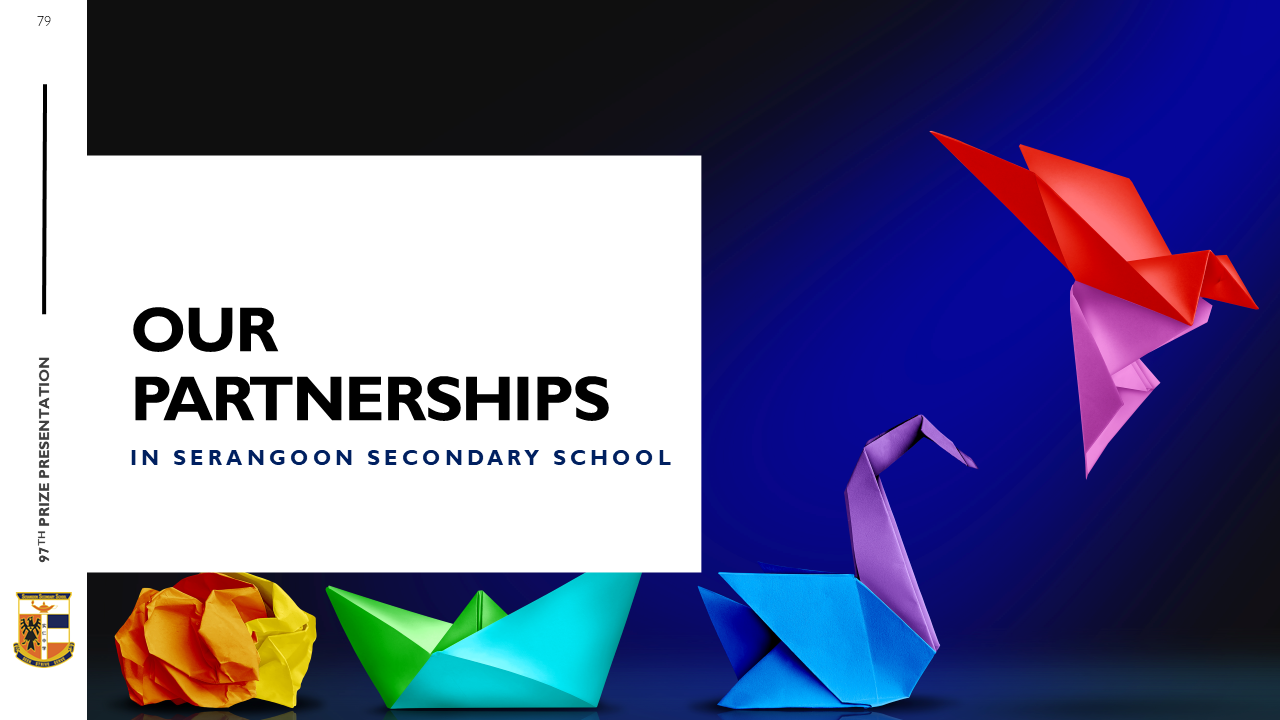
63 - Our commitment to building a robust support network for our students has continued to progress.
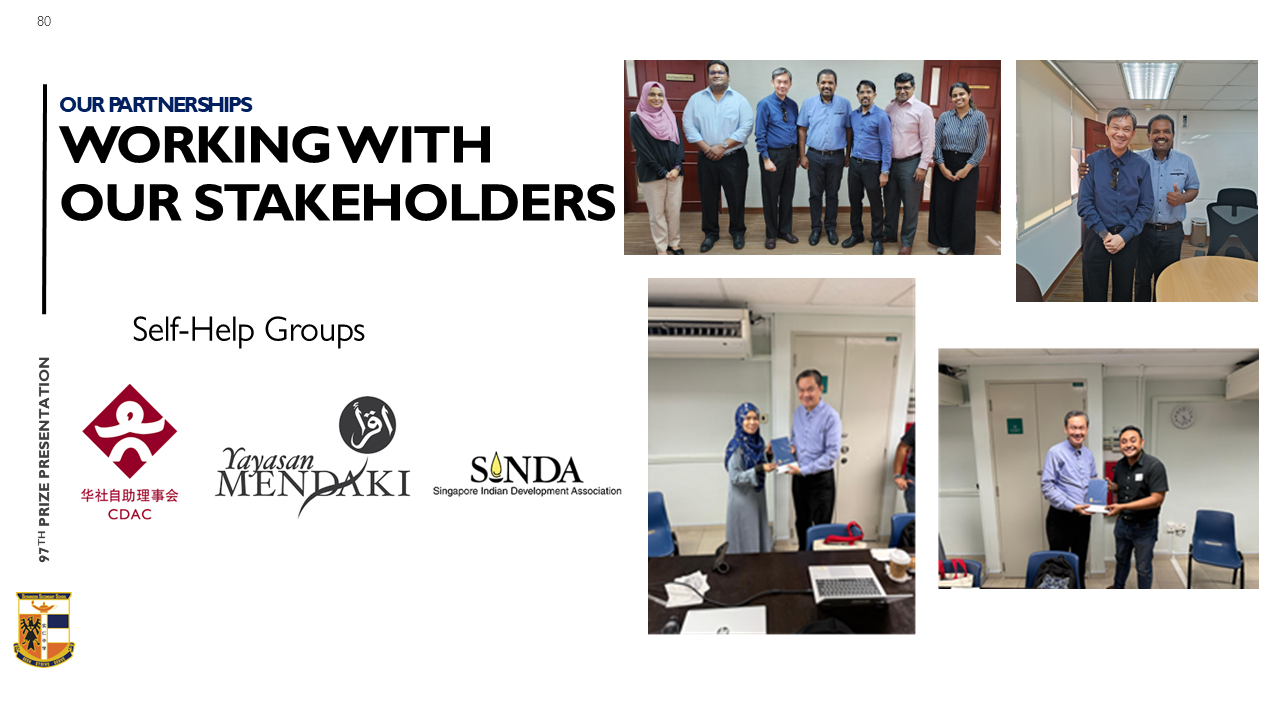
In 2024, we forged vital partnerships with CDAC, SINDA, and MENDAKI, expanding our capacity to support students through their diverse programmes. I’m particularly pleased to share that through our enhanced collaboration with SINDA, we successfully established a centre within our campus in January this year, serving not just our students but youths across the northeast region. In addition, we are partnering MENDAKI and CDAC to further support our students by tapping into their resources and expertise to provide targeted support—be it in academic, life skills development, or financial assistance. These partnerships allow us to extend a stronger safety net for our students, particularly those who may benefit from additional guidance. MENDAKI and CDAC (collaboration in brief) (to insert photo with SINDA CEO, two photos with MENDAKI with 3 logos and include the title for partnership for success: one slide)
Section H2: PSG
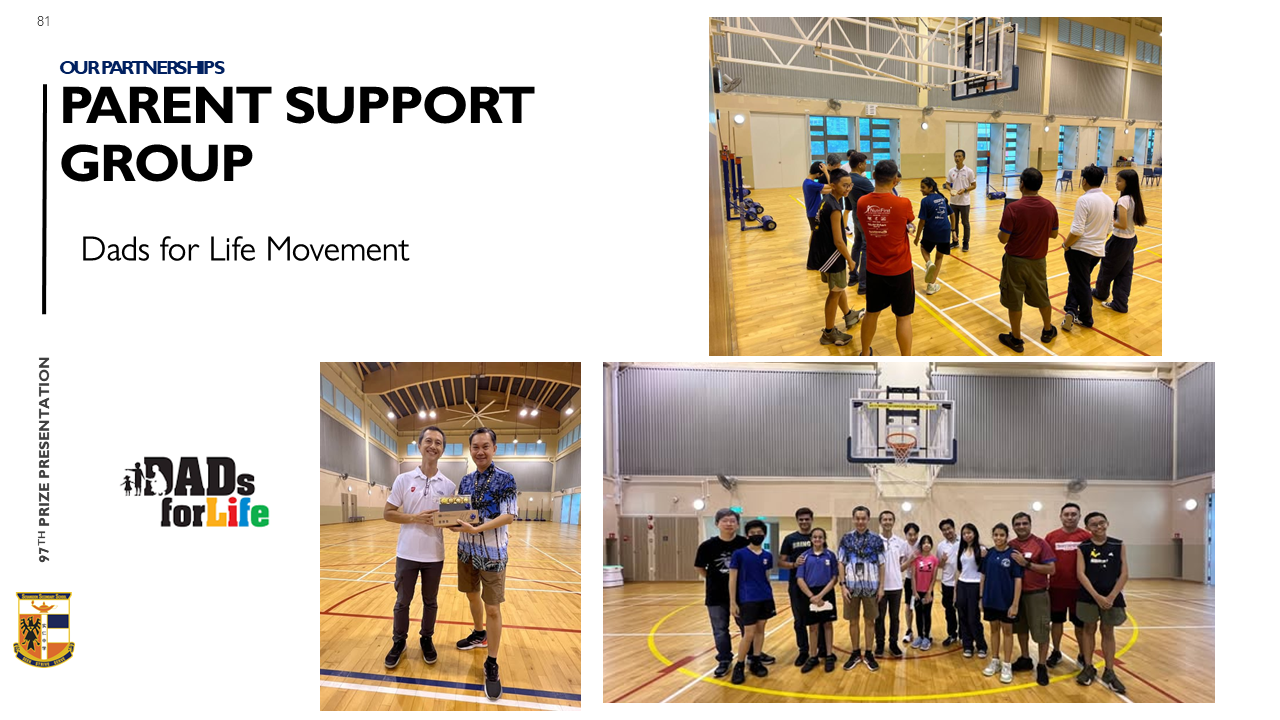
64 - The strength of our school community continues to grow through our dynamic Parent Support Group and alumni network. Working closely with Dads for Life since 2023, we have introduced impactful initiatives like the Navigating Teen Years talk and father-child bonding activities. These programmes have created meaningful opportunities for parents, especially fathers, to actively participate in their children’s educational journey.
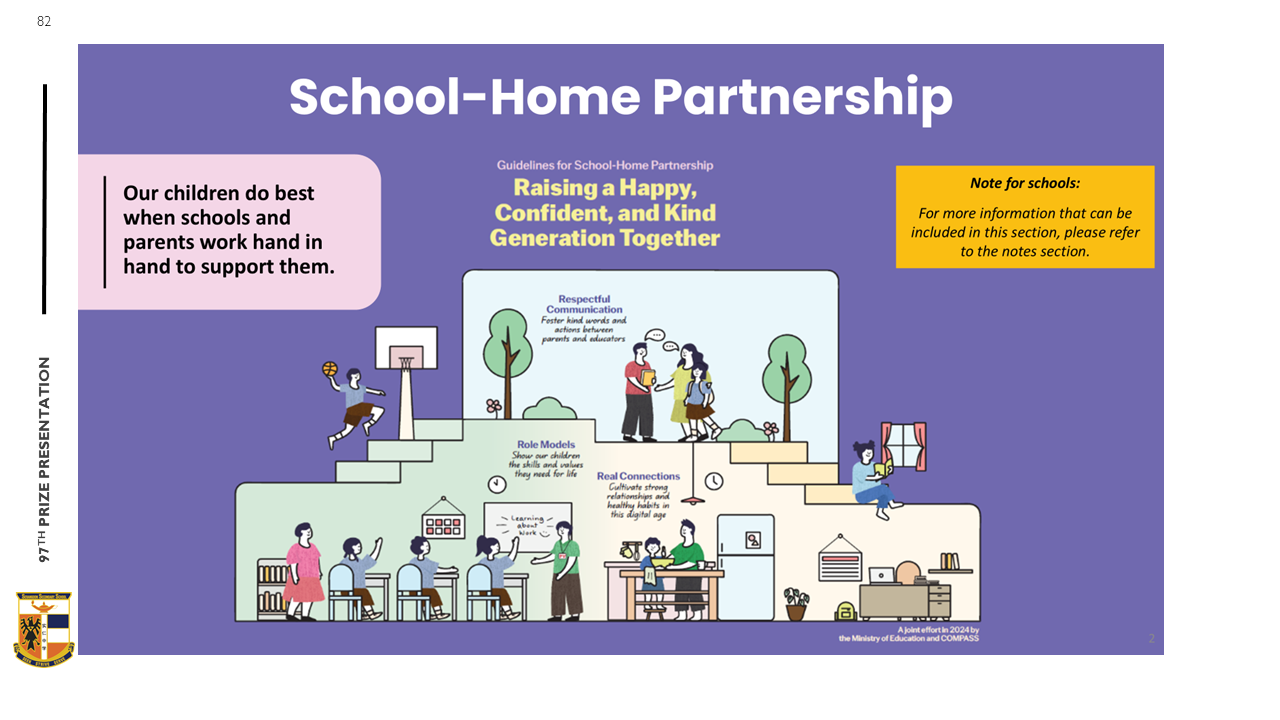
65 - These partnerships reflect our belief that education extends beyond the classroom, and that strong community support is essential for our students’ success.
66 - Next, I am delighted to share an important development in our school-home partnership journey. Working hand in hand with our parent community, we have co-constructed meaningful guidelines across three key areas that will strengthen how we work together in nurturing our StaRs. This collaborative approach reflects our belief that the best outcomes emerge when schools and families unite with a shared understanding and common purpose.
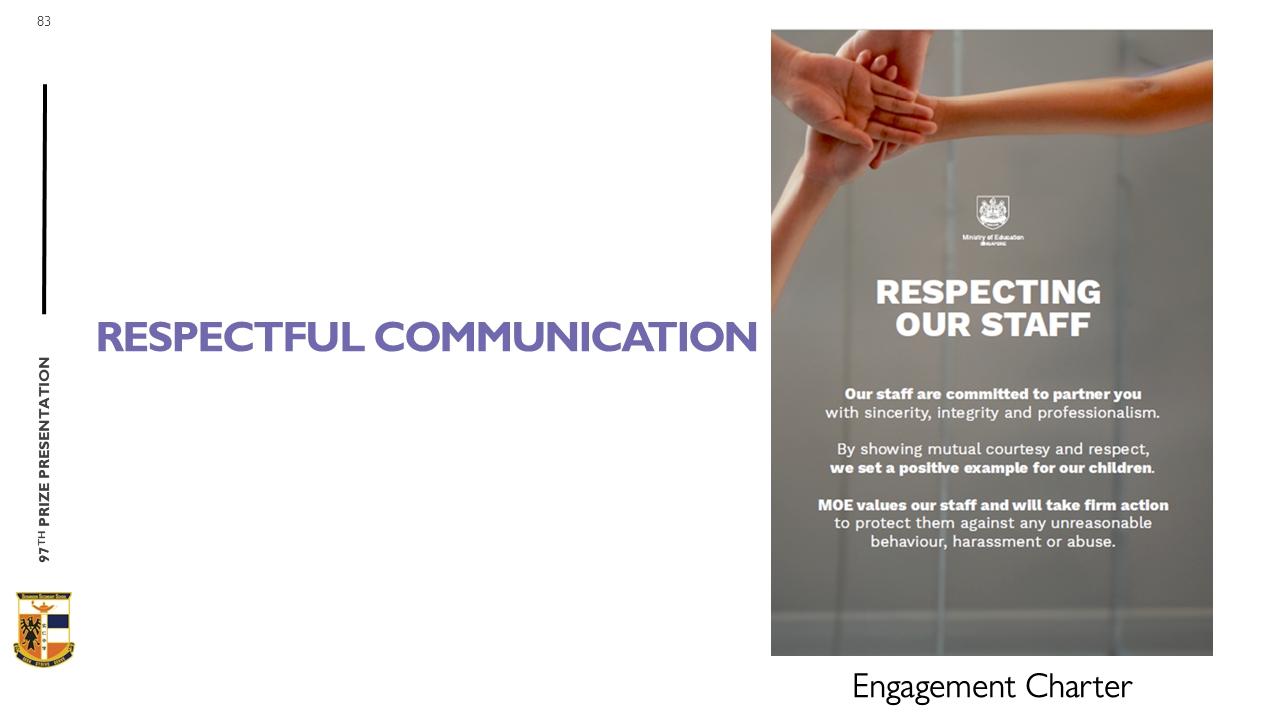
67 - First, Respectful Communication. Guided by the MOE Engagement Charter as shared by our minister, we are focused on creating meaningful dialogue that serves our children’s best interests. We encourage open conversations where both educators and parents listen to and truly understand each other’s perspectives about each and every child. To maintain professional boundaries and work-life harmony, we’ve established clear communication channels and timeframes. Our teachers use official platforms to share updates and respond to queries during working hours. This structure ensures that communication remains effective while respecting everyone’s personal time and space.
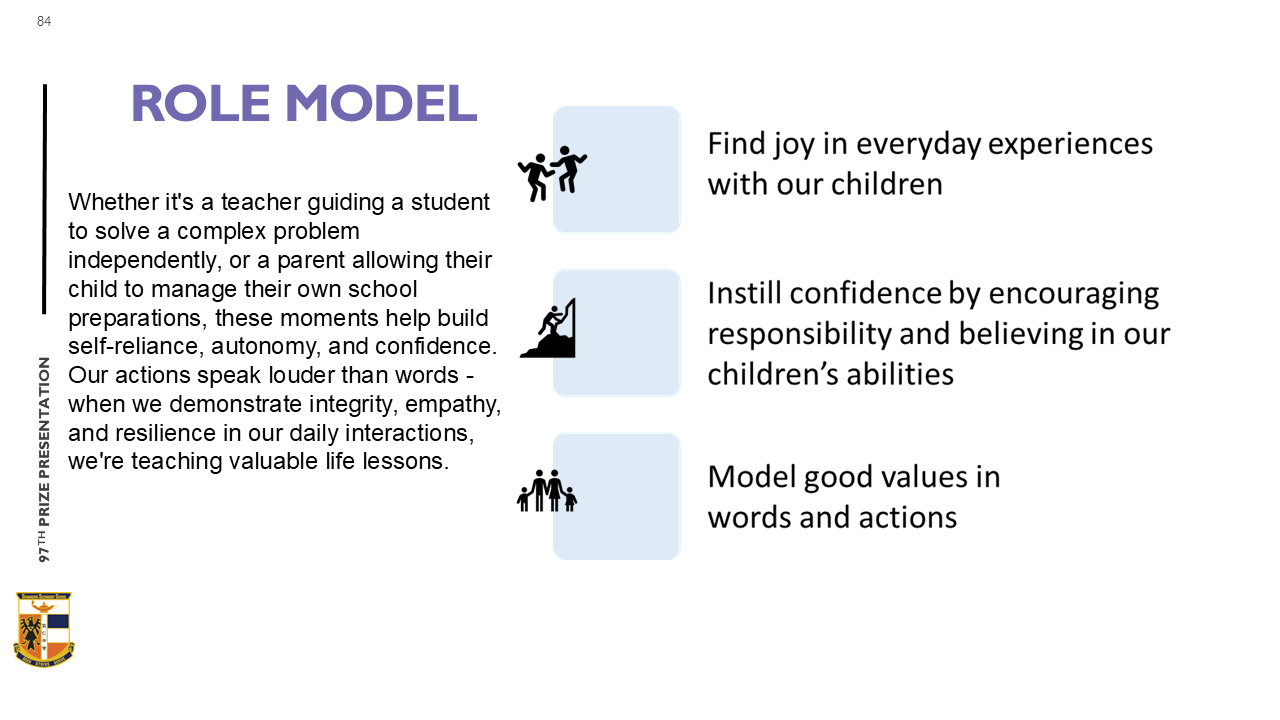
68 - Second, we focus on being Role Models. This role extends far beyond academic guidance. We believe in finding joy in everyday learning experiences with our children. When adults show enthusiasm for learning and resilience in facing challenges, children readily absorb these positive attitudes. We aim to build confidence in our students not by doing things for them, but by believing in their abilities and encouraging them to take responsibility.
The following will be captured in the slide:
Whether it’s a teacher guiding a student to solve a complex problem independently, or a parent allowing their child to manage their own school preparations, these moments help build self-reliance, autonomy, and confidence. Our actions speak louder than words - when we demonstrate integrity, empathy, and resilience in our daily interactions, we’re teaching valuable life lessons.
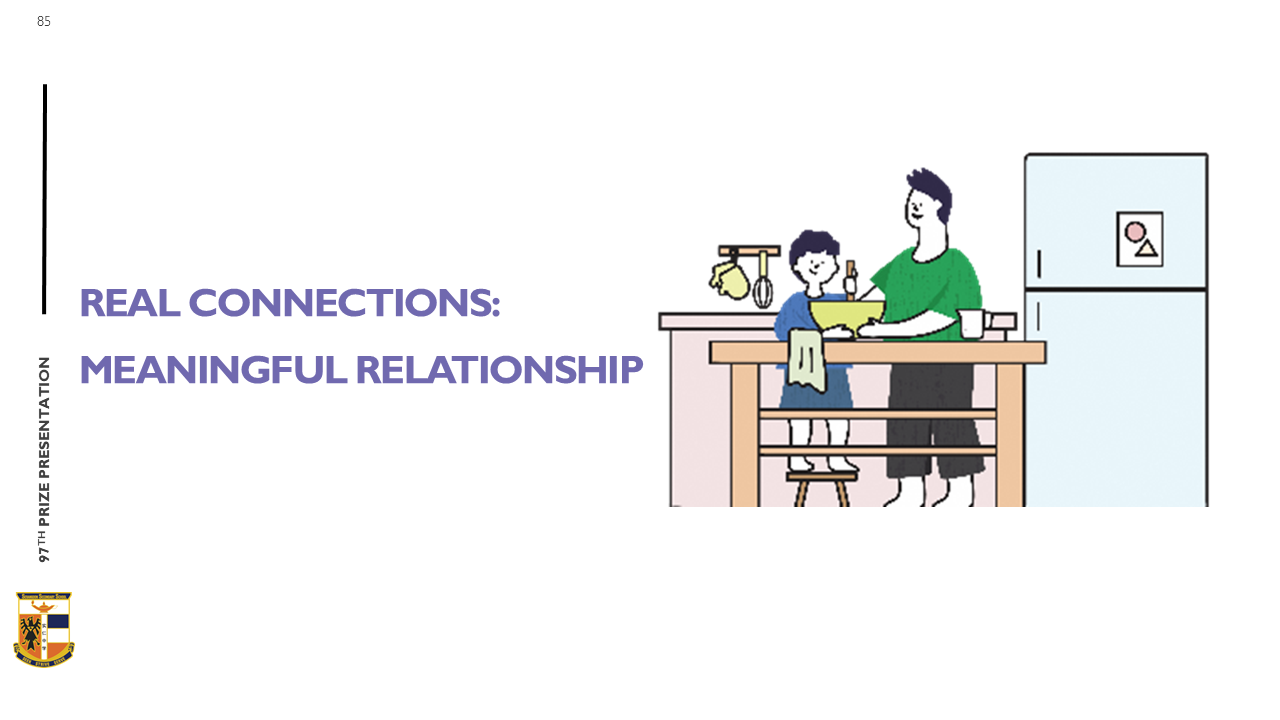
69 - Third, we emphasise building Real Connections in this increasingly digital world.
Para 69A: Meaningful relationships
We recognise that meaningful relationships are built through shared experiences and genuine conversations, both online and offline. At school, we create opportunities for face-to-face interactions through collaborative projects, group discussions, and community activities. We’re also mindful of helping our students develop healthy habits in using technology. This means teaching them to use digital tools effectively while maintaining control over their screen time.
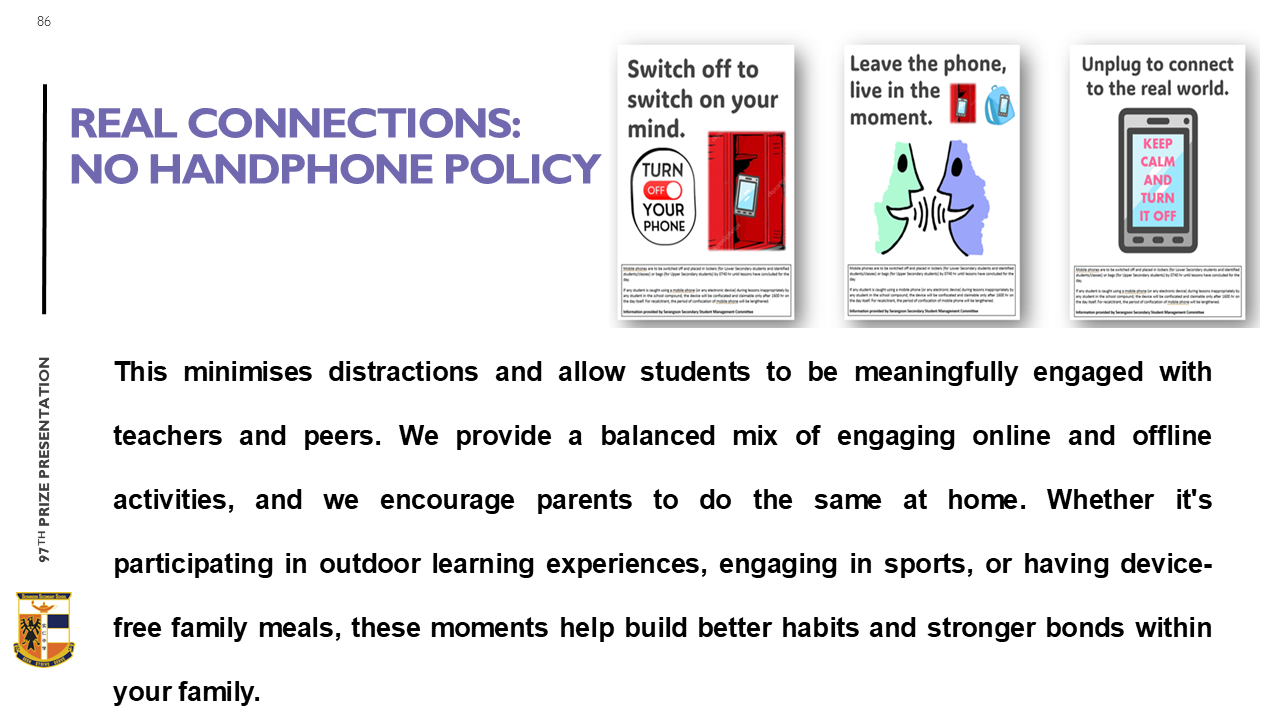
Para 69B: No handphone policy
The school has deliberately and progressively implemented a no-handphone policy during curriculum hours, first introducing it to lower secondary levels with successful implementation supported by staff and consistent rationalisation with students. Following this success, the policy was extended to upper secondary levels as well.
The following will be captured in the slide:
This minimises distractions and allow students to be meaningfully engaged with teachers and peers. We provide a balanced mix of engaging online and offline activities, and we encourage parents to do the same at home. Whether it’s participating in outdoor learning experiences, engaging in sports, or having device-free family meals, these moments help build better habits and stronger bonds within your family.
70 - Looking ahead, we’re committed to strengthening these partnerships further. We’re exploring new ways for more meaningful parent engagement, providing more opportunities for greater parent child bonding opportunities and supporting families in navigating the digital landscape. (not verbalised)
71 - To our parents - your partnership is invaluable. When we work together, we invariably create an environment where every child can flourish.
I. Close
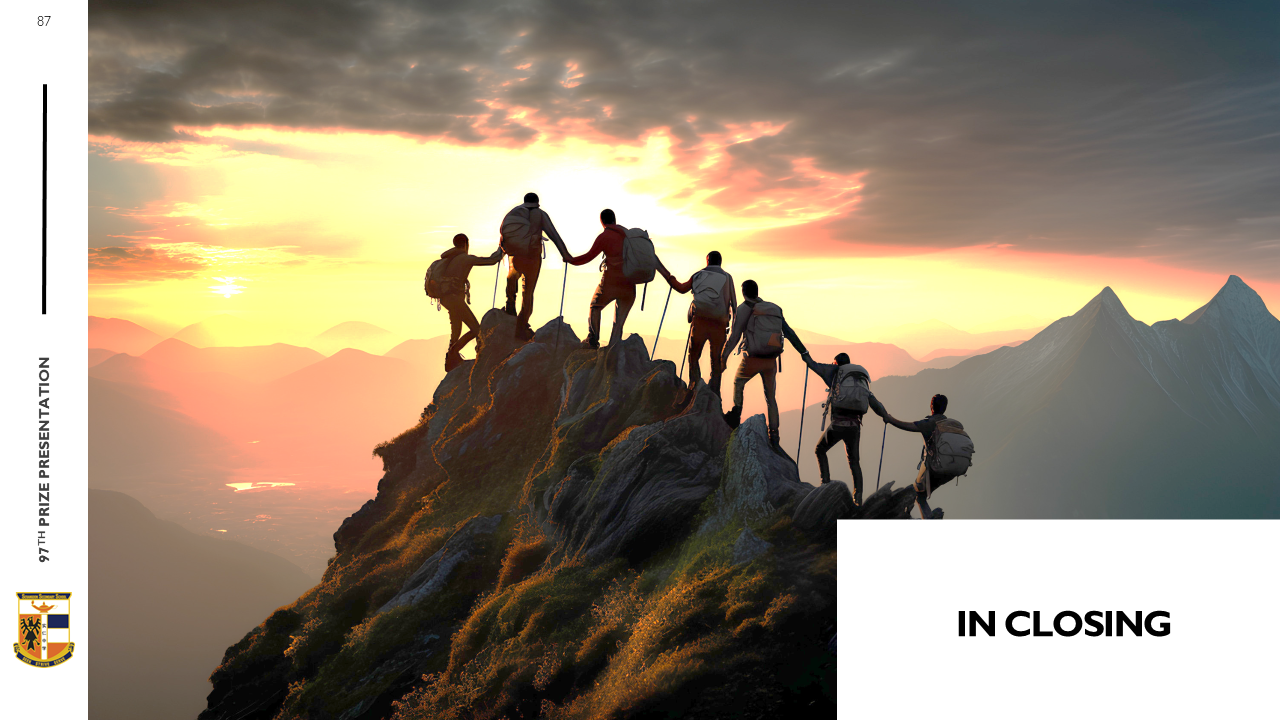
72 - In closing, it is my hope that today’s Prize Presentation Day be a celebration of all that our StaRs have accomplished and all that they aspire to become.
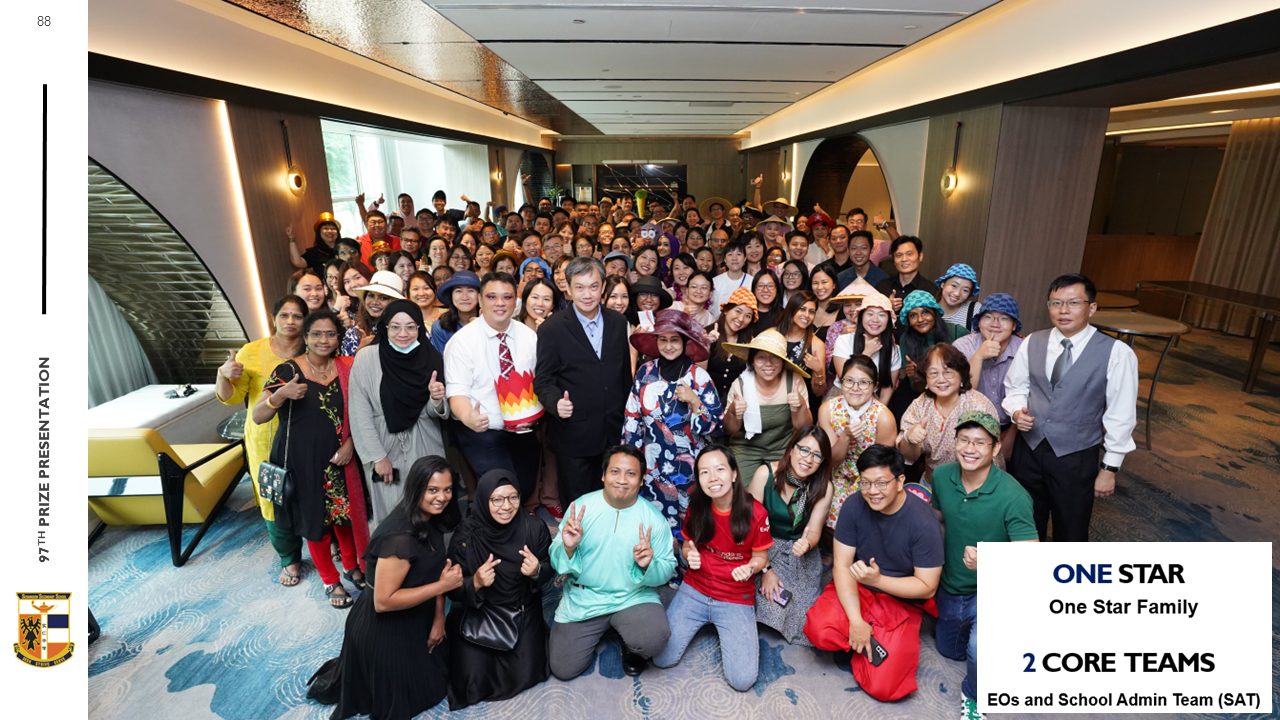
73 - At the heart of our school community is our One StaR Family. As a One StaR Family, we work hard together to make Serangoon Secondary a whole greater than the sum of its parts. The bonds we share are not just valuable; they are the very essence of who we are and what we strive to achieve together as a school.
74 - From this nucleus, we have our 2 Core Teams. These are our Education Officers, and our School Admin Team. Together, our school’s 2 Core Teams serve as the backbone of our school.
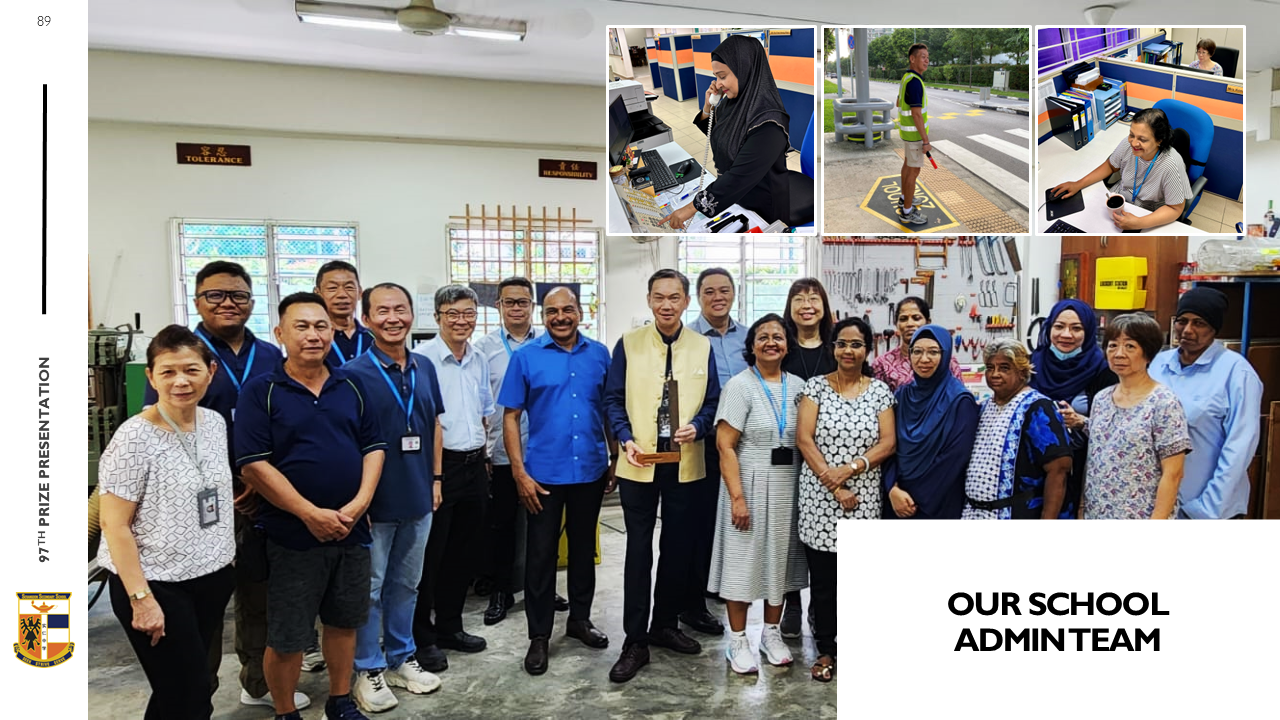
75 - Our School Admin Team is the heartbeat of our administrative operations, providing essential support, guidance, and expertise that keep our school running smoothly day in and day out.
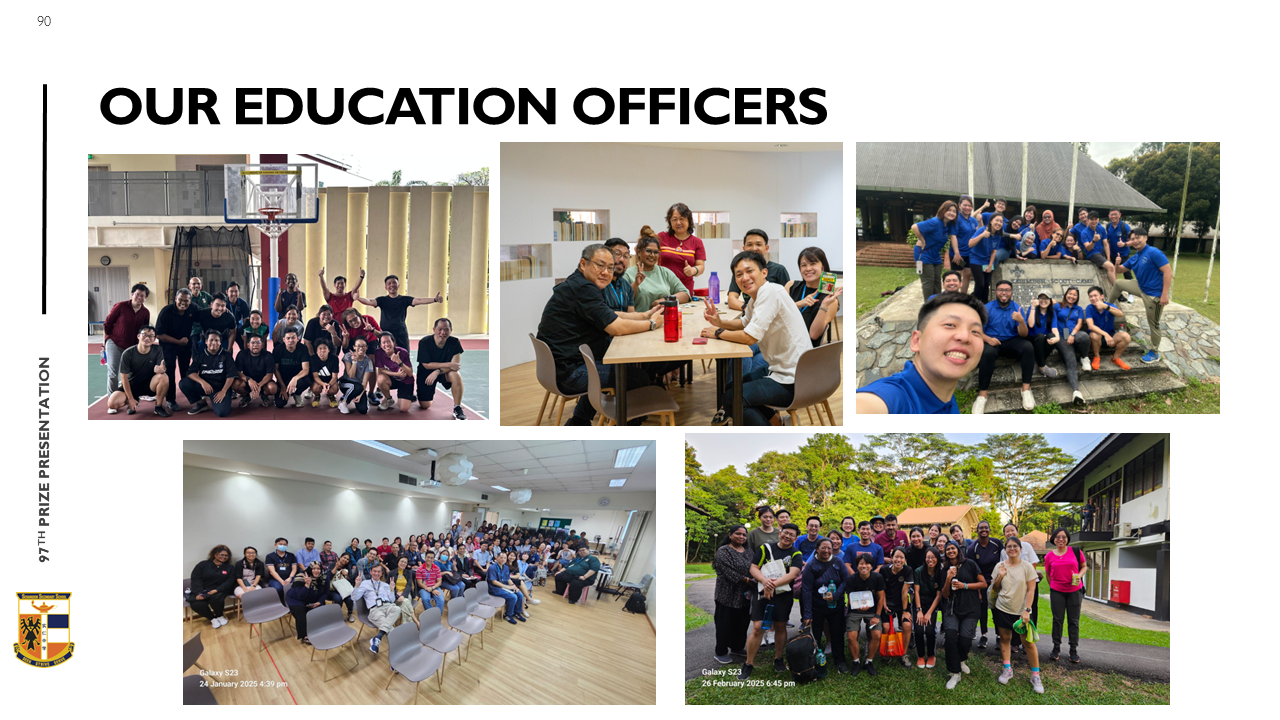
76 - Our Education Officers are our unsung heroes who work hard behind the scenes and in the forefront every day to enable us to fulfil our core business as a school, that is to deliver a high-quality education to every student.
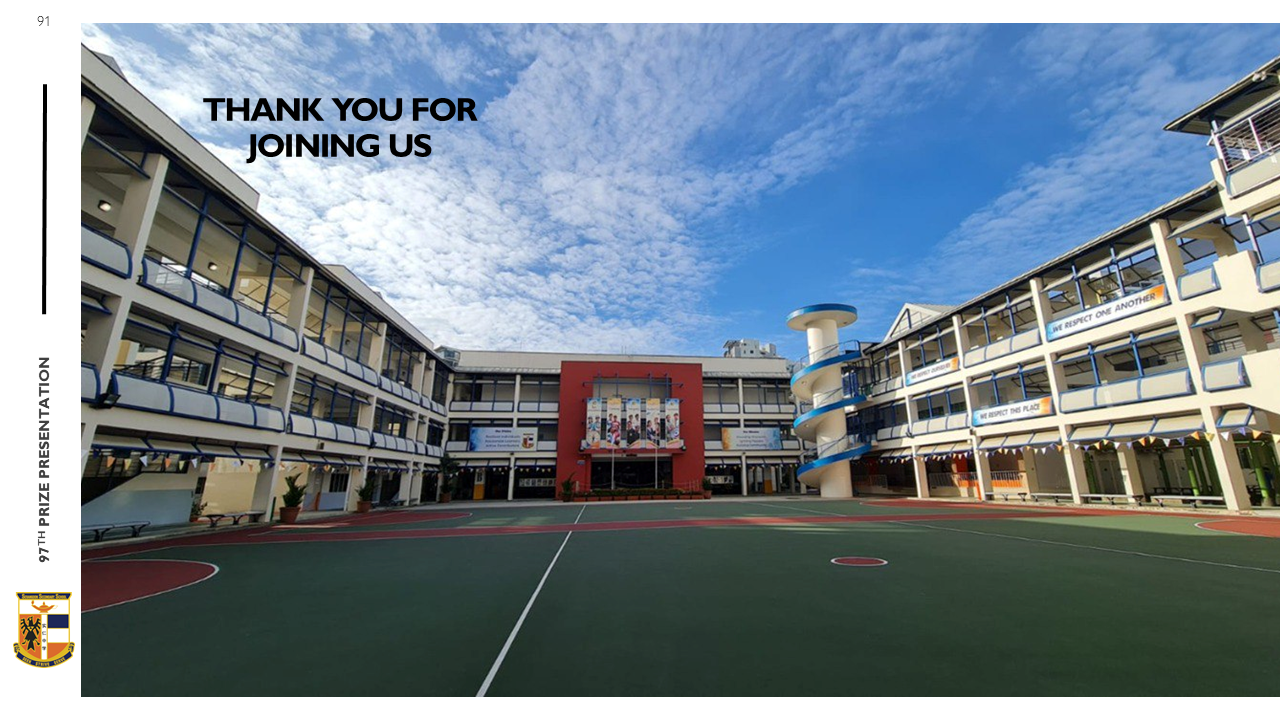
77 - I would like to thank the core planning committee led by VP Mrs Wong, VP Mr Marc, VPA/Mr Raja, HOD/Maths Poh Ling and the entire school team for their hard work and perseverance, without which this 97th Prize Presentation Day would not have been possible.
78 - Thank you for your presence today.
Mr Chen Fook Pang
Principal
25 April 2025
Click here for the Principal’s archived messages.
GOH Speech for Serangoon Secondary School’s 97th PPD (2025)
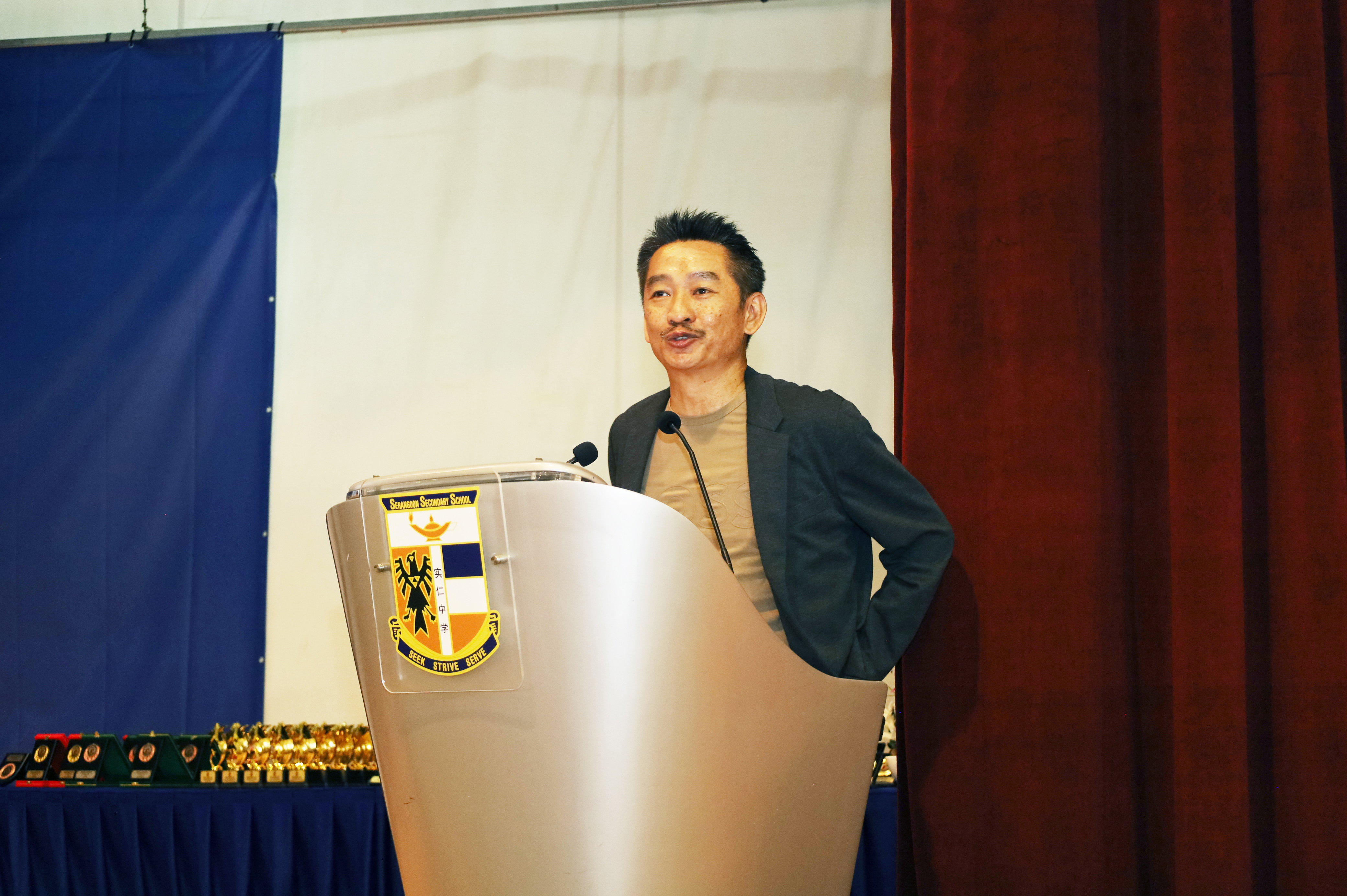
2025 Serangoon Secondary School 97th Prize Presentation Day Guest-of-Honour Speech by Mr Andy Ng
Good morning Principal, teachers, parents, community partners – and most importantly, the amazing students of Serangoon Secondary School – the Serangoon StaRs!
It’s a real honour to be here today – not just to celebrate your achievements, but to come back to the very school that shaped me in more ways than I expected.
I graduated from Serangoon Secondary in 1992. Back then, the uniform looked different, the canteen food was cheaper, and the only AI we knew was “aiyah!” when we forgot our homework.
If I’m being honest… I wasn’t what you’d call a top student. I have dyslexia – and back then, not many people understood what that meant. I struggled to keep up. I stared at English papers feeling lost, and I failed more than once – in tests, in confidence, even in friendships.
But through those struggles, I learned something powerful: how to figure things out in my own way. I had to find my rhythm, ask for help, try again – and again. That mindset didn’t just help me survive school – it helped me become who I am today: an entrepreneur, problem solver, and yes – still a lifelong learner.
So today, I want to share three things I wish someone told me when I was in your shoes. Three ideas that I hope you carry with you long after the certificates are framed and the refreshments are gone.
1 - LEARN HOW TO LEARN
It’s not just about what you score – it’s about how you grow. Back in school, I thought the smartest kids were the ones who always got full marks. But later, I realised the real superpower is this: the ability to learn how to learn – to pick up new skills, bounce back from mistakes, and keep improving.
Take someone like MrBeast – one of the biggest YouTubers in the world today. He didn’t just wake up one day and become famous. He spent years studying how YouTube works. He watched thousands of videos, analysed what made people click, tested different ideas, and learned from every failure. He didn’t stop learning just because he left school – he made learning his secret weapon.
That’s the mindset that matters. Whether you’re learning to code, trying out a new CCA, or just figuring out how to manage your time better – the ability to keep learning, even when it’s hard, will take you further than any single exam score.
2 - THE WORLD IS UNCERTAIN – But So Are All Adventures
We live in fast-changing times. Jobs are shifting. Technology is evolving faster than TikTok trends.
But here’s the good news: You don’t need to have everything figured out right now. What you do need is the ability to adapt, explore, and stay curious.
You’re already getting a taste of this through your Applied Learning and EdTech programmes. Drones, 3D printing, programming – that’s not science fiction. That’s you, getting future-ready. You’re learning to solve real-world problems, work in teams, and think on your feet.
And while not everything will go smoothly, remember: progress beats perfection. Every misstep is a lesson. Every challenge is a chance to grow. The future doesn’t belong to those who know all the answers. It belongs to those who keep learning new ones.
3 - DEFINE SUCCESS FOR YOURSELF
Success isn’t a one-size-fits-all formula.
Some of you might become doctors or engineers. Others might start businesses, work in the arts, or champion social causes. All are valid.
At Serangoon Secondary, you’re already learning what it means to lead, serve, and contribute. Your Community Youth Leadership programme, your VIA projects, your class, CCA, and level experiences – these aren’t just activities to fill a logbook. They’re shaping your character. They’re helping you discover what matters to you.
Define success in your own terms. Ask: What am I good at? What do I enjoy? What kind of impact do I want to make? Your purpose doesn’t have to look like anyone else’s – but it does need to mean something to you.
CLOSING THOUGHTS
So, Serangoon StaRs, as you look ahead to what’s next, I leave you with these three ideas:
- Learn How to Learn – Stay curious. Try. Fail. Try again.
- Embrace Uncertainty – Because that’s where the adventures are.
- Define Success for Yourself – Not by someone else’s standards, but by your own purpose and values.
- You have the support of your teachers, your families, your peers – and you have the potential to make a real difference.
Let me end with a quote from Maya Angelou: “Do the best you can until you know better. Then when you know better, do better.”
Keep learning. Keep growing. And above all – keep shining,
Thank you.
Mr Andy Ng
GOH, Member, School Advisory Committee
25 April 2025

